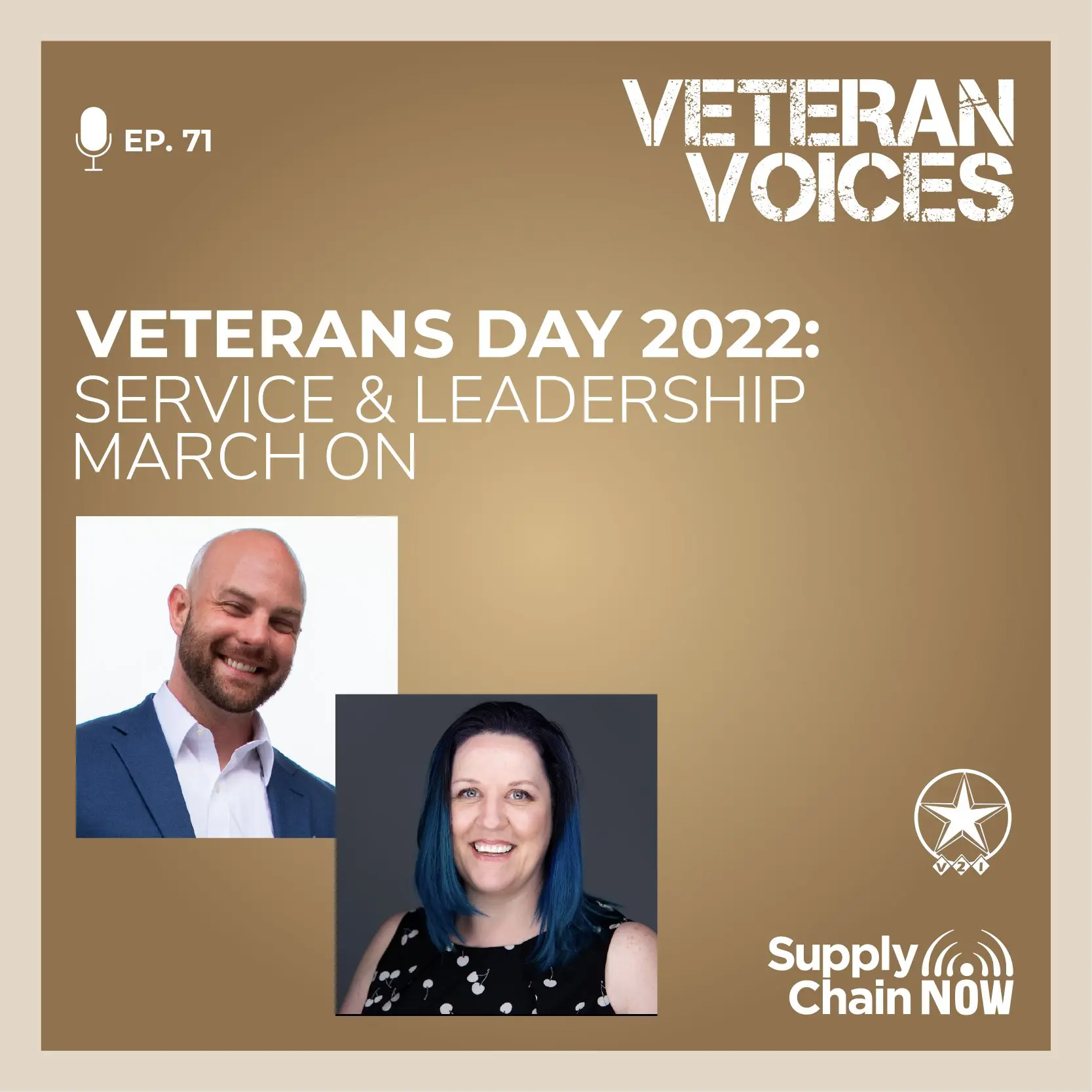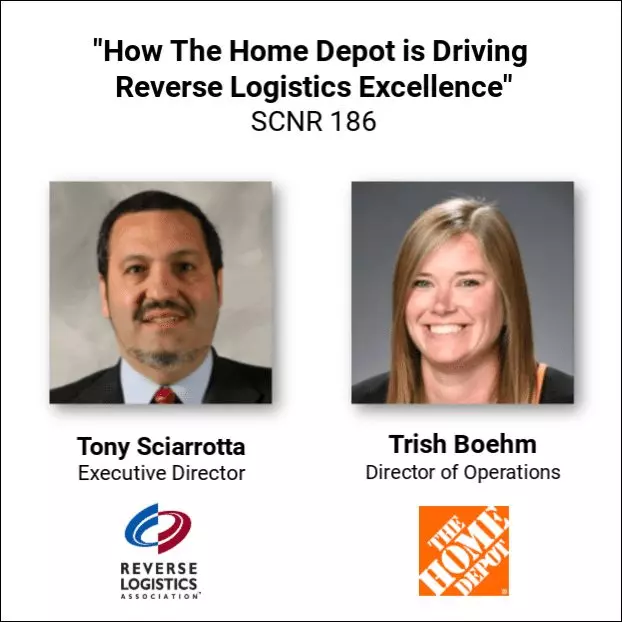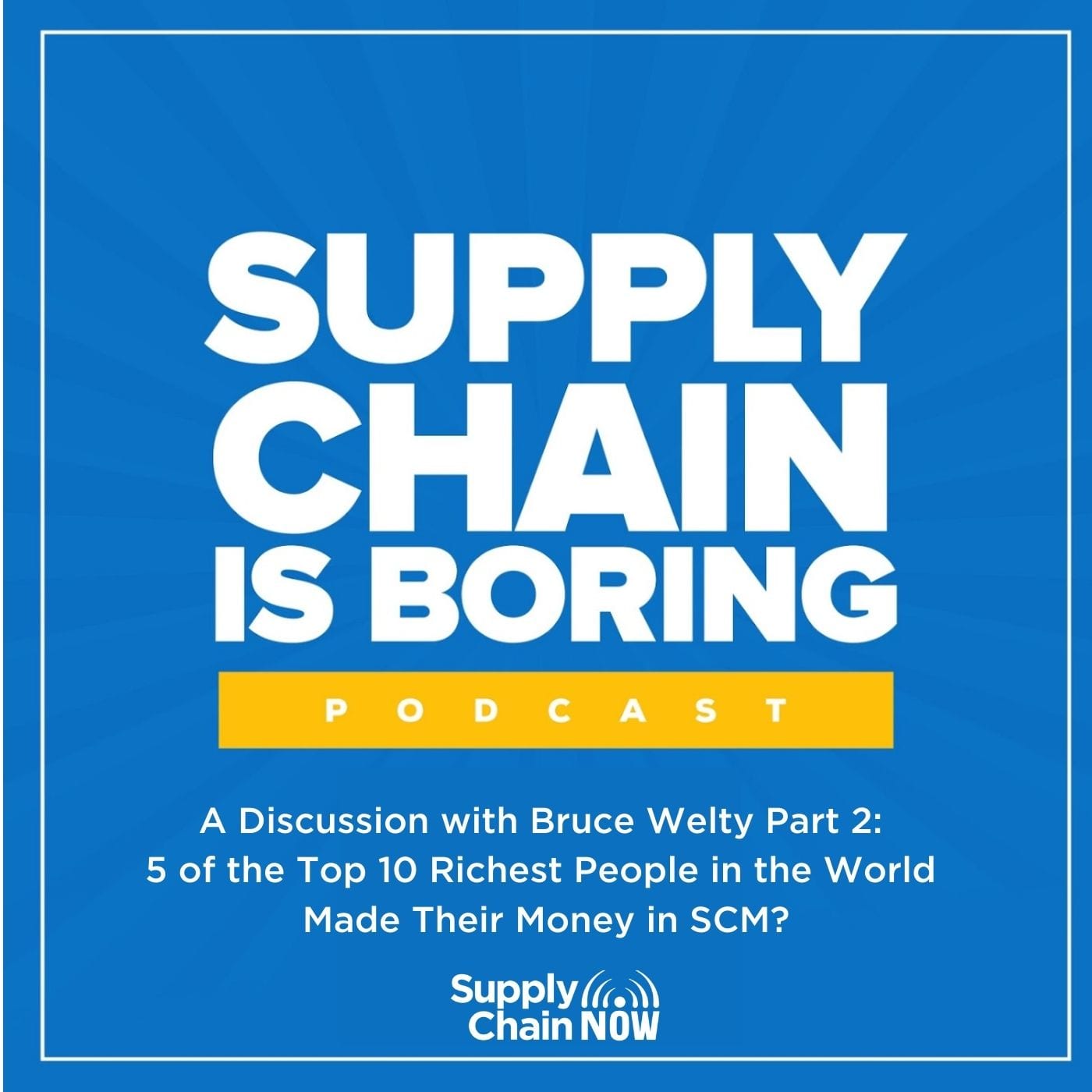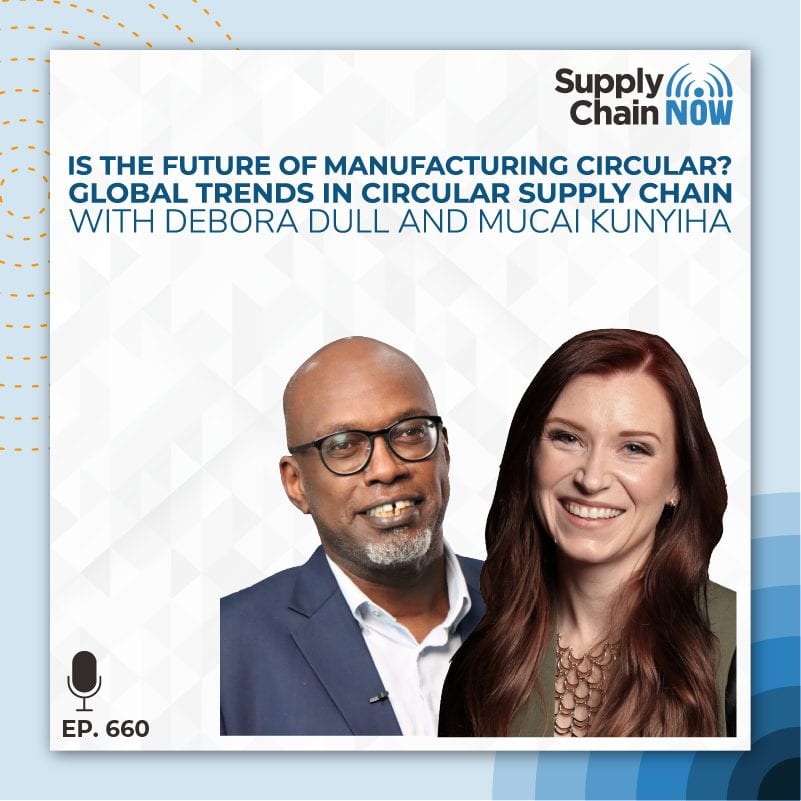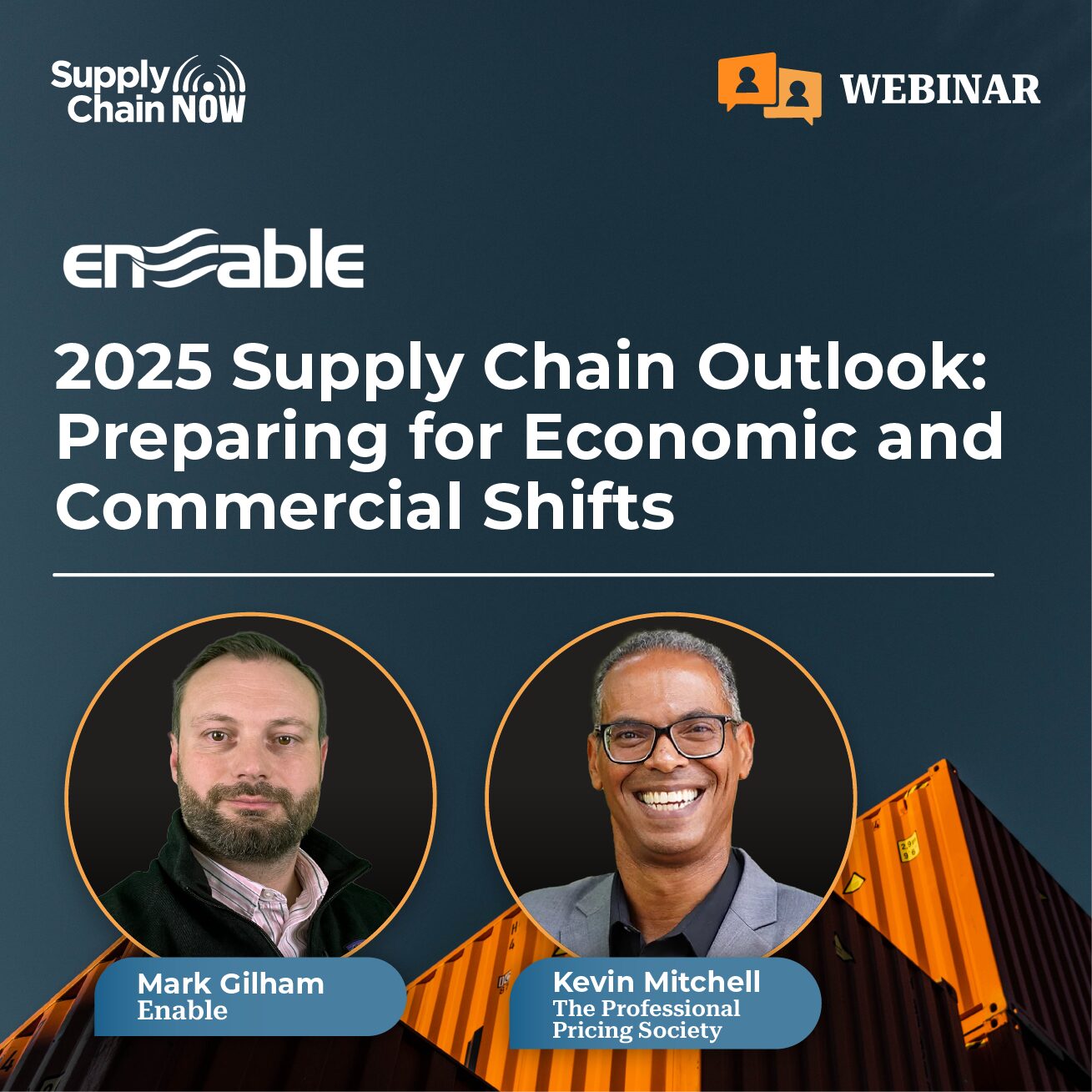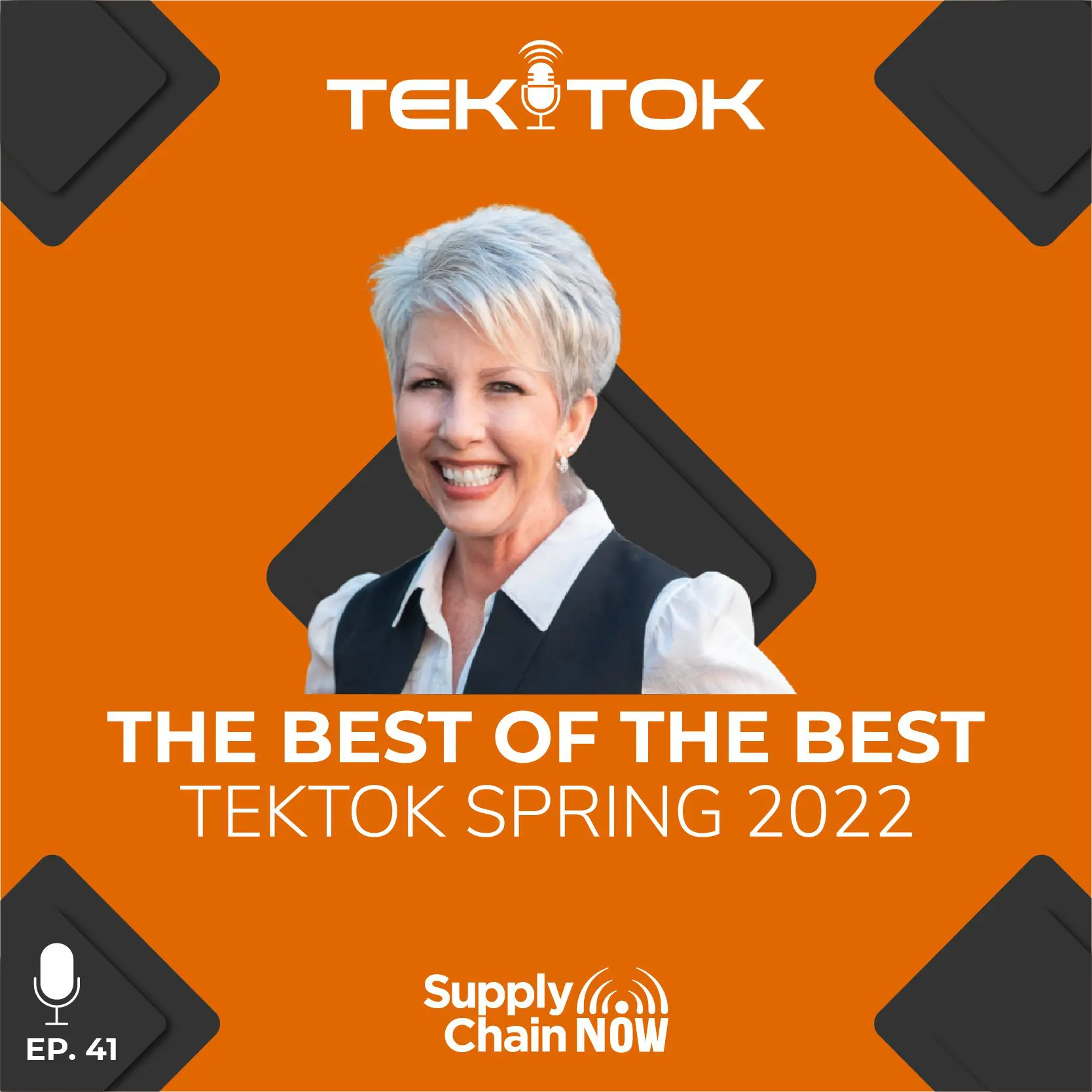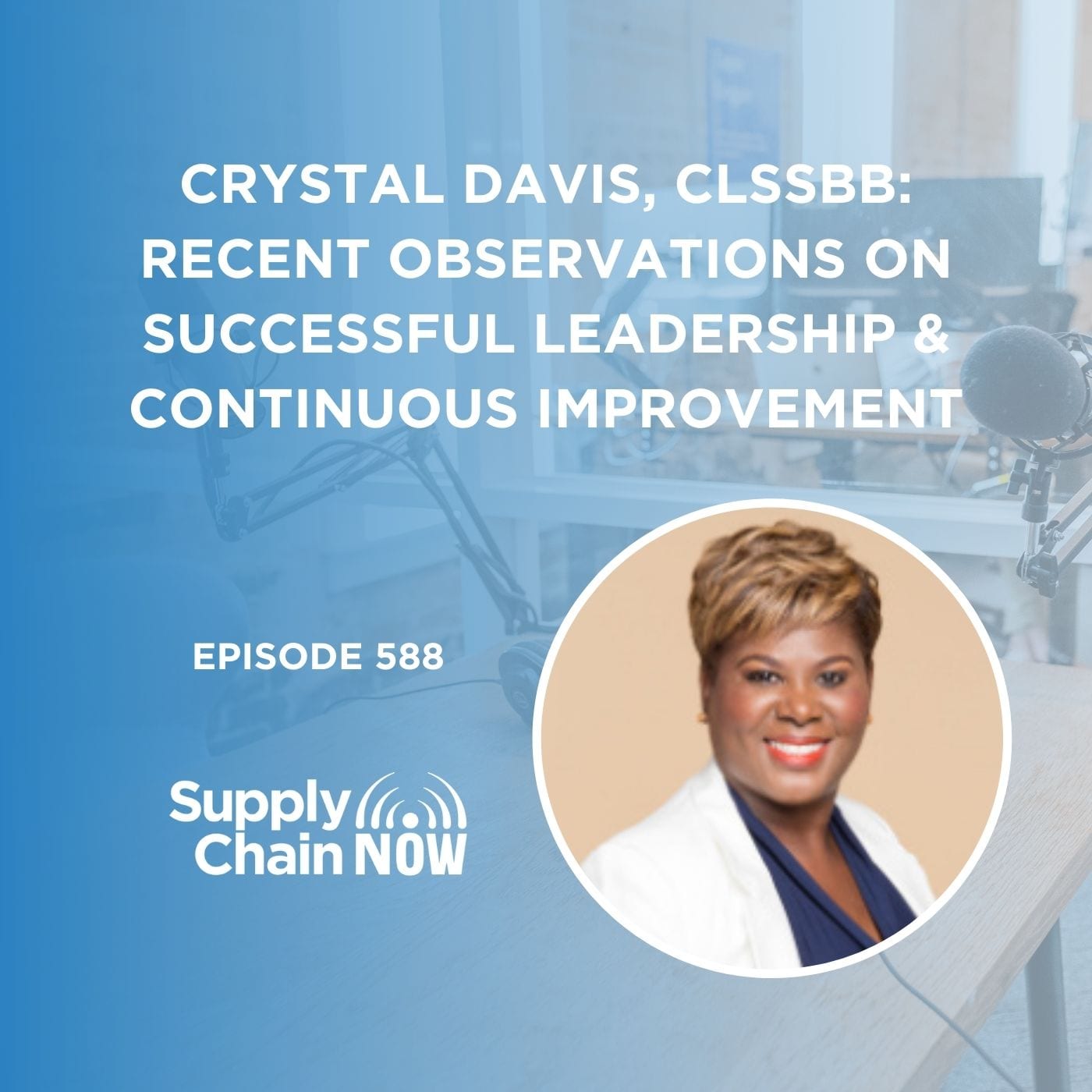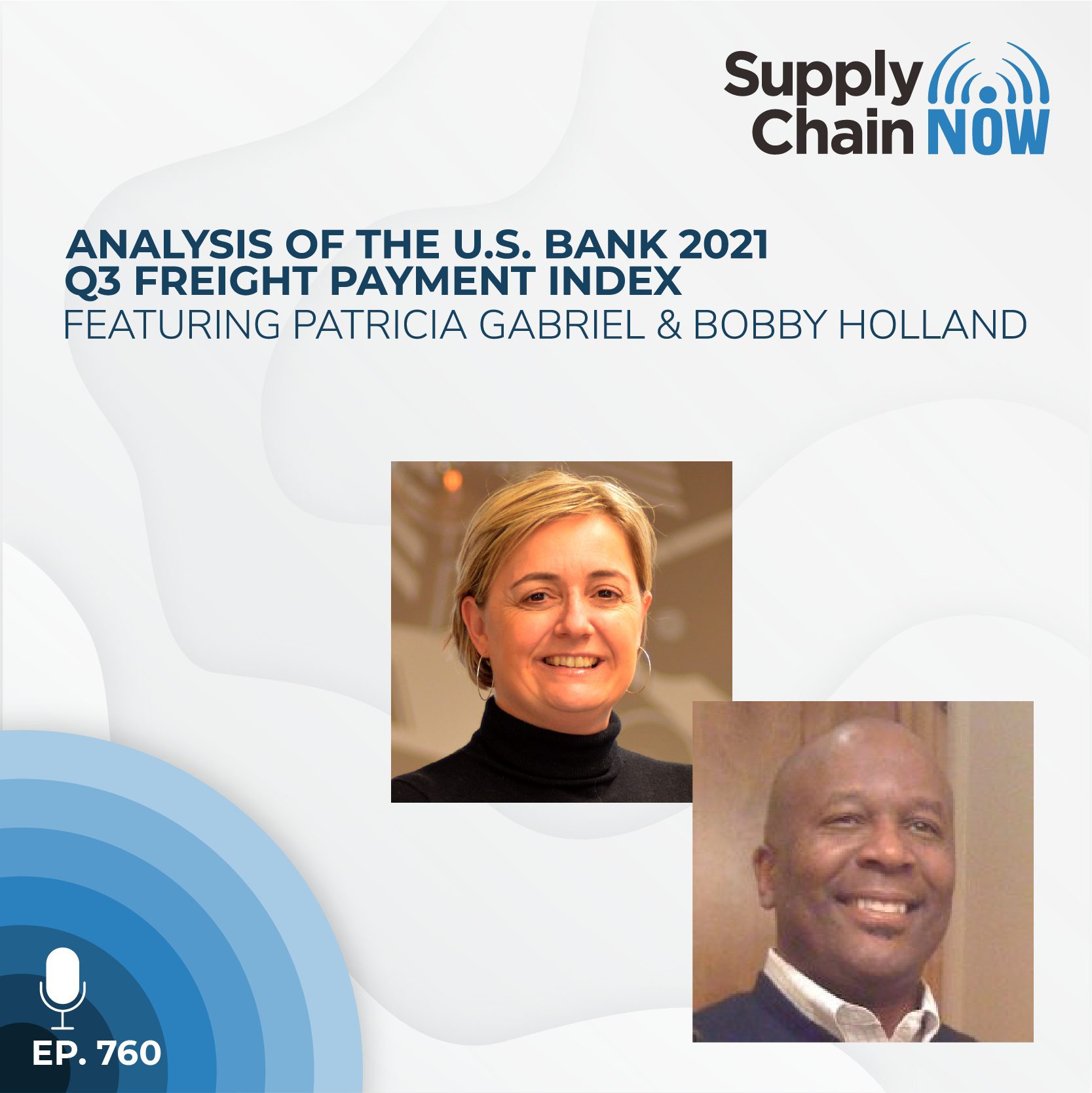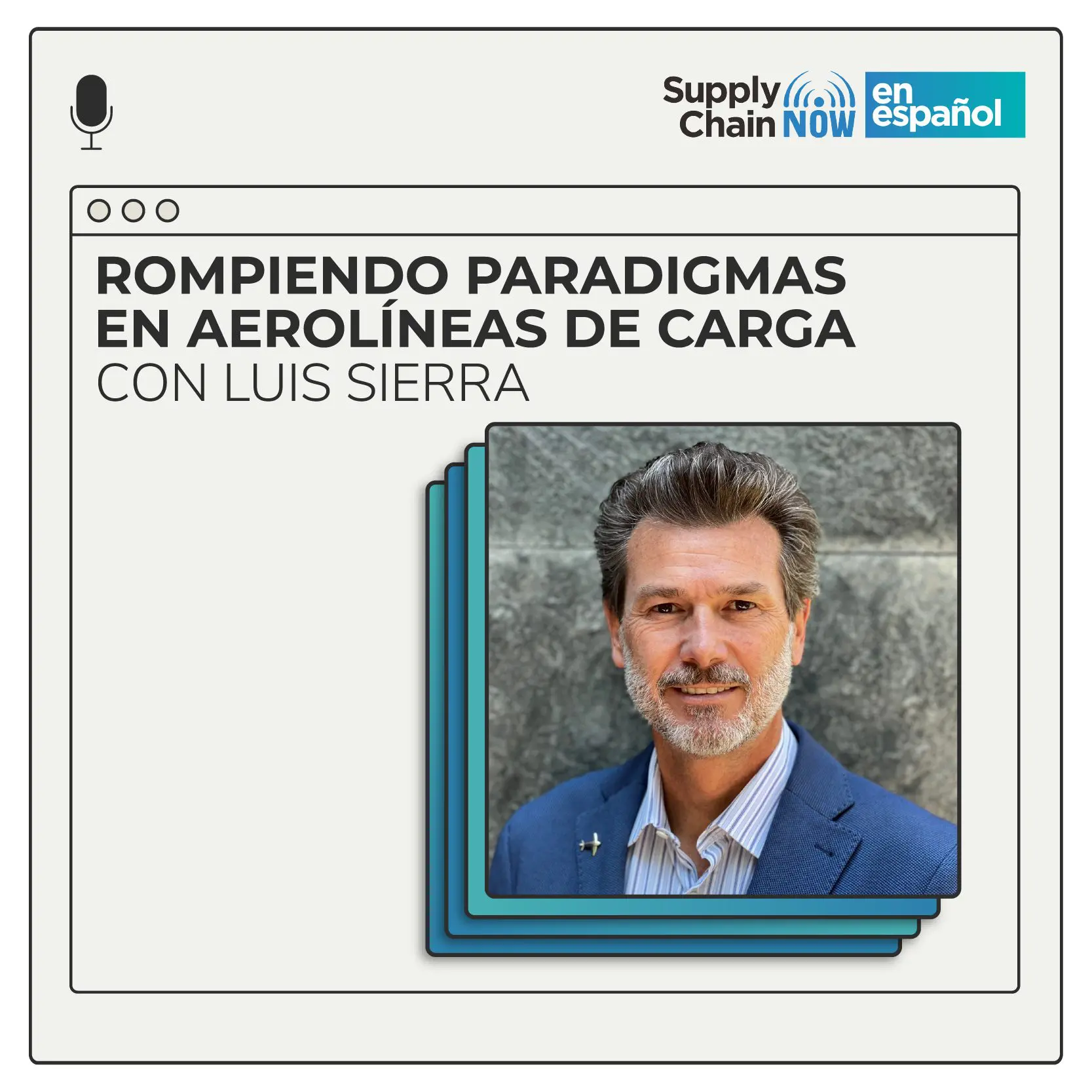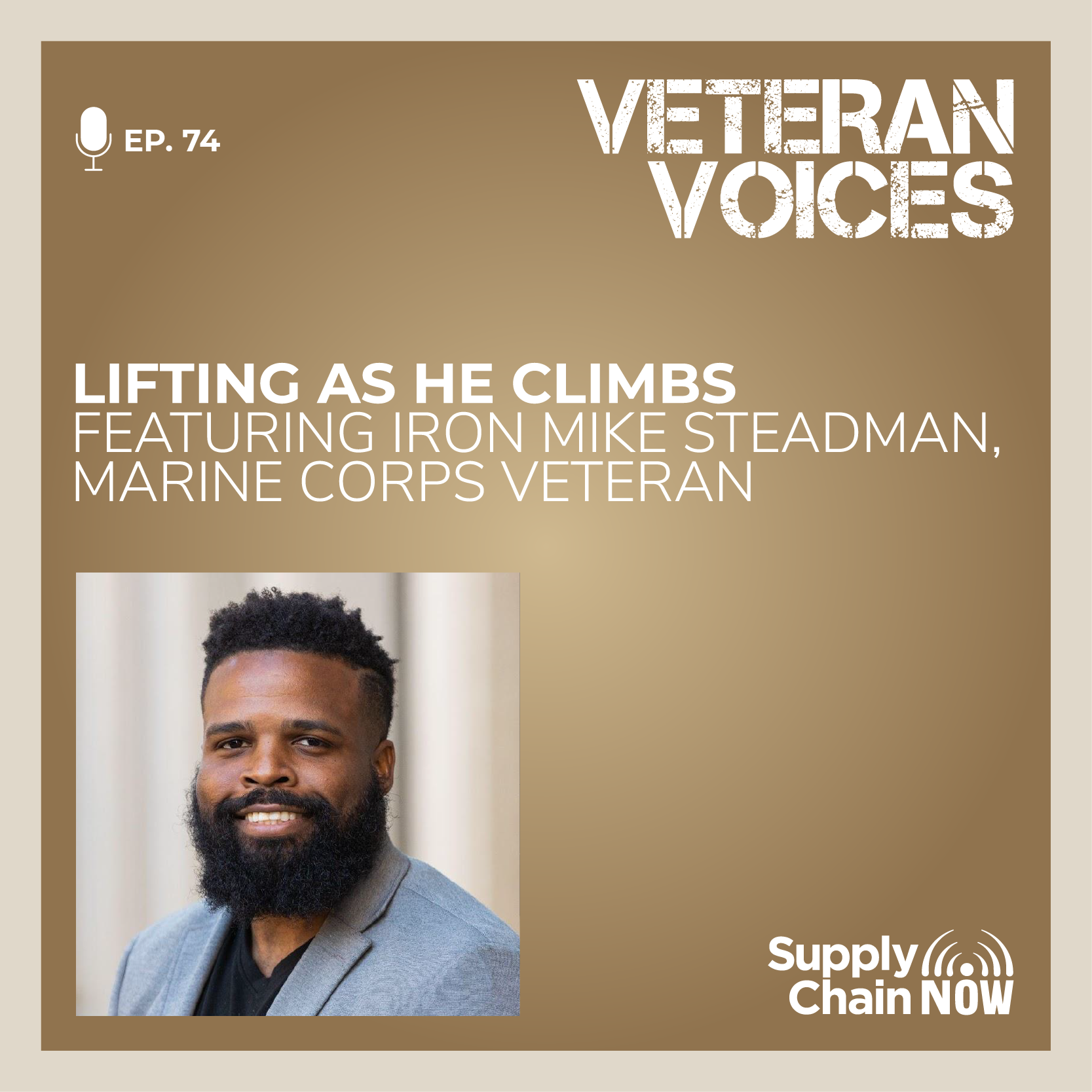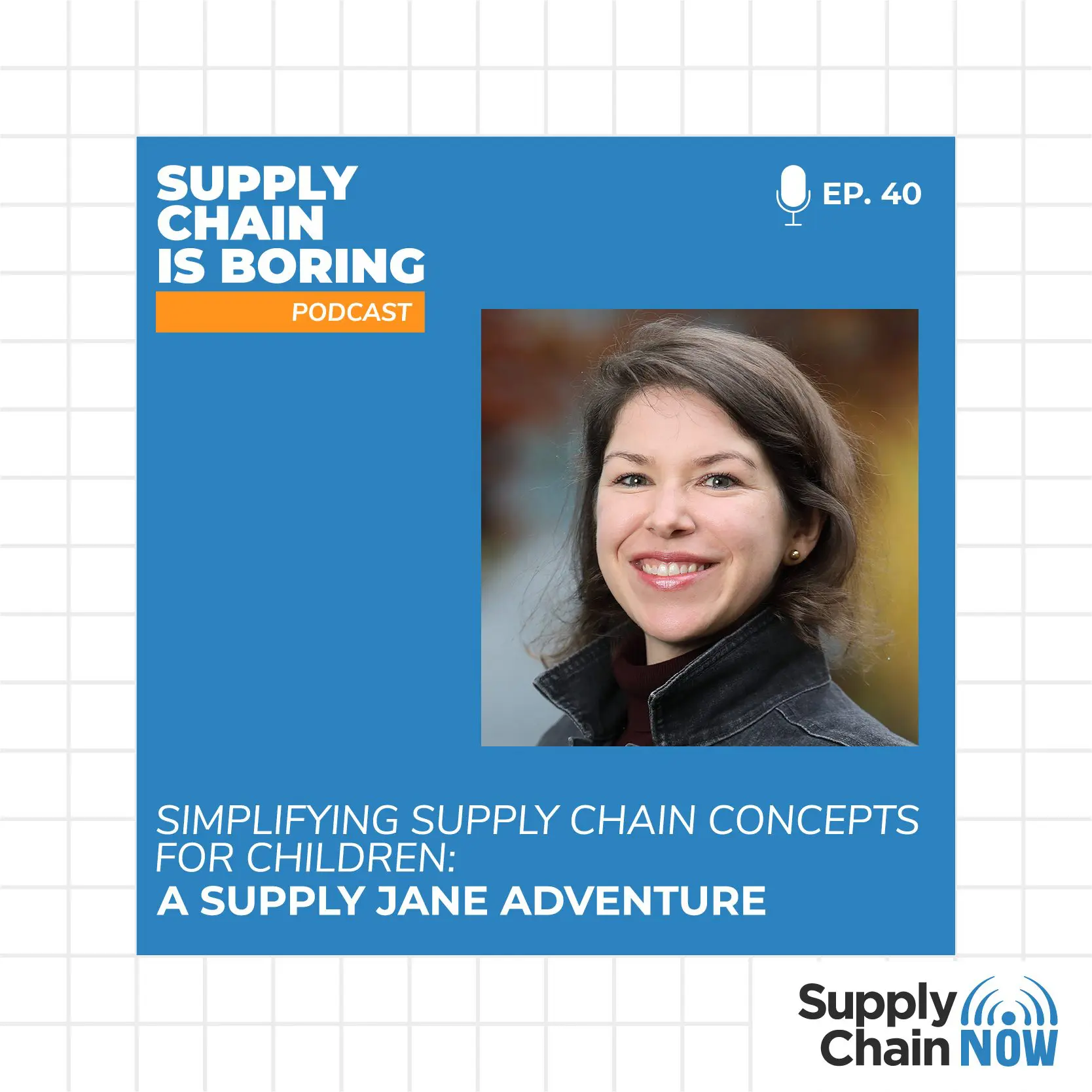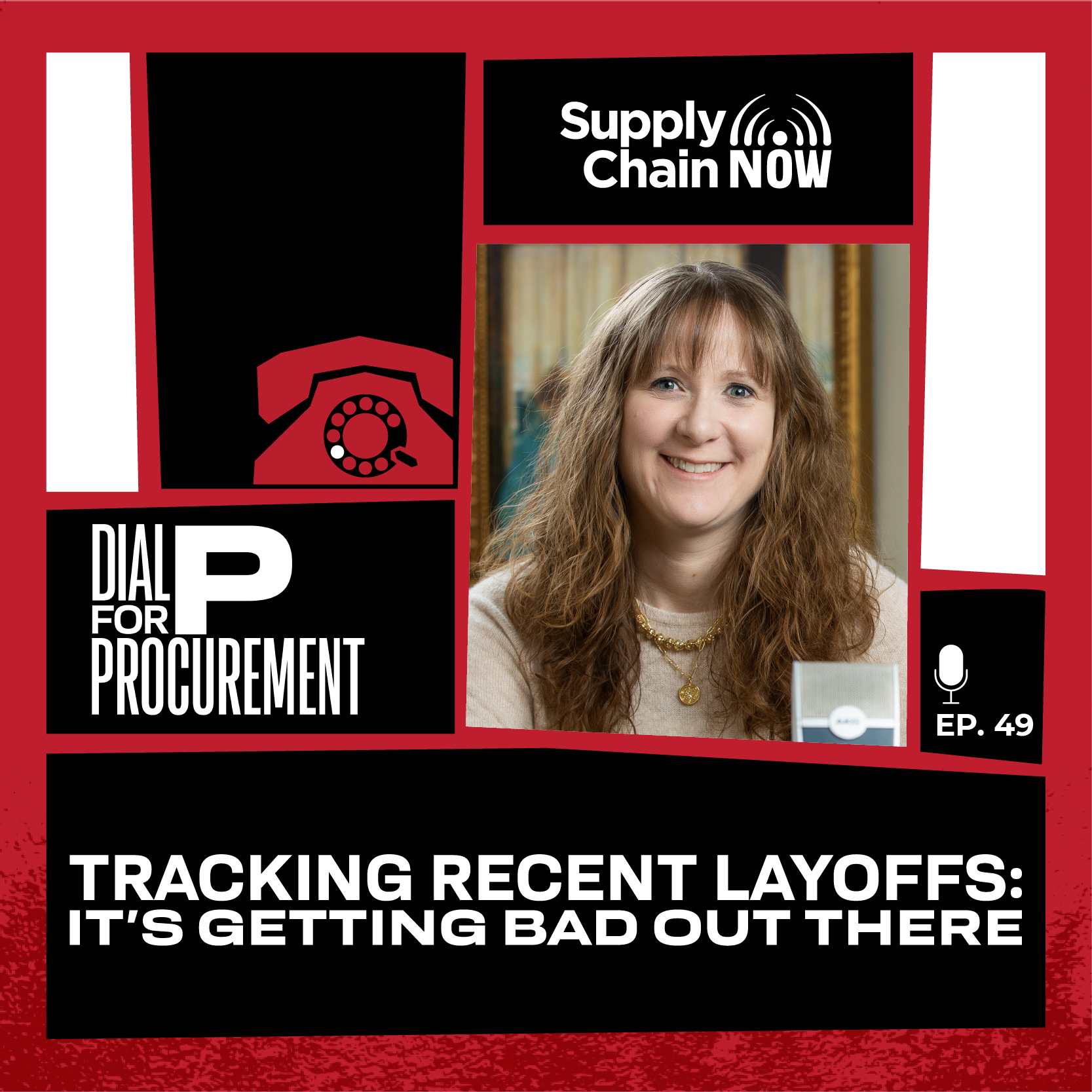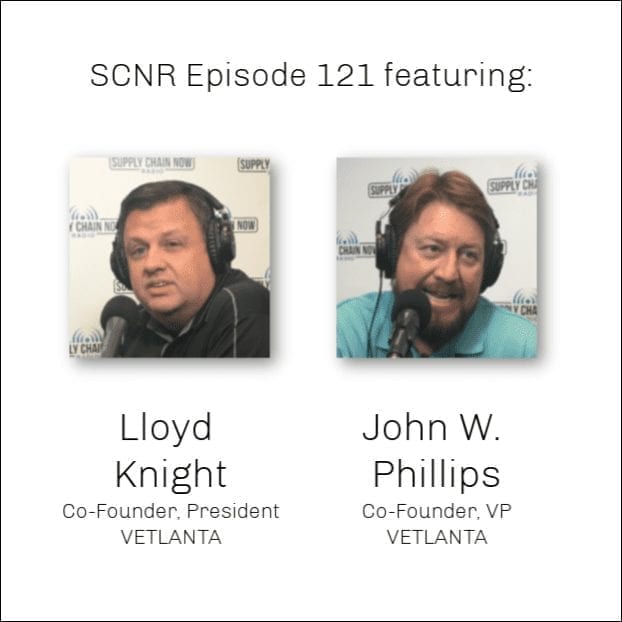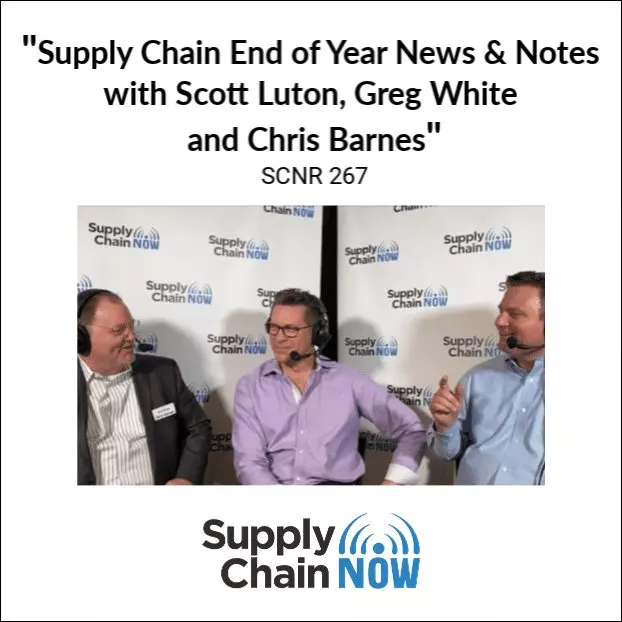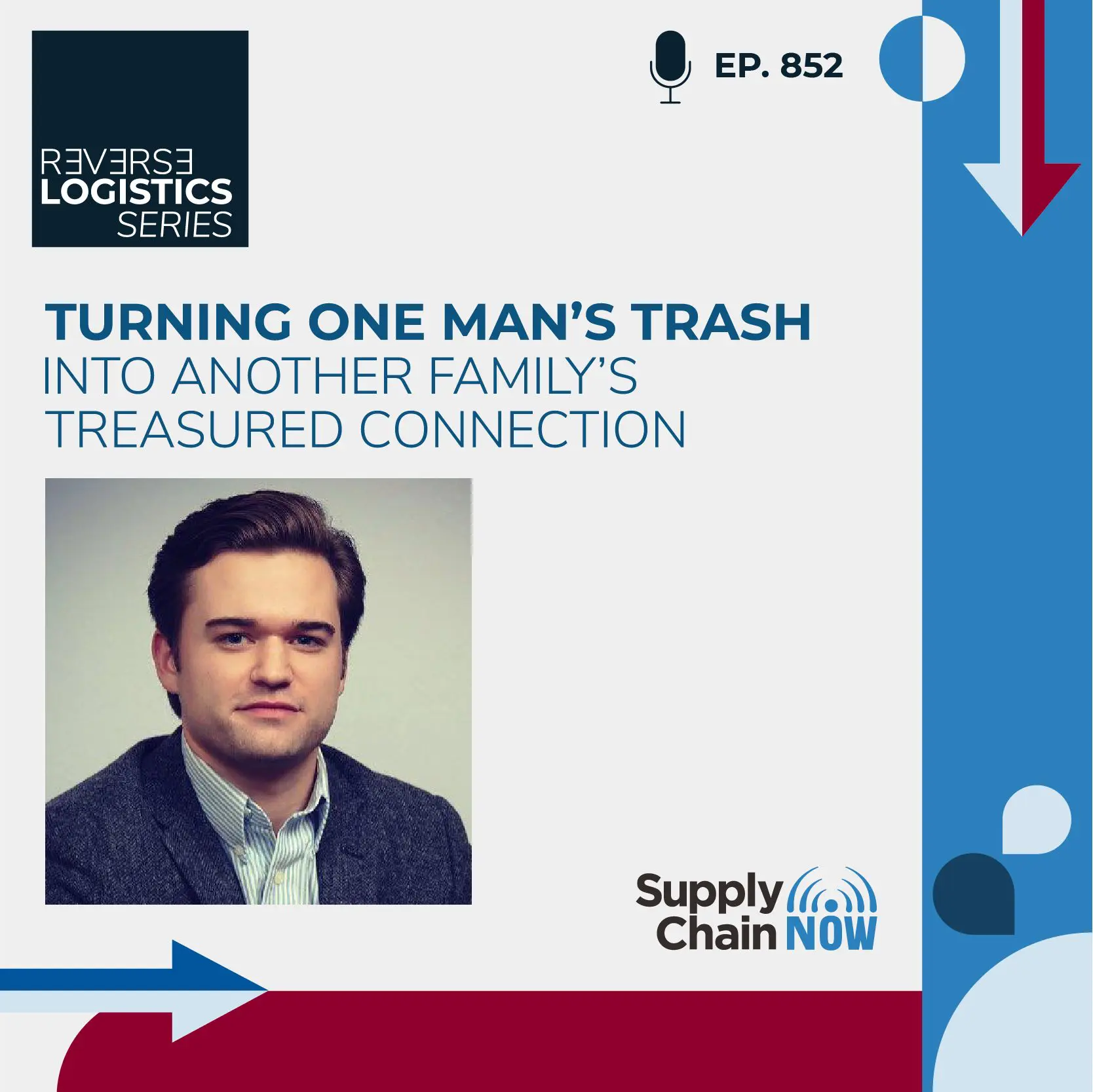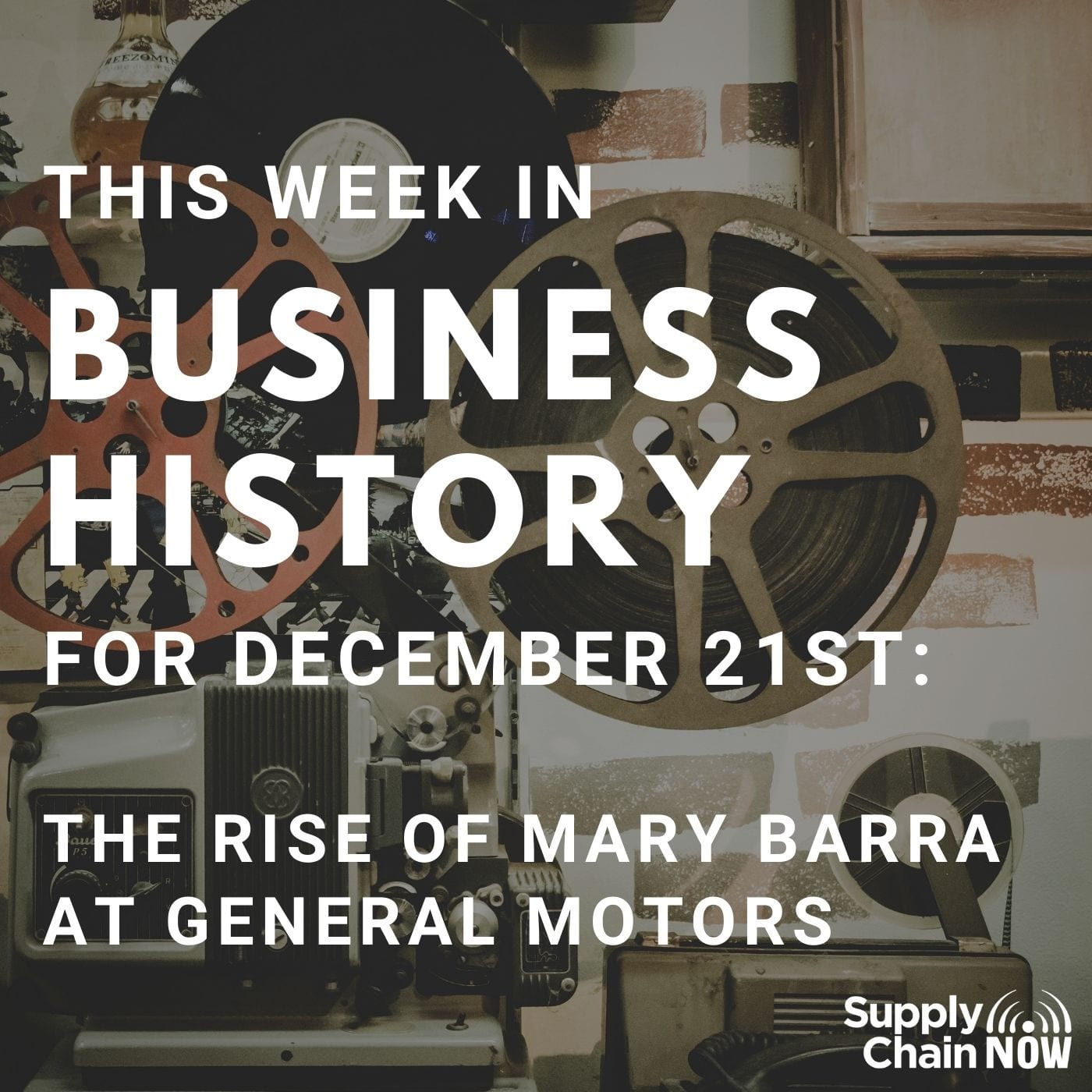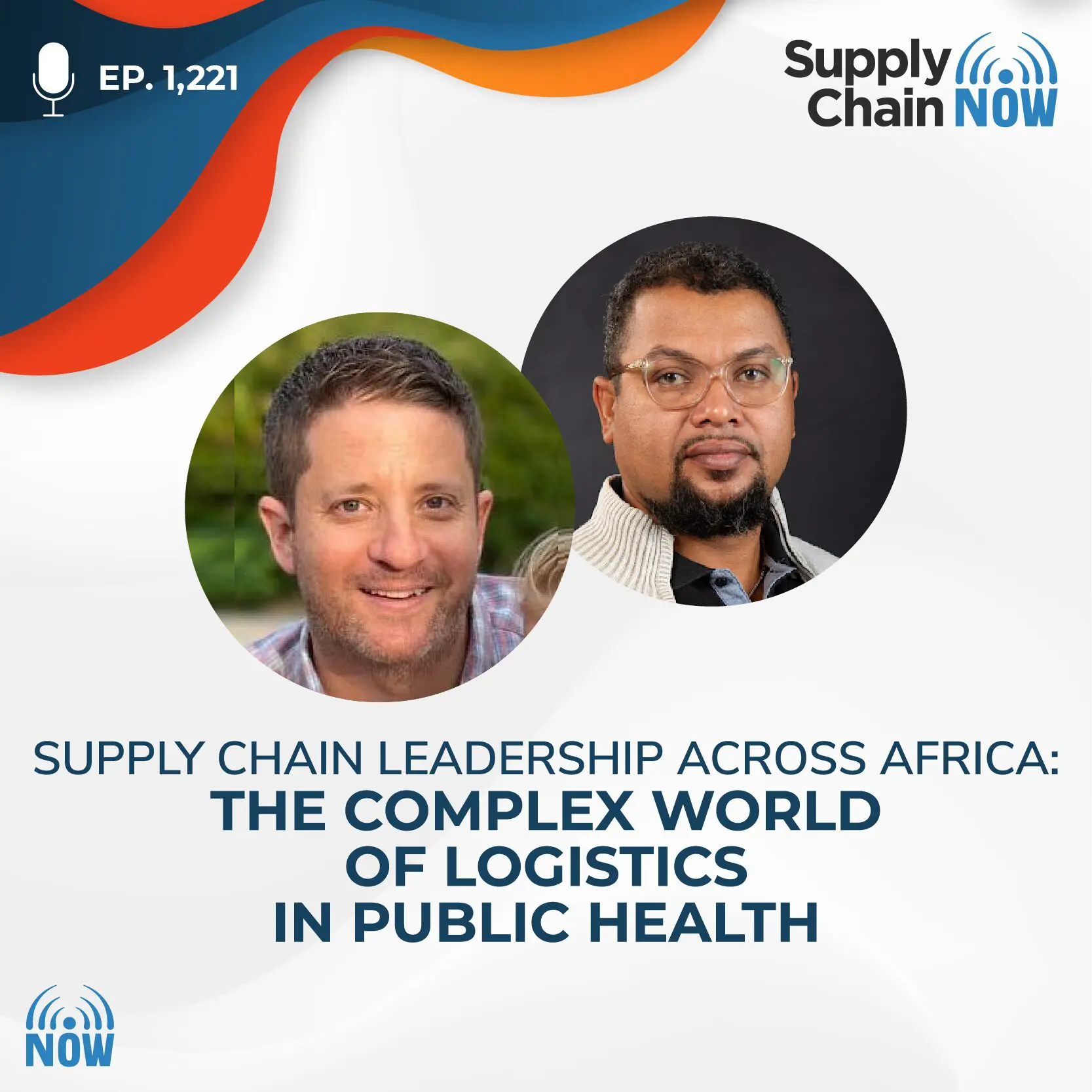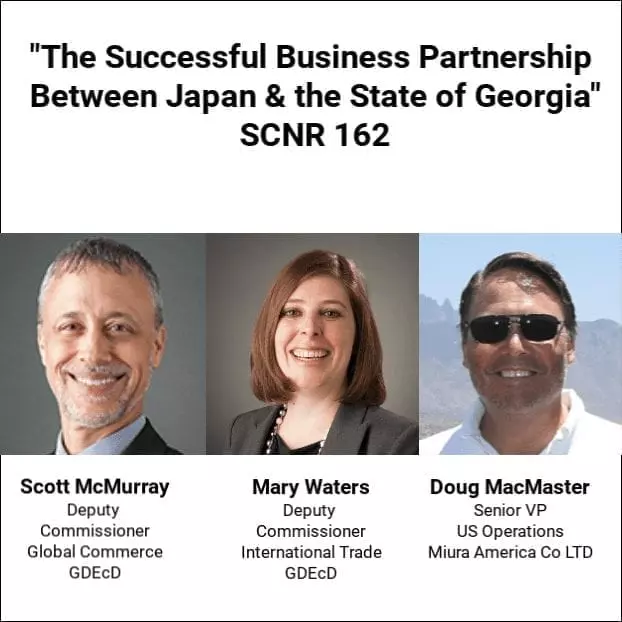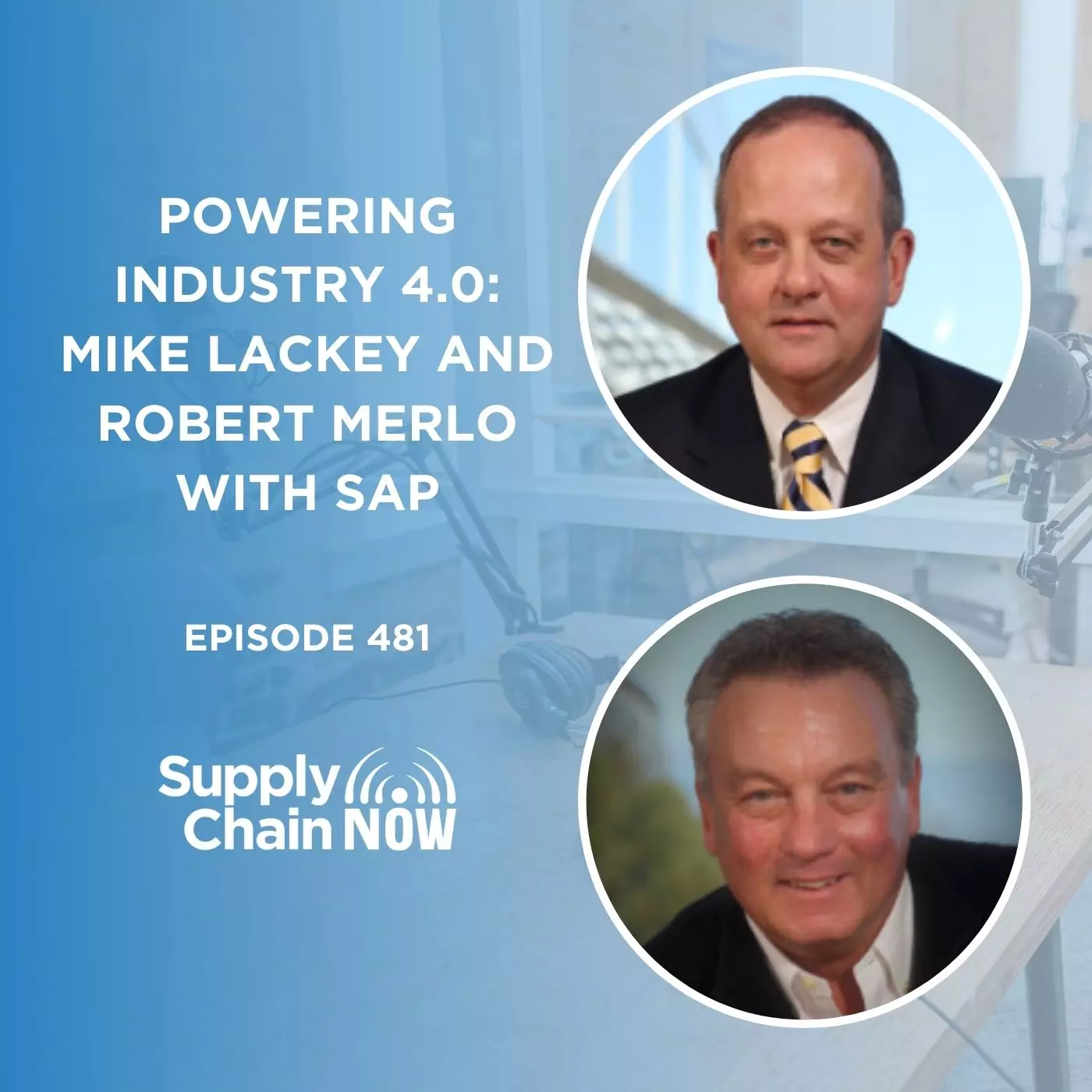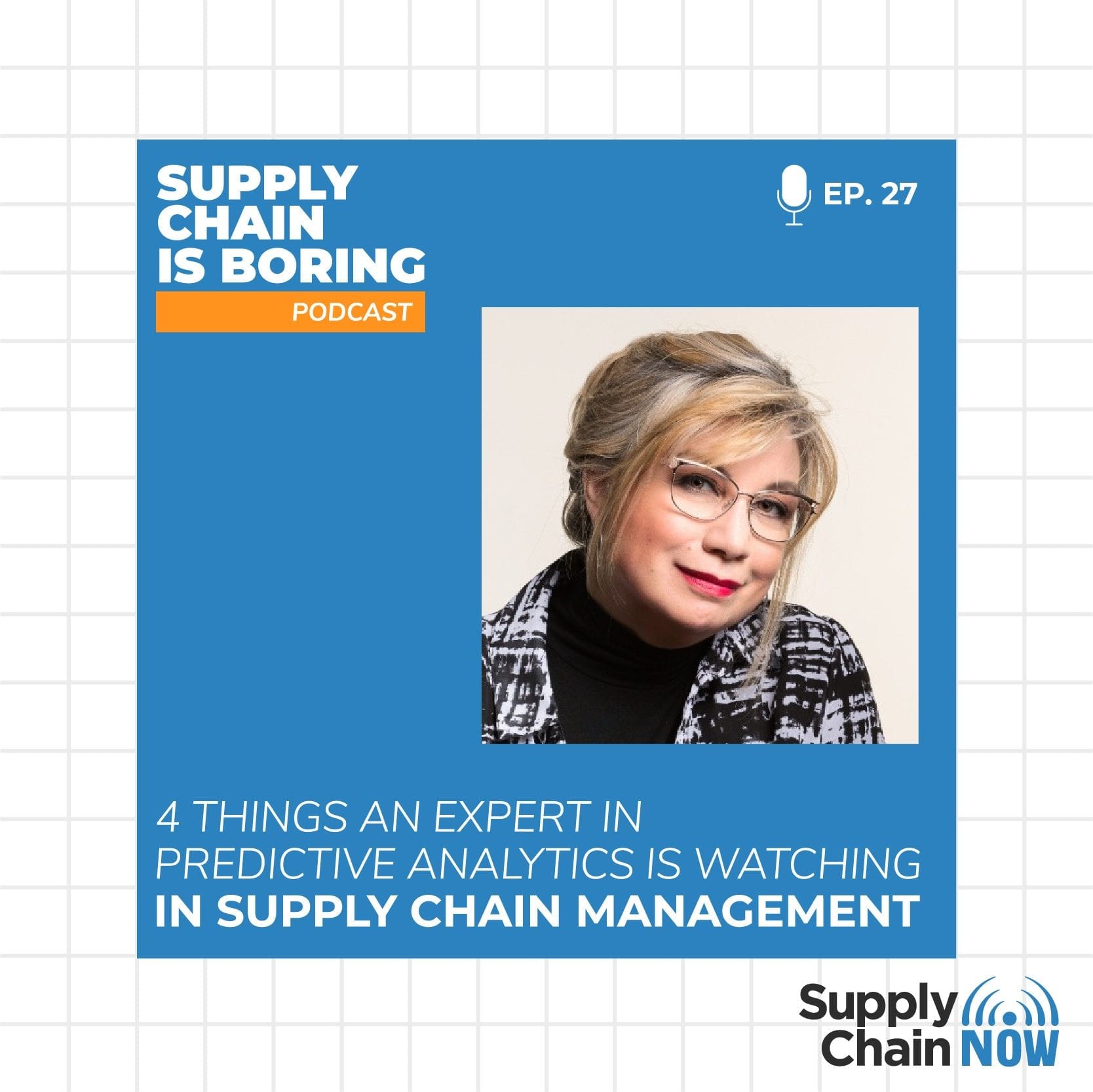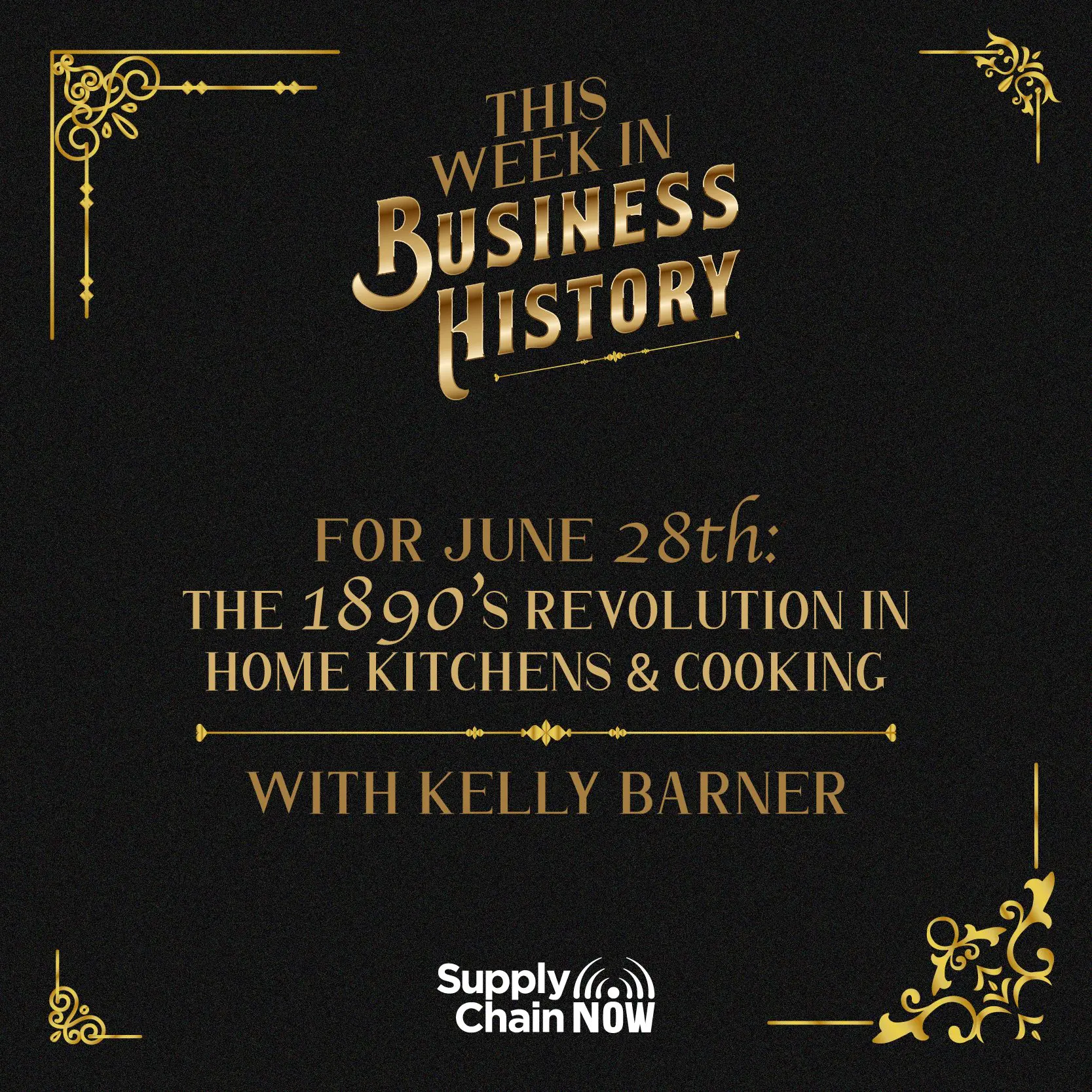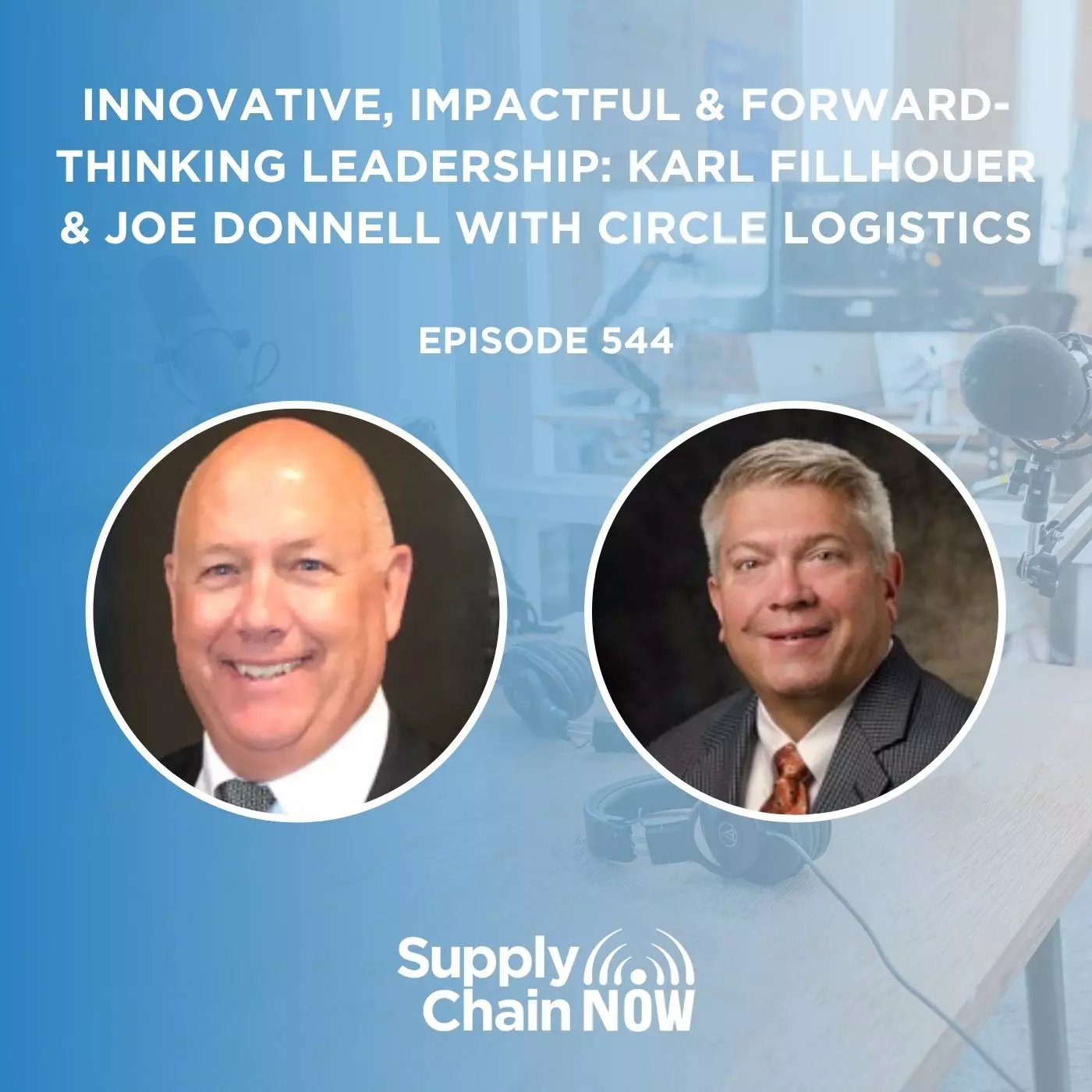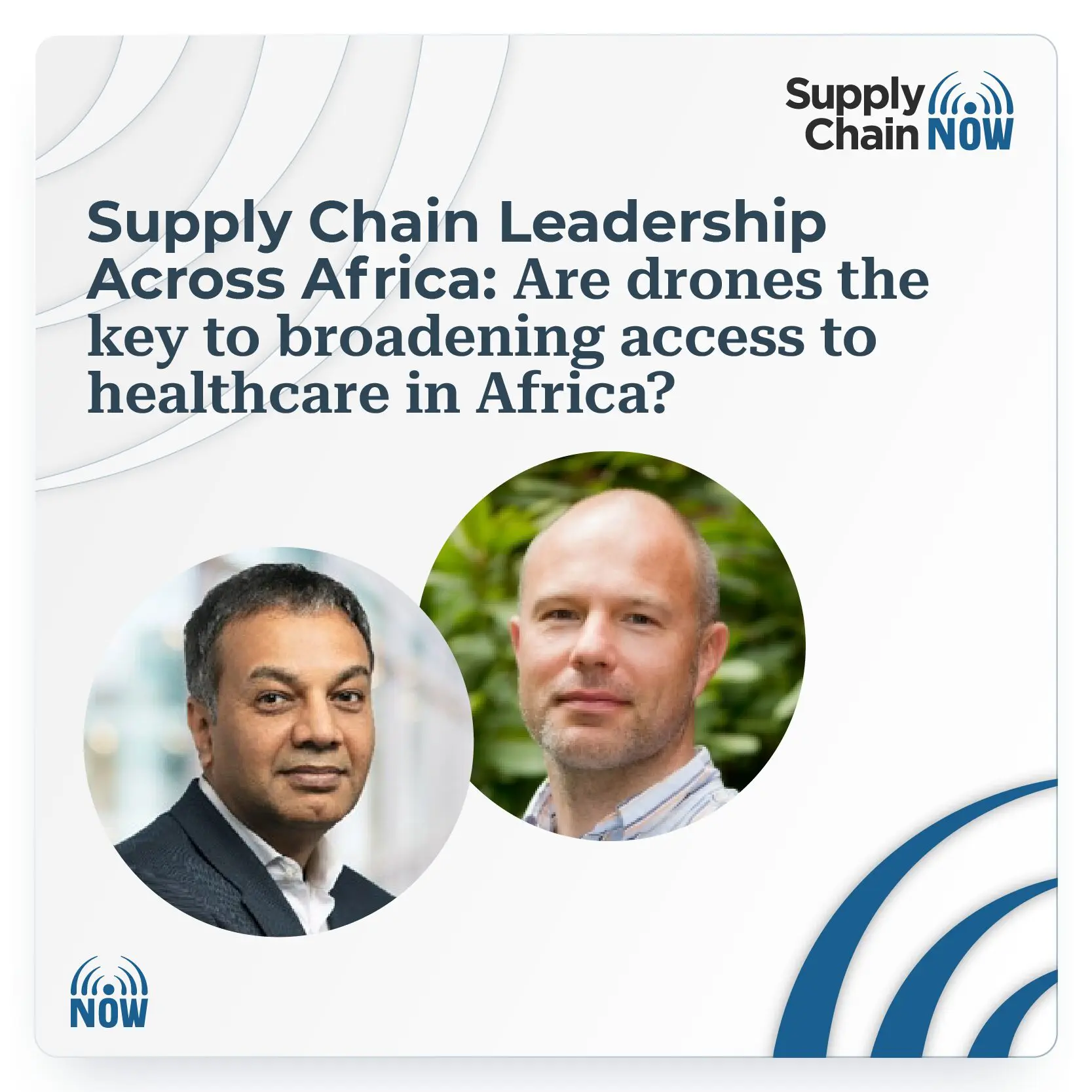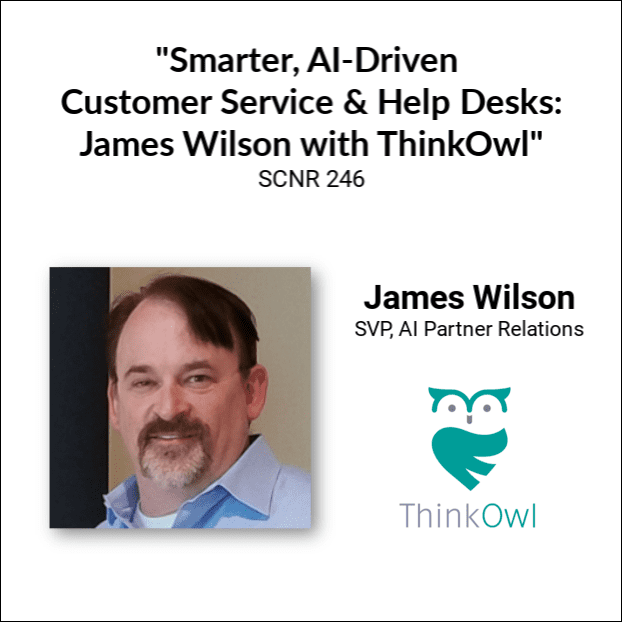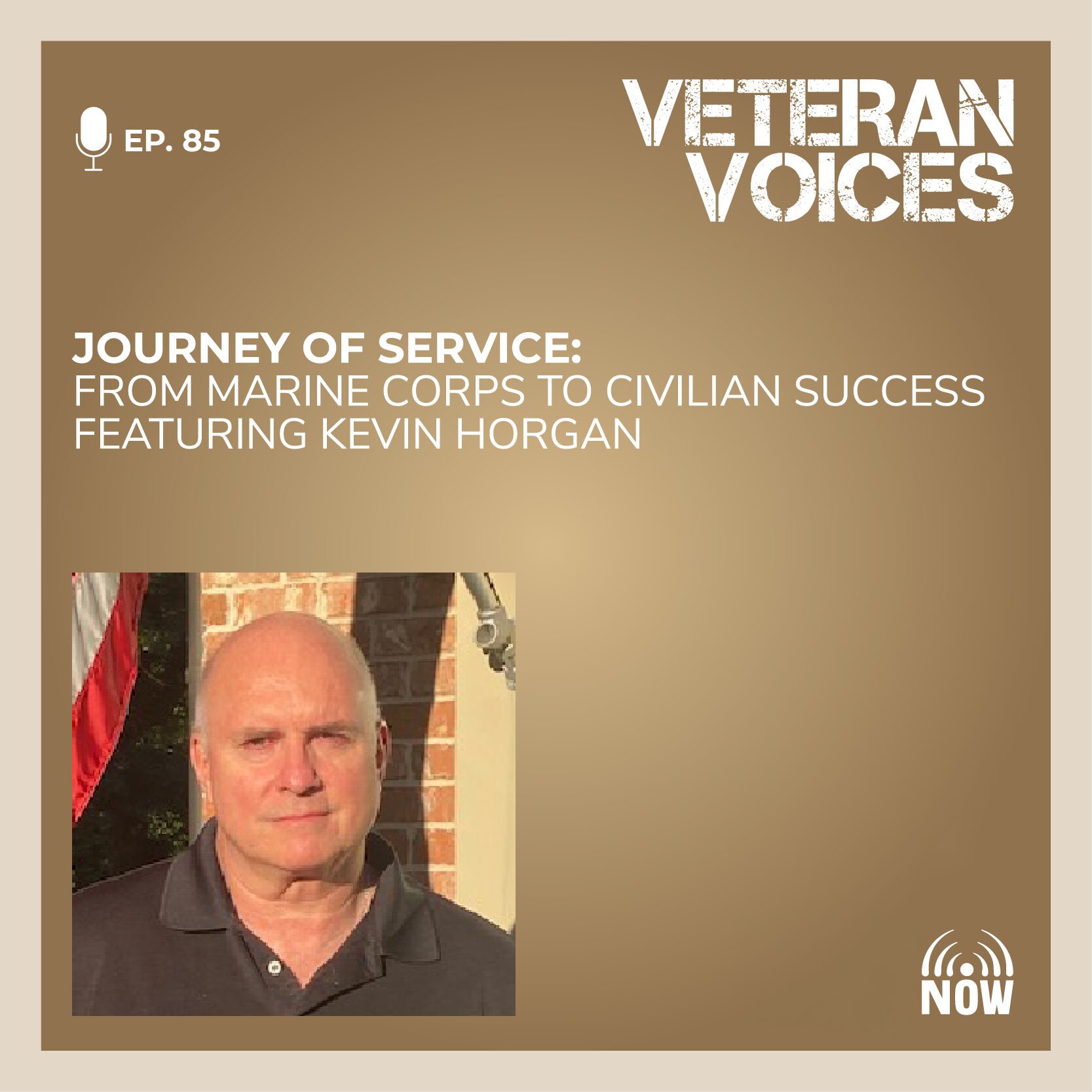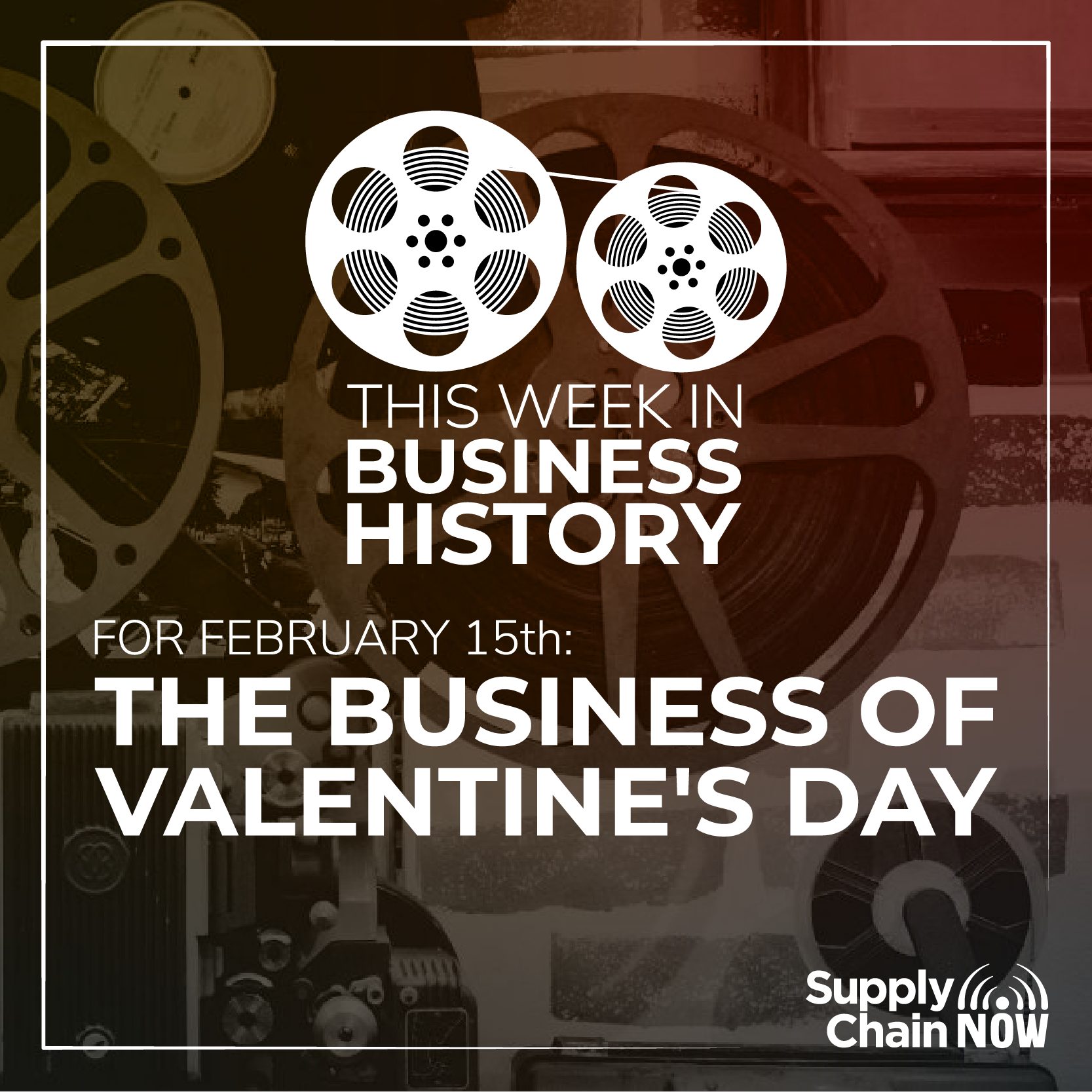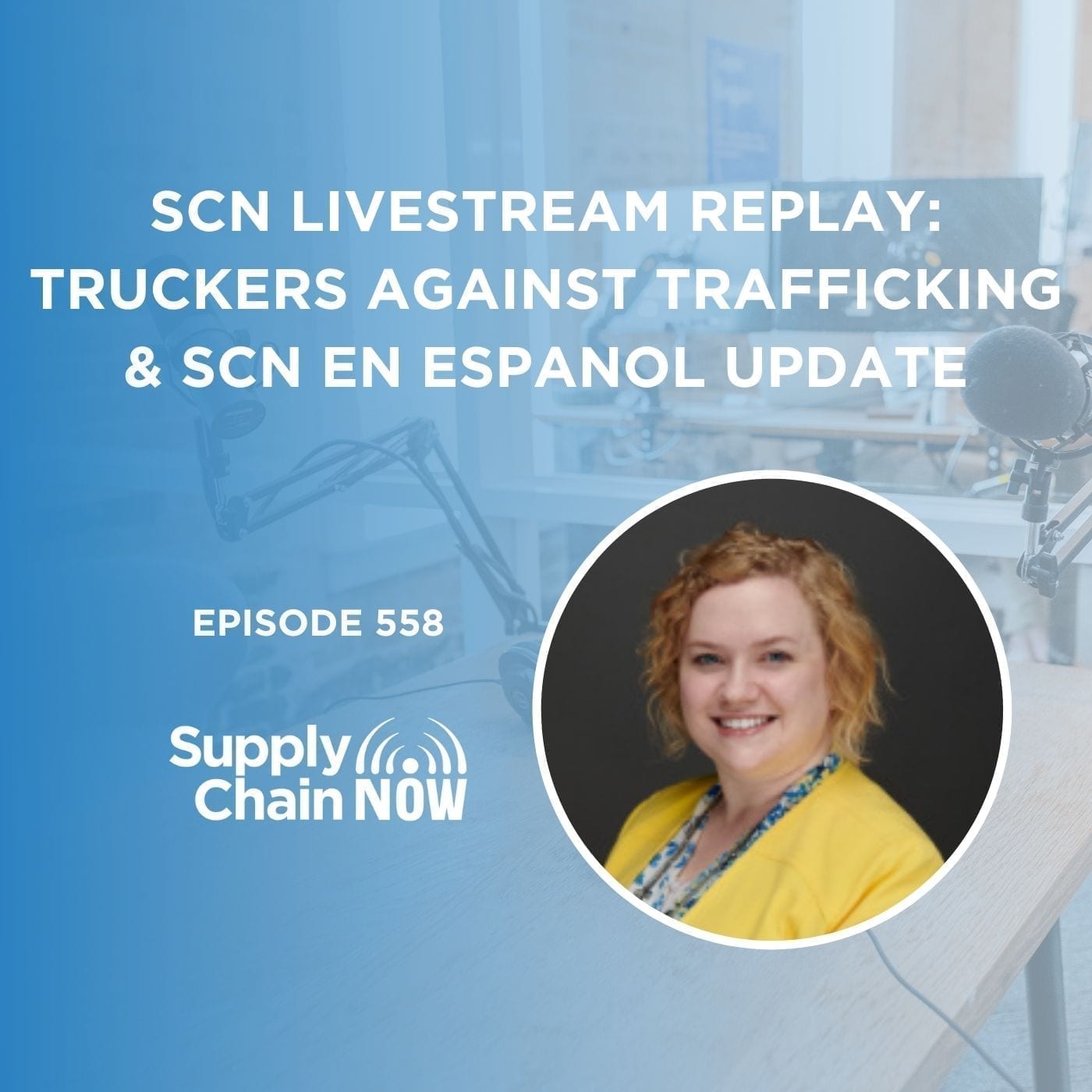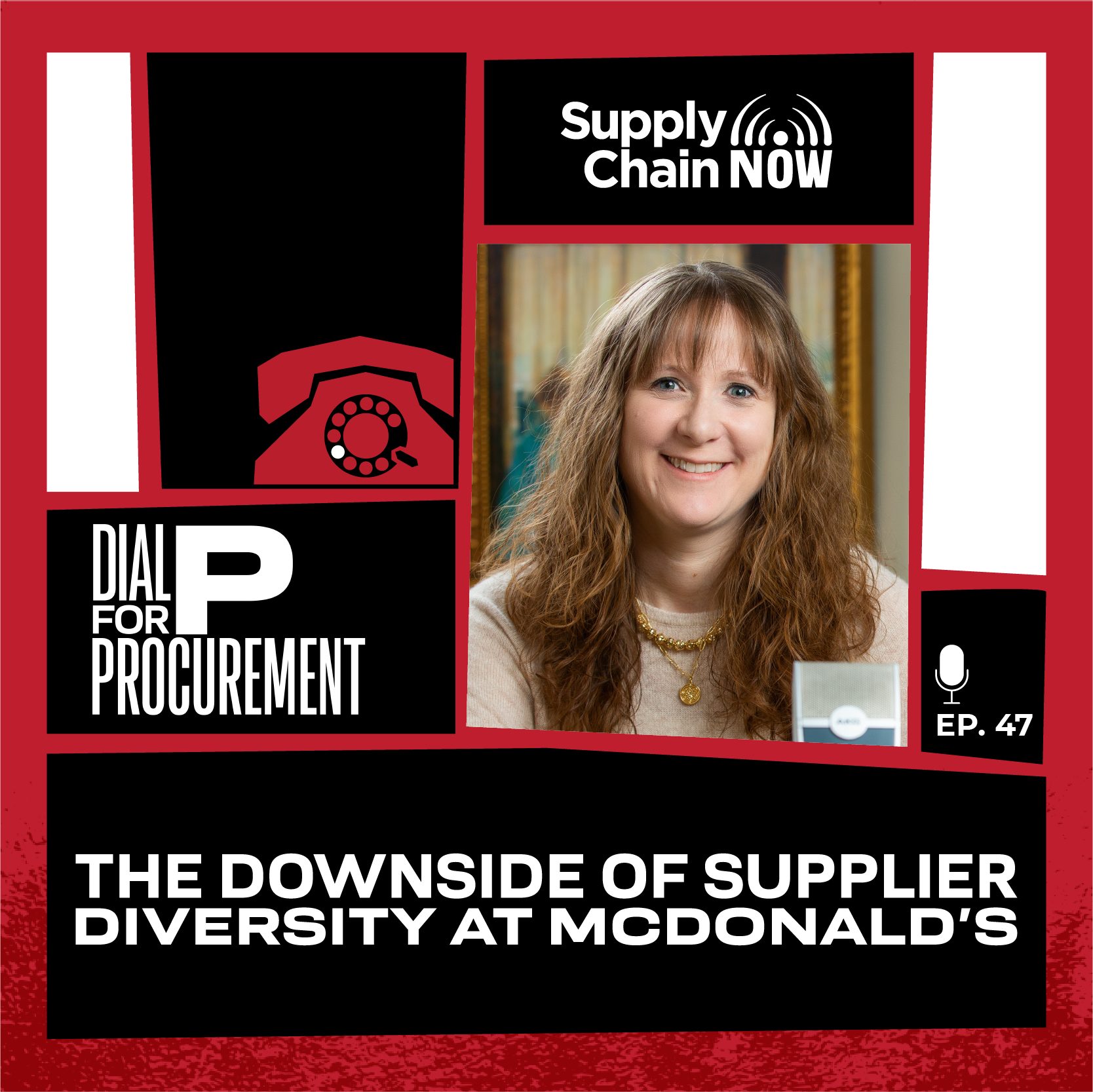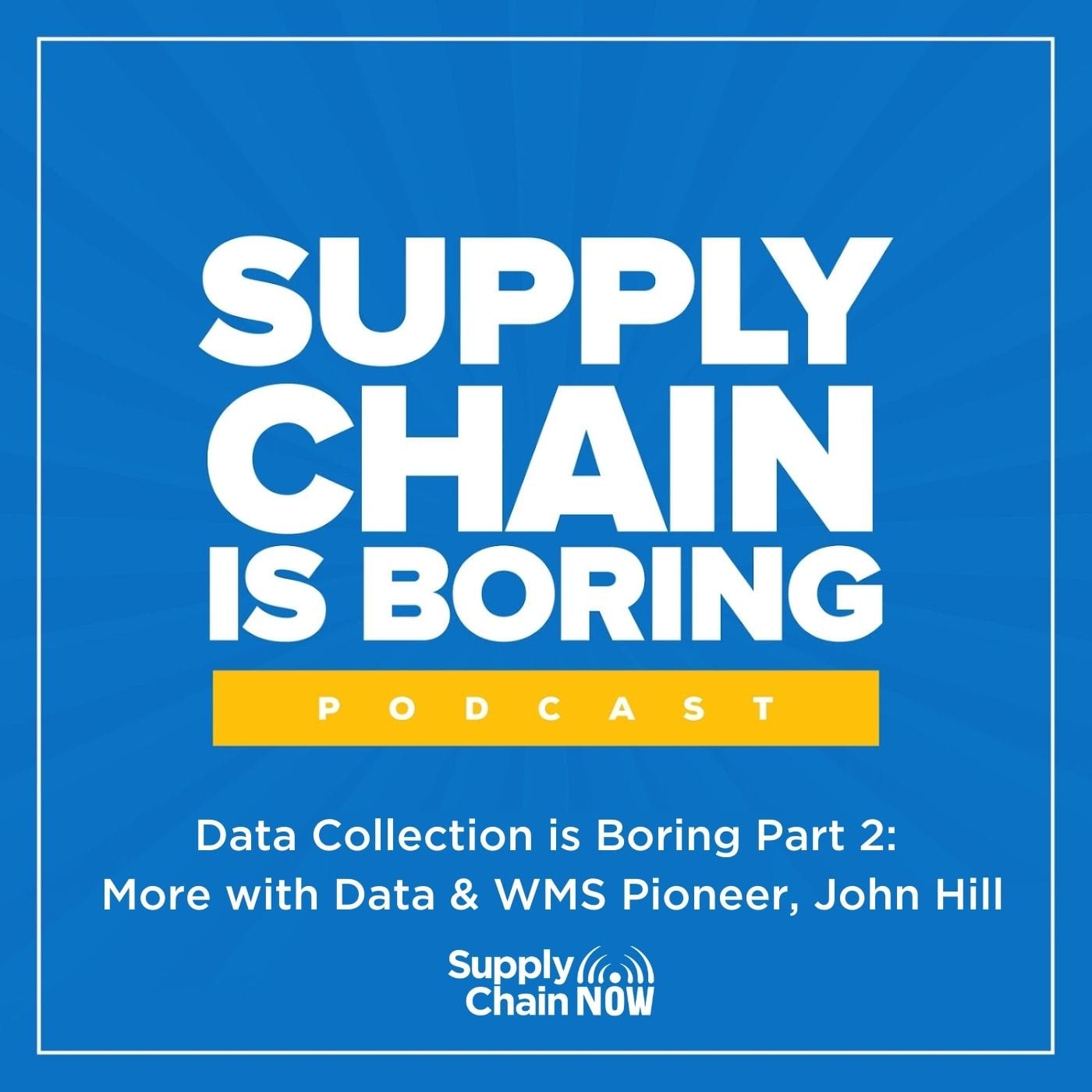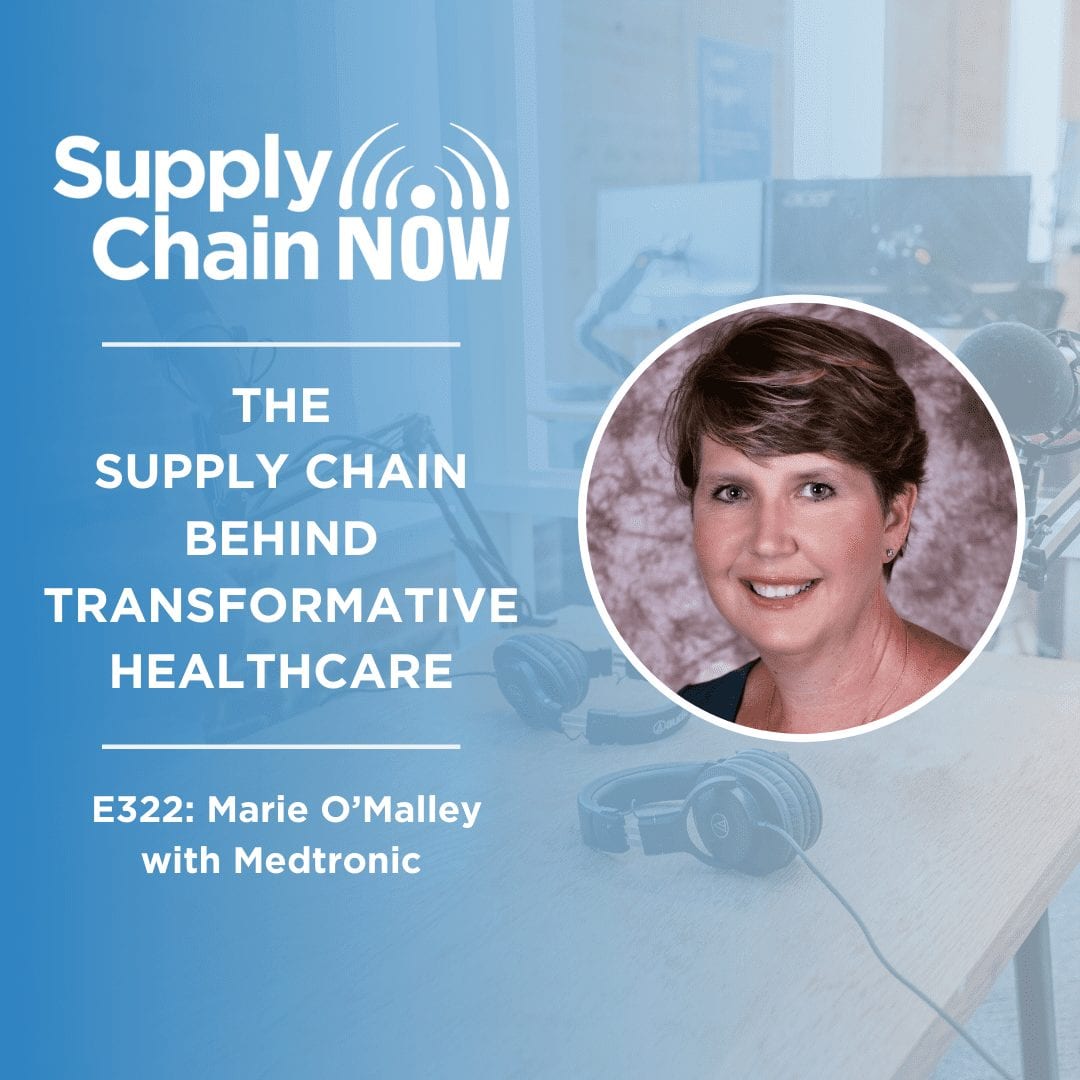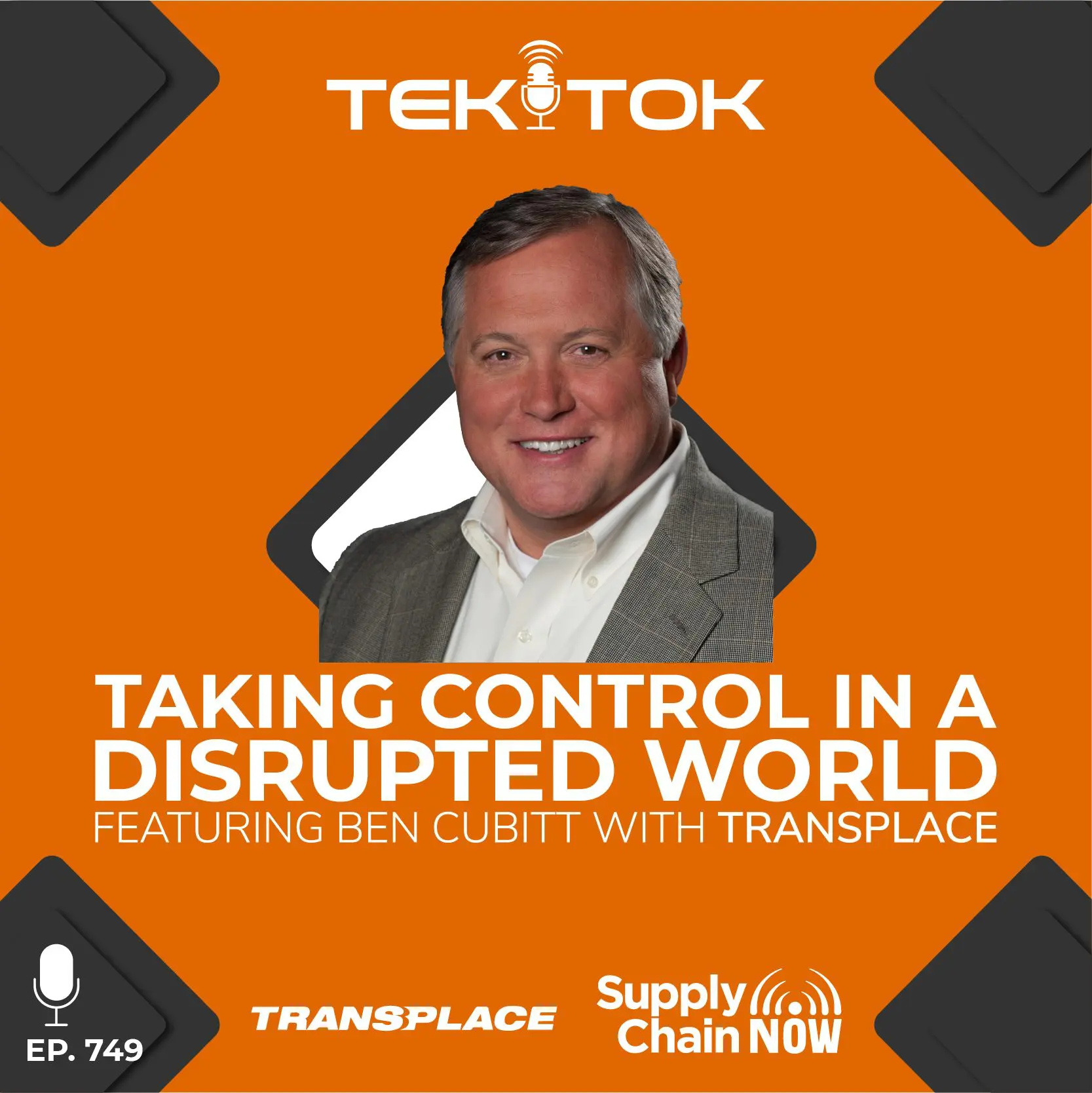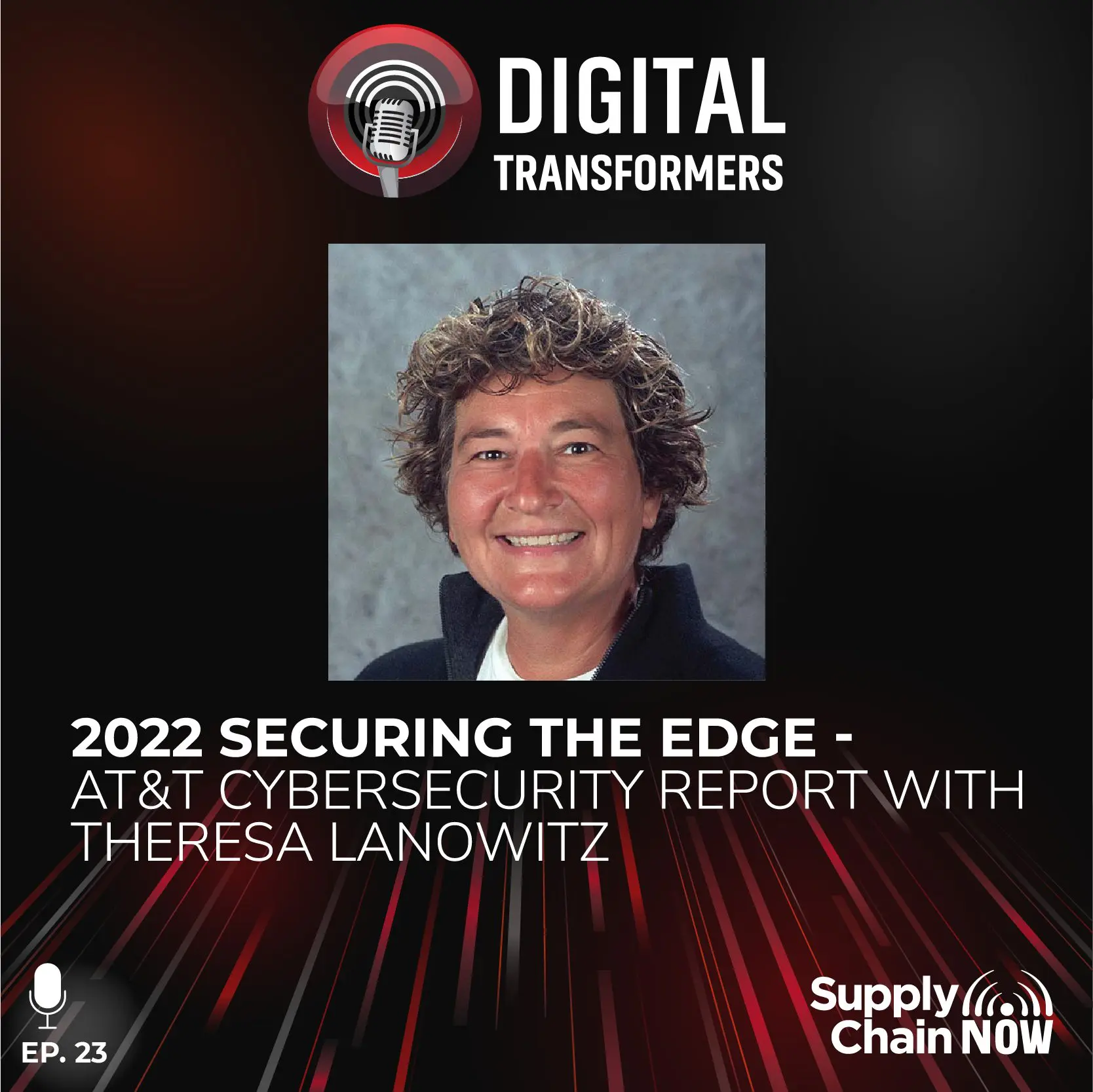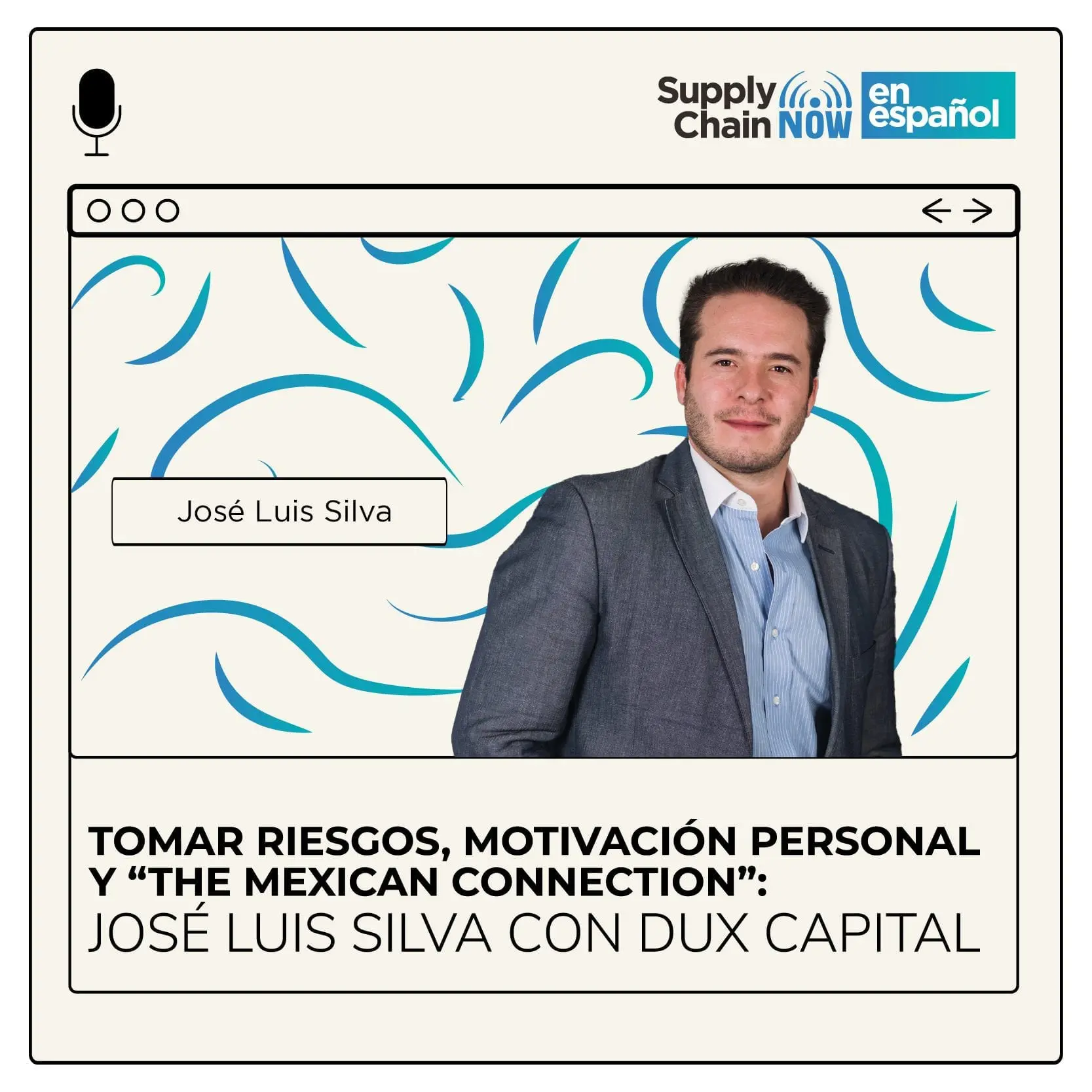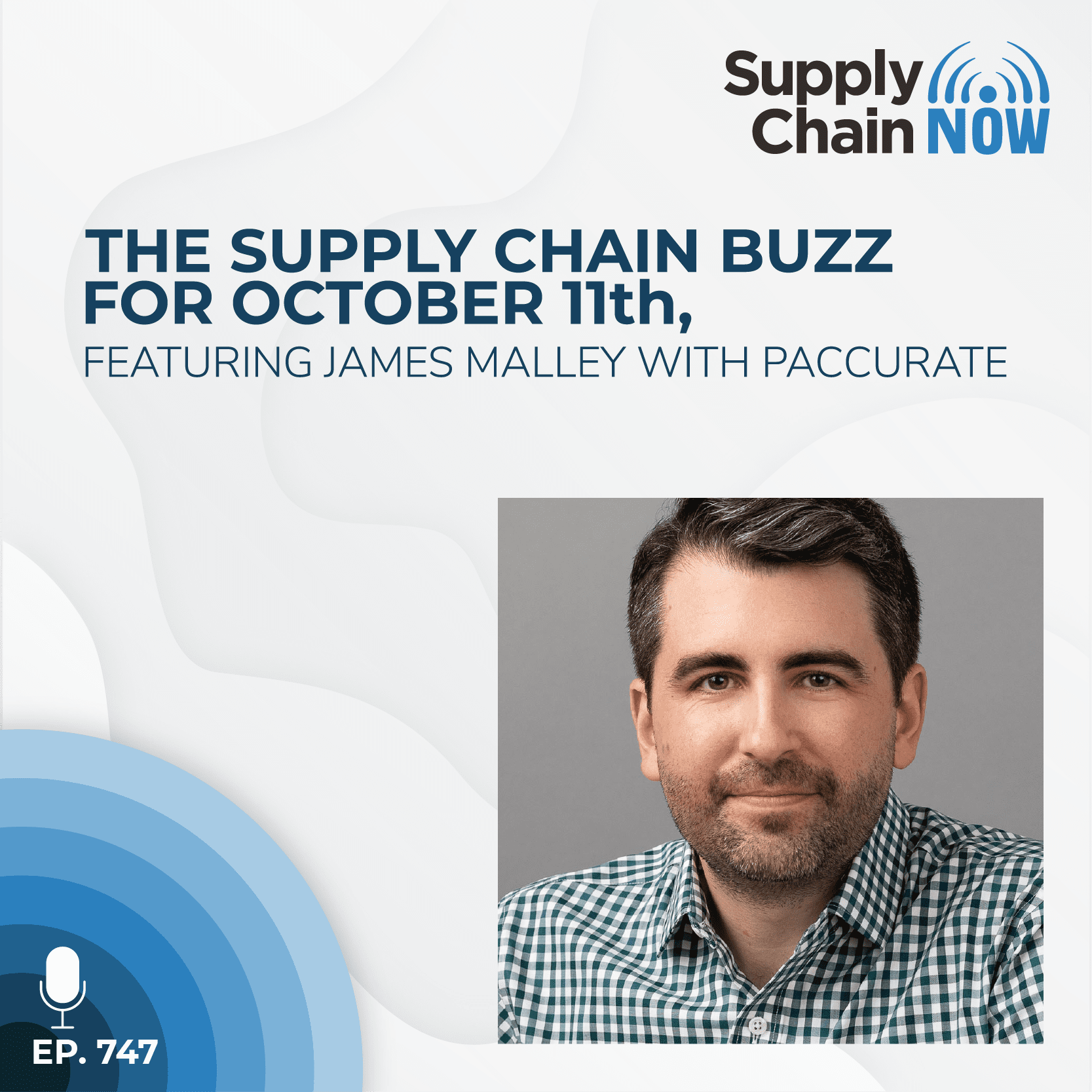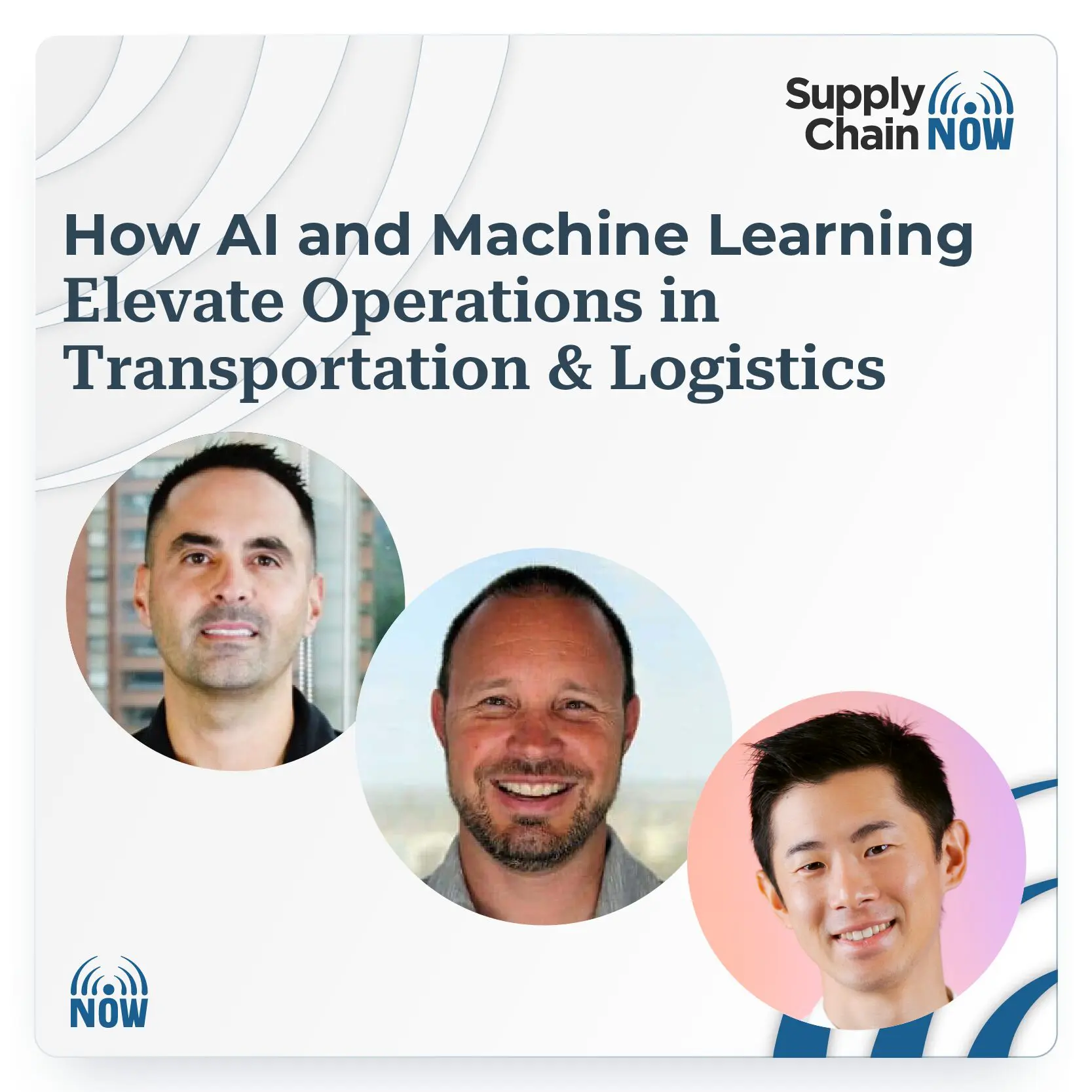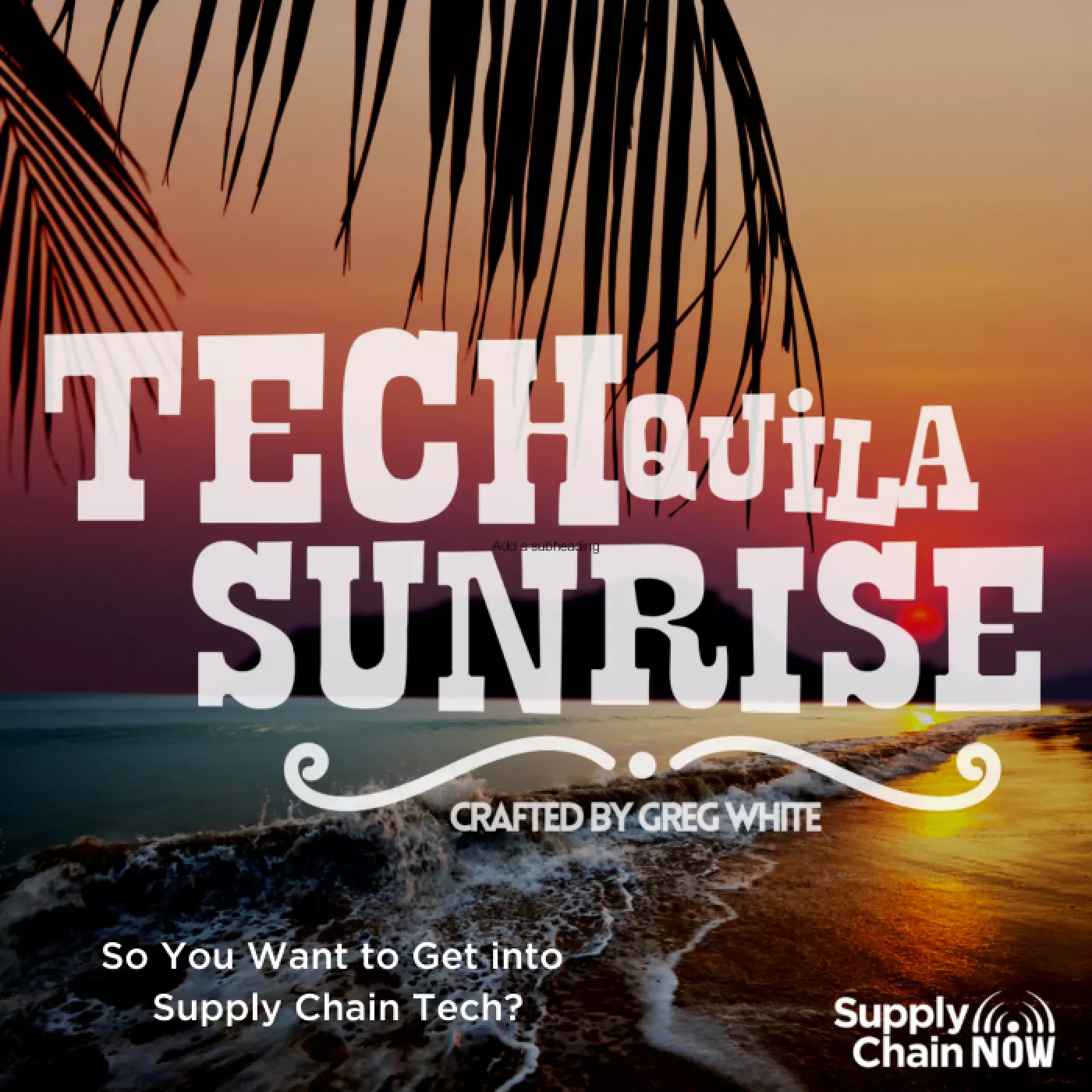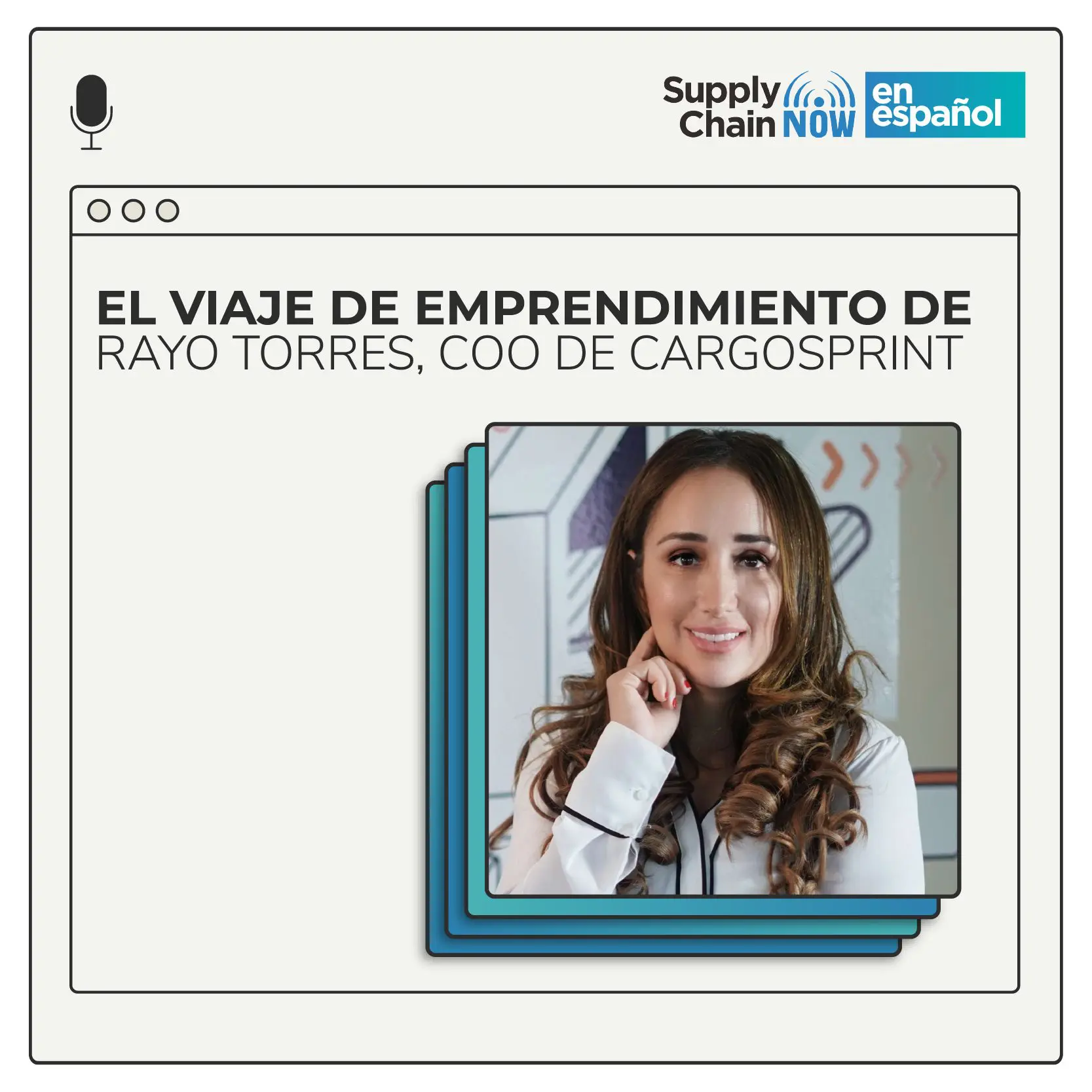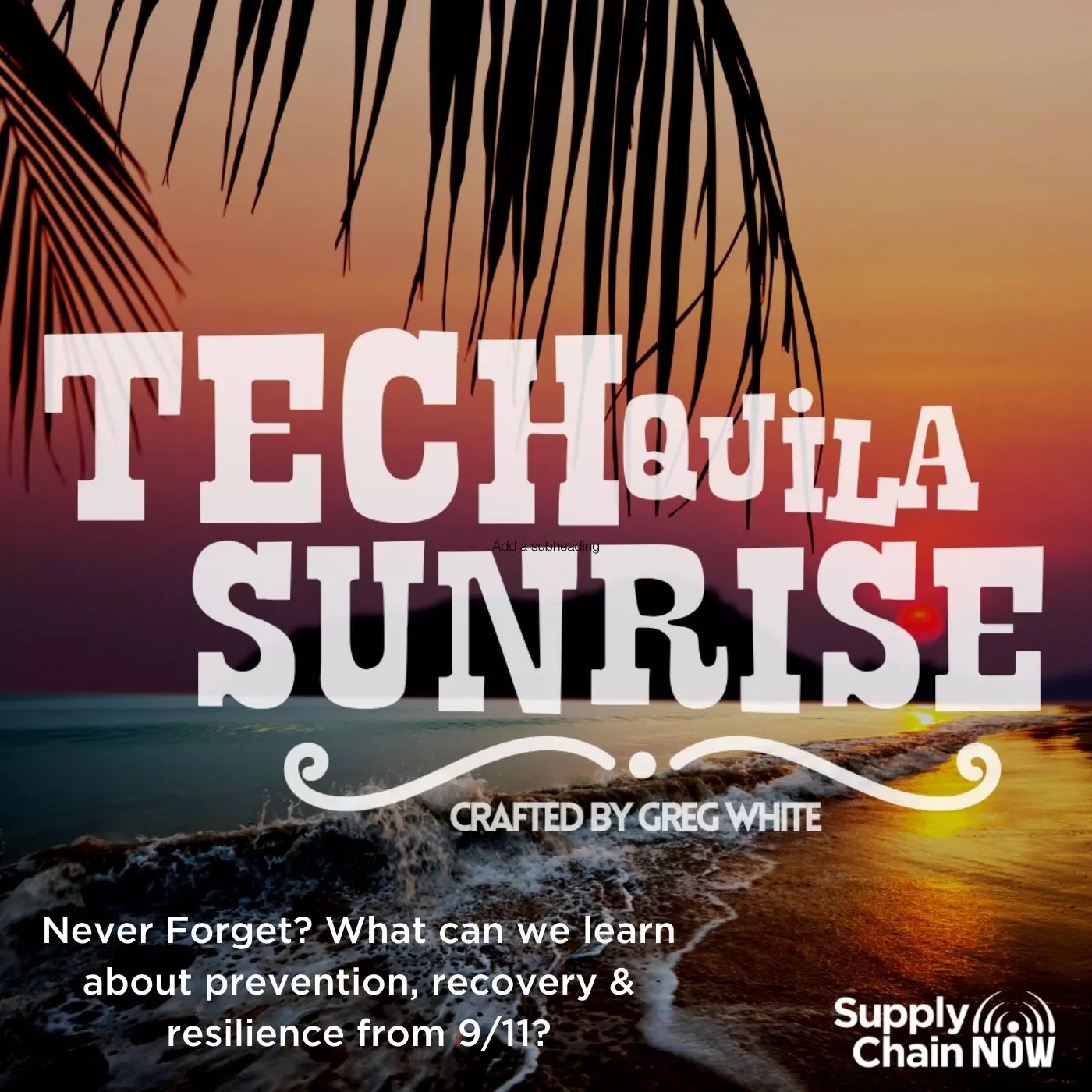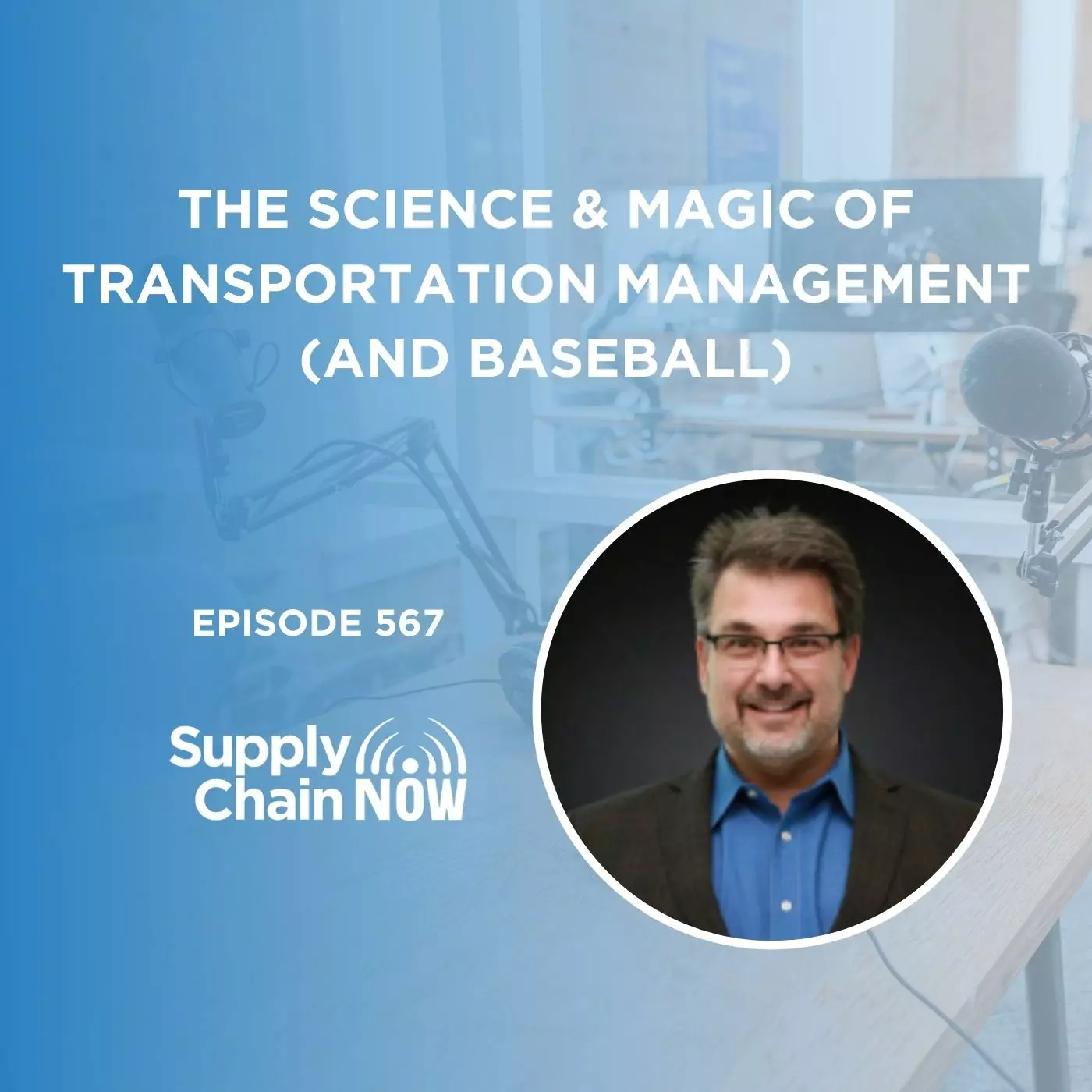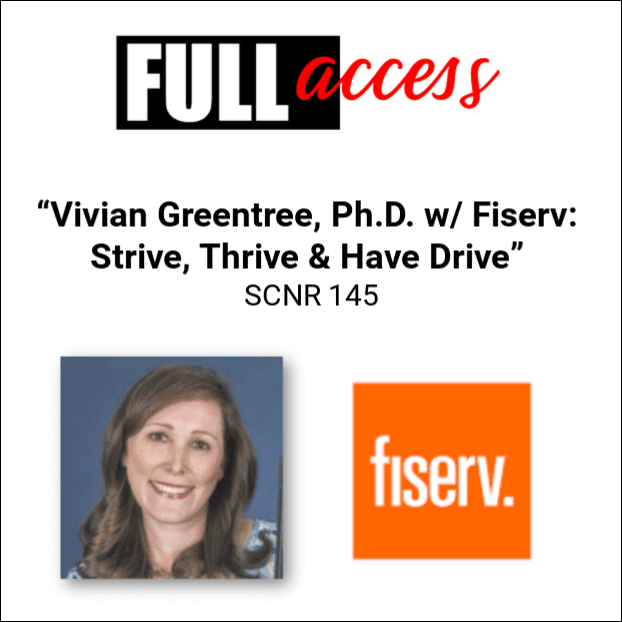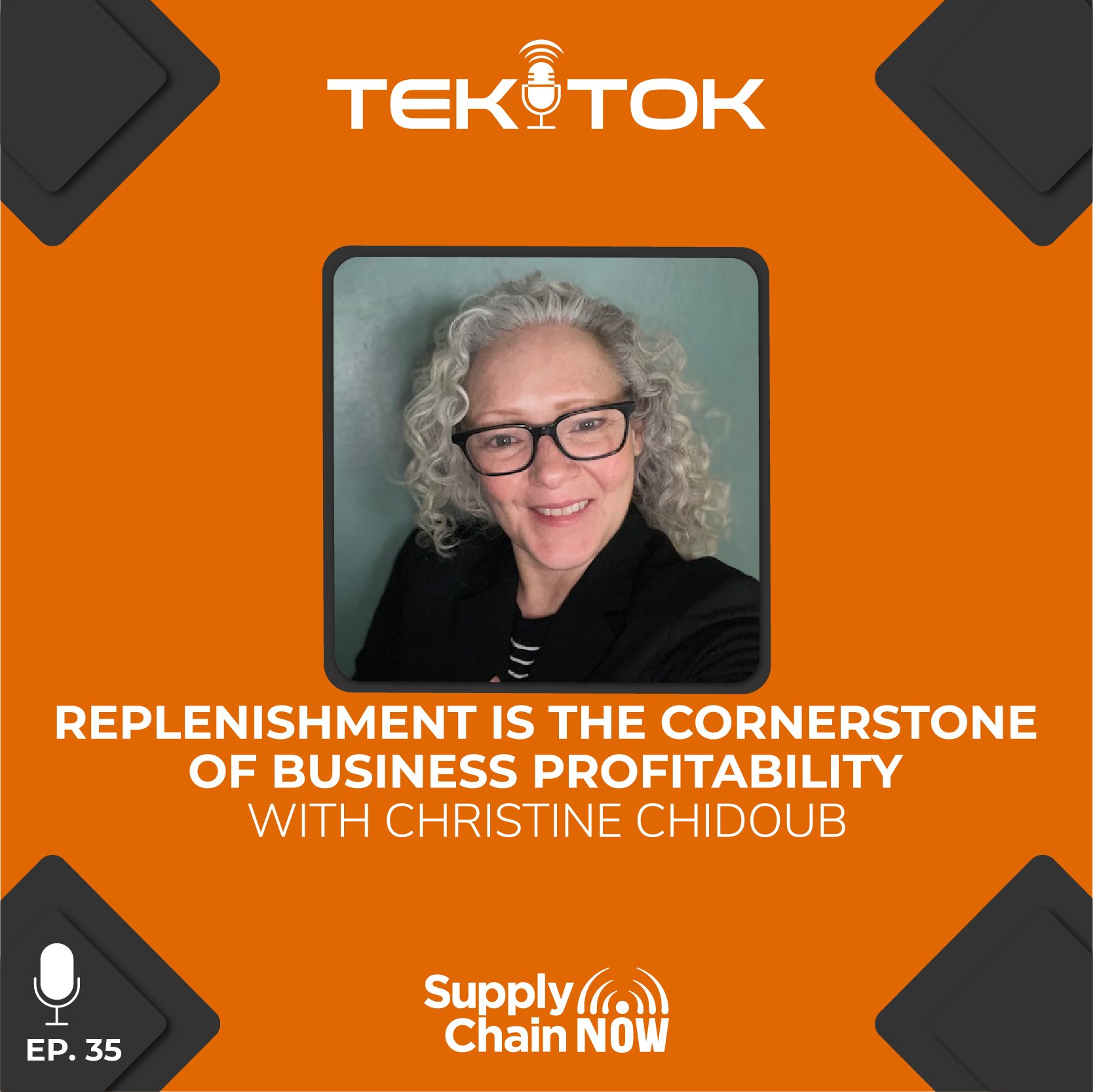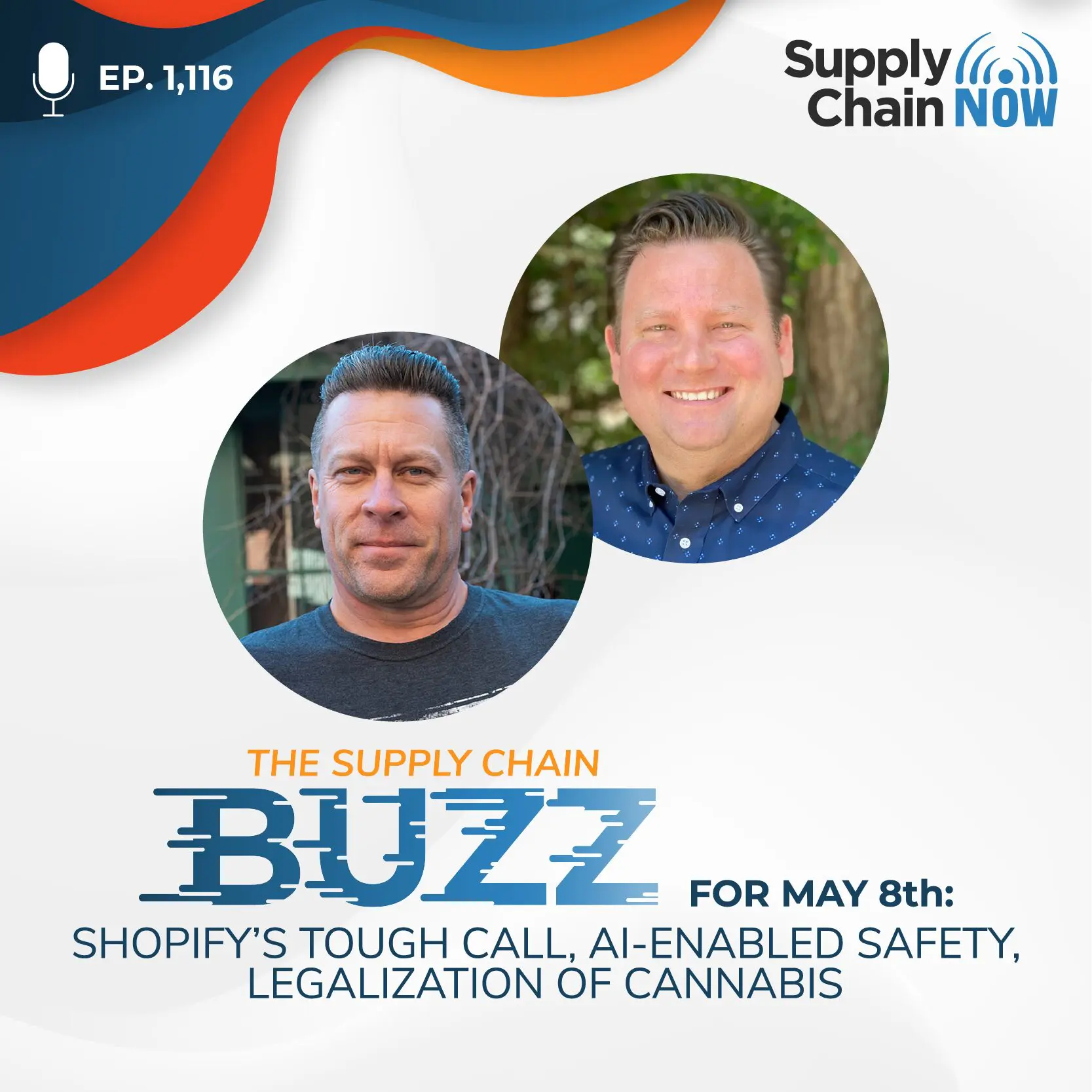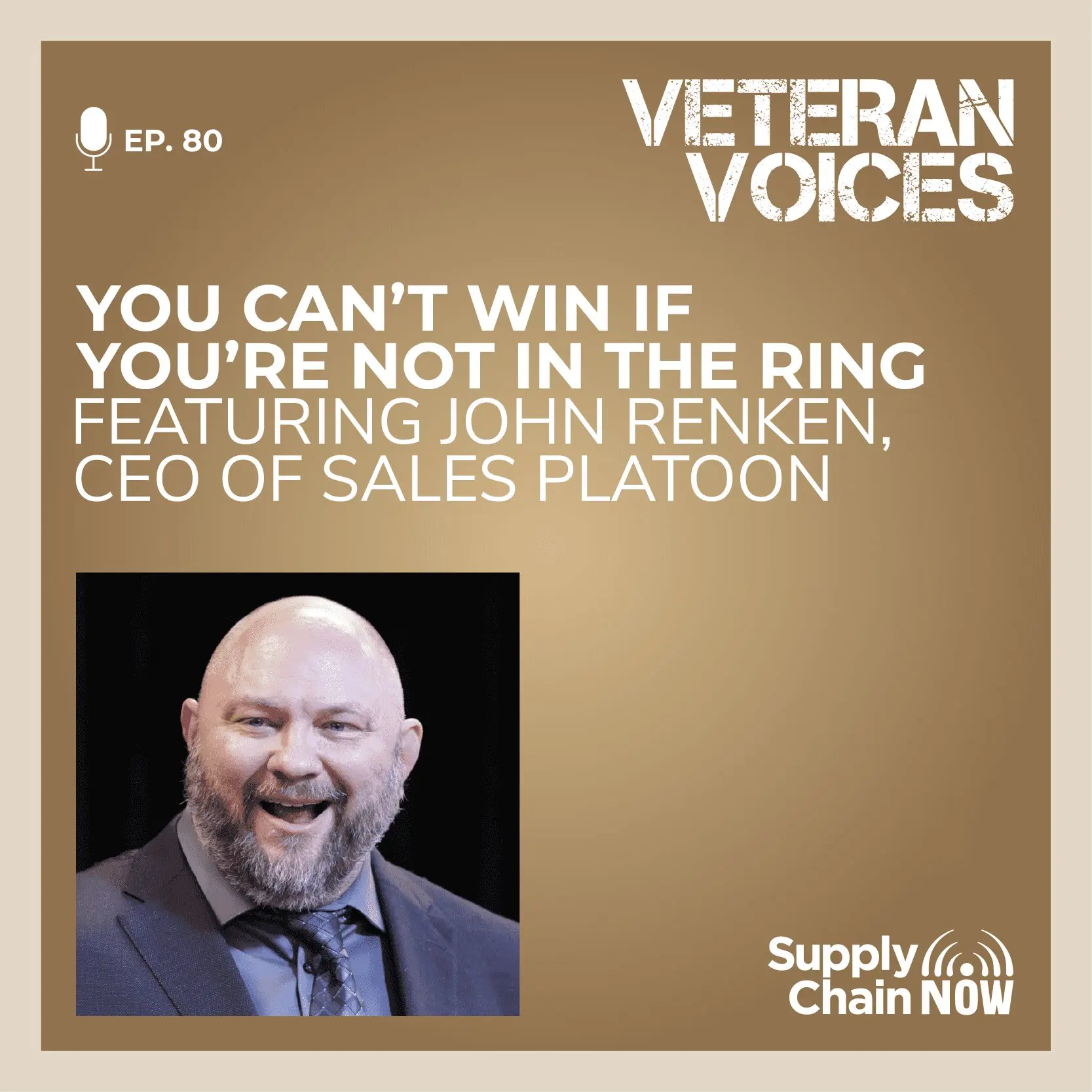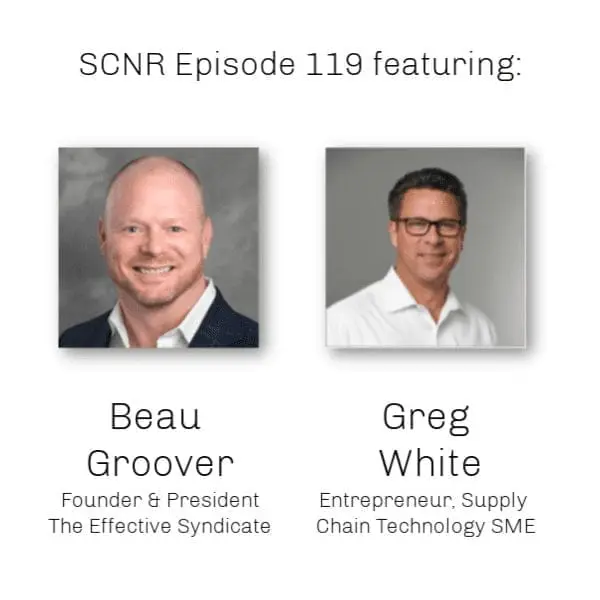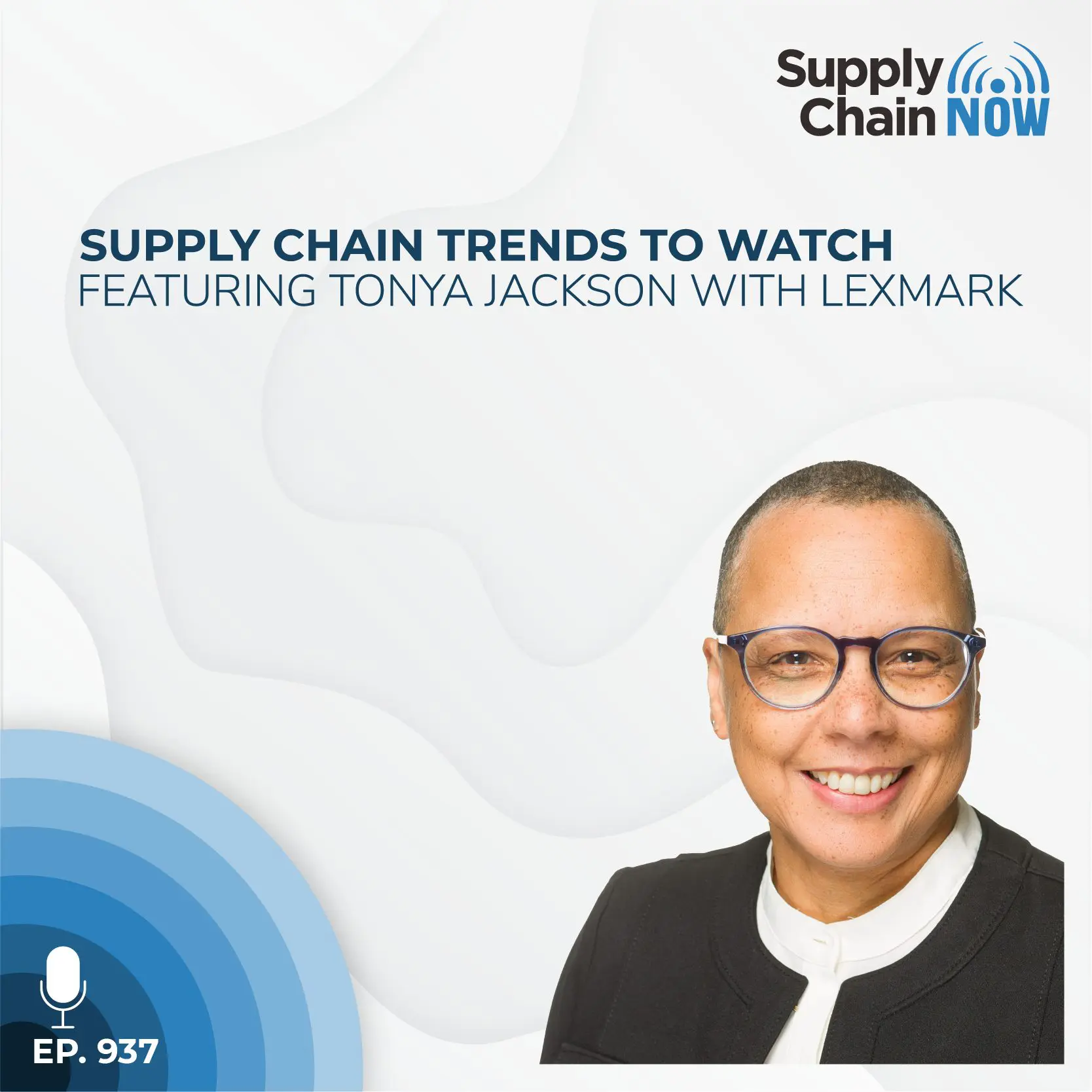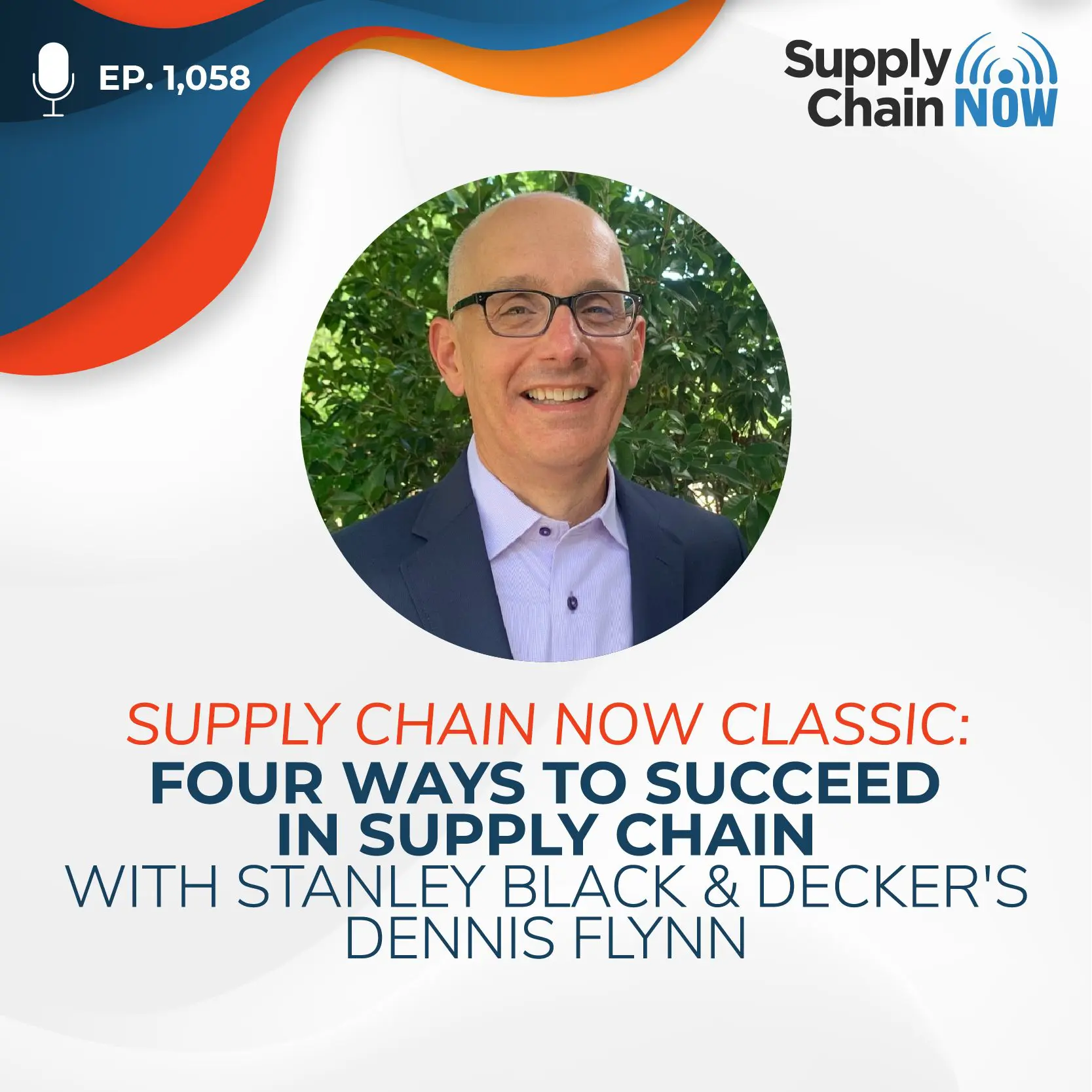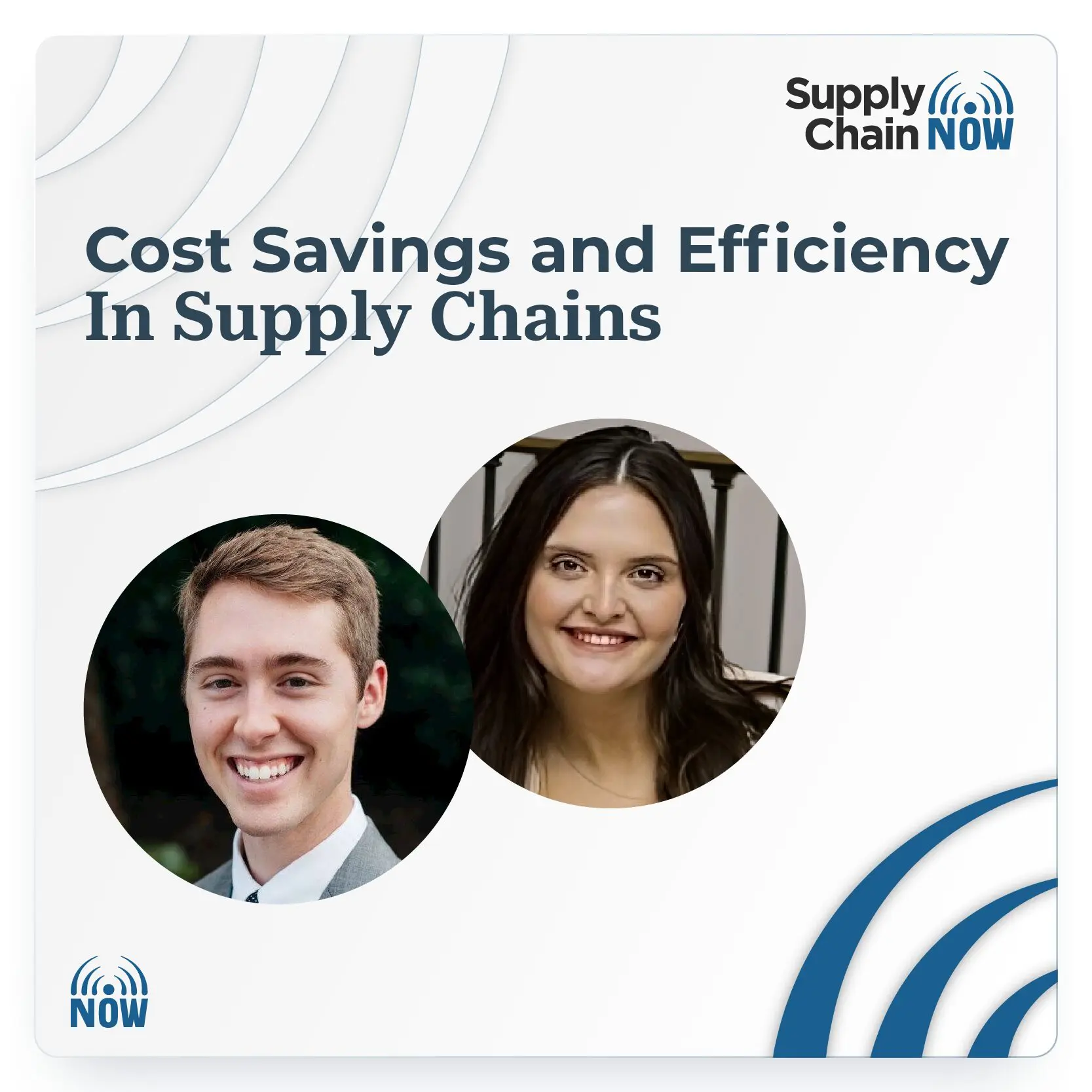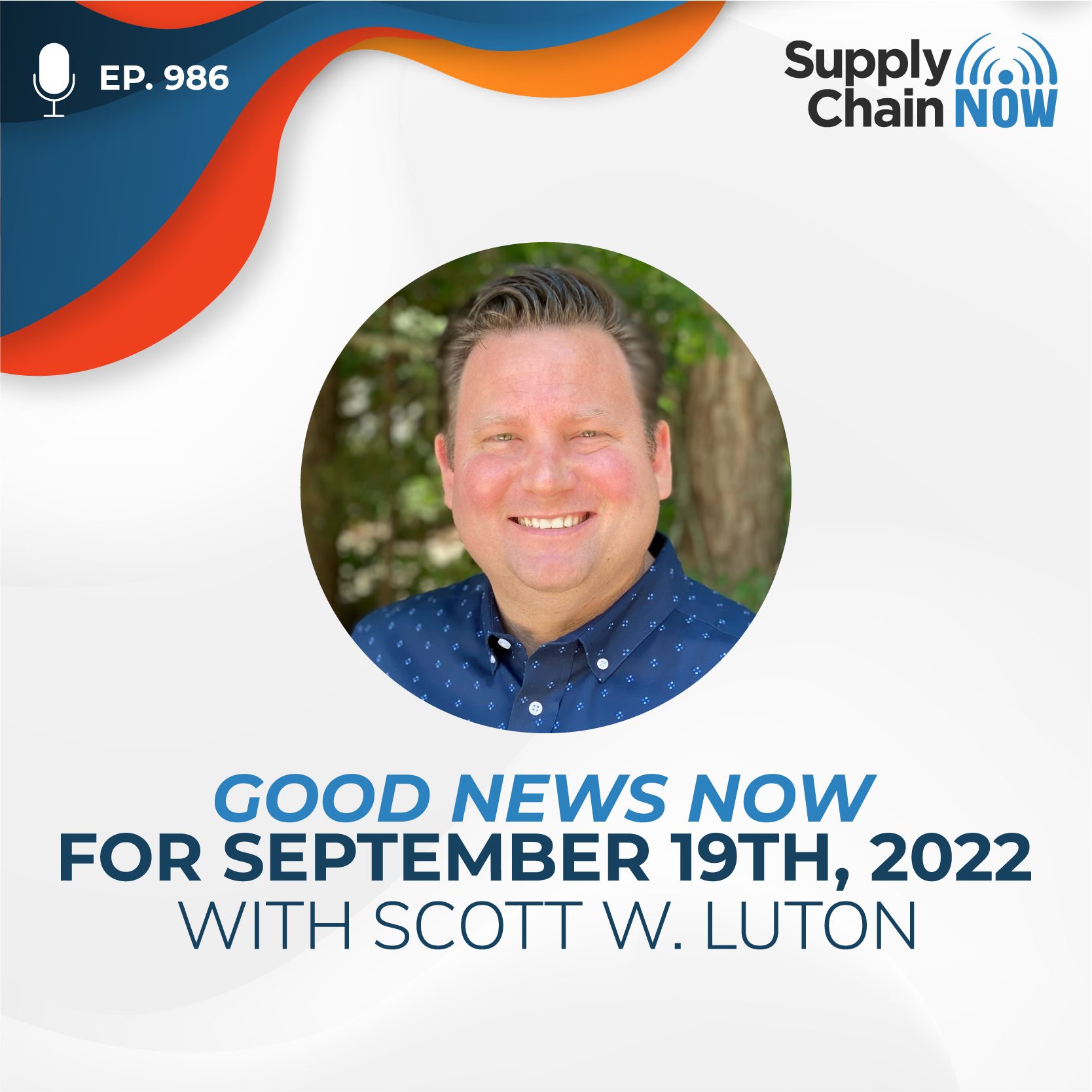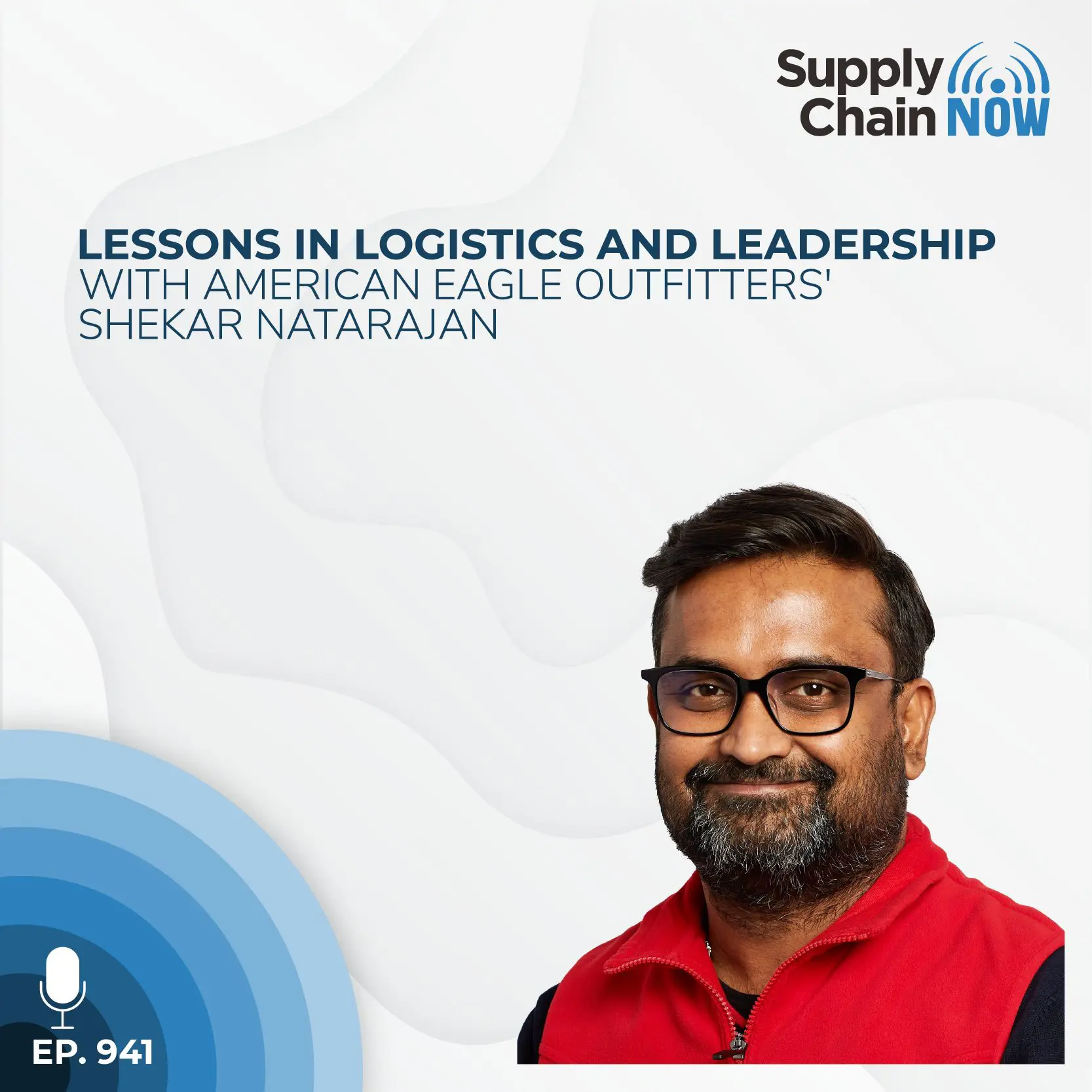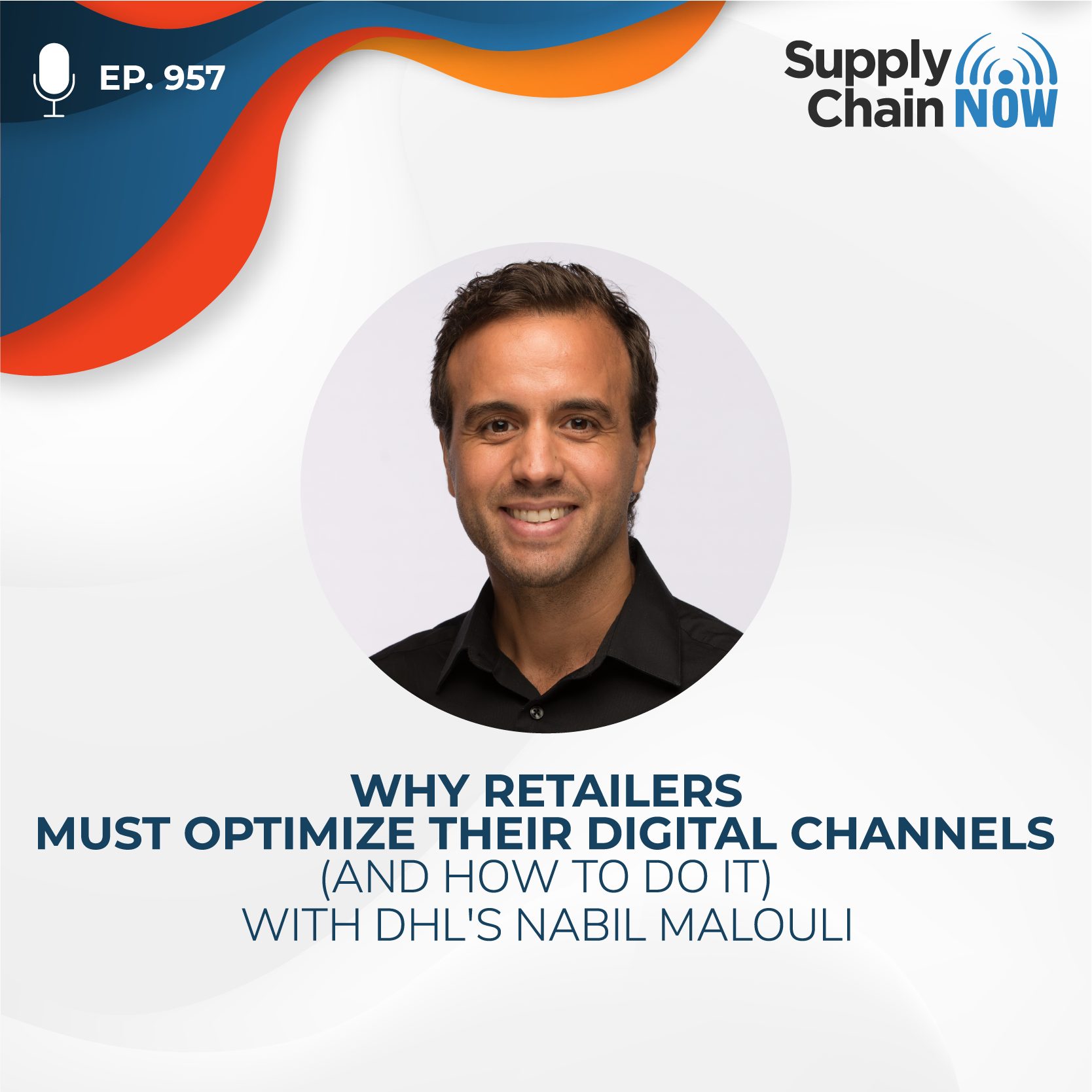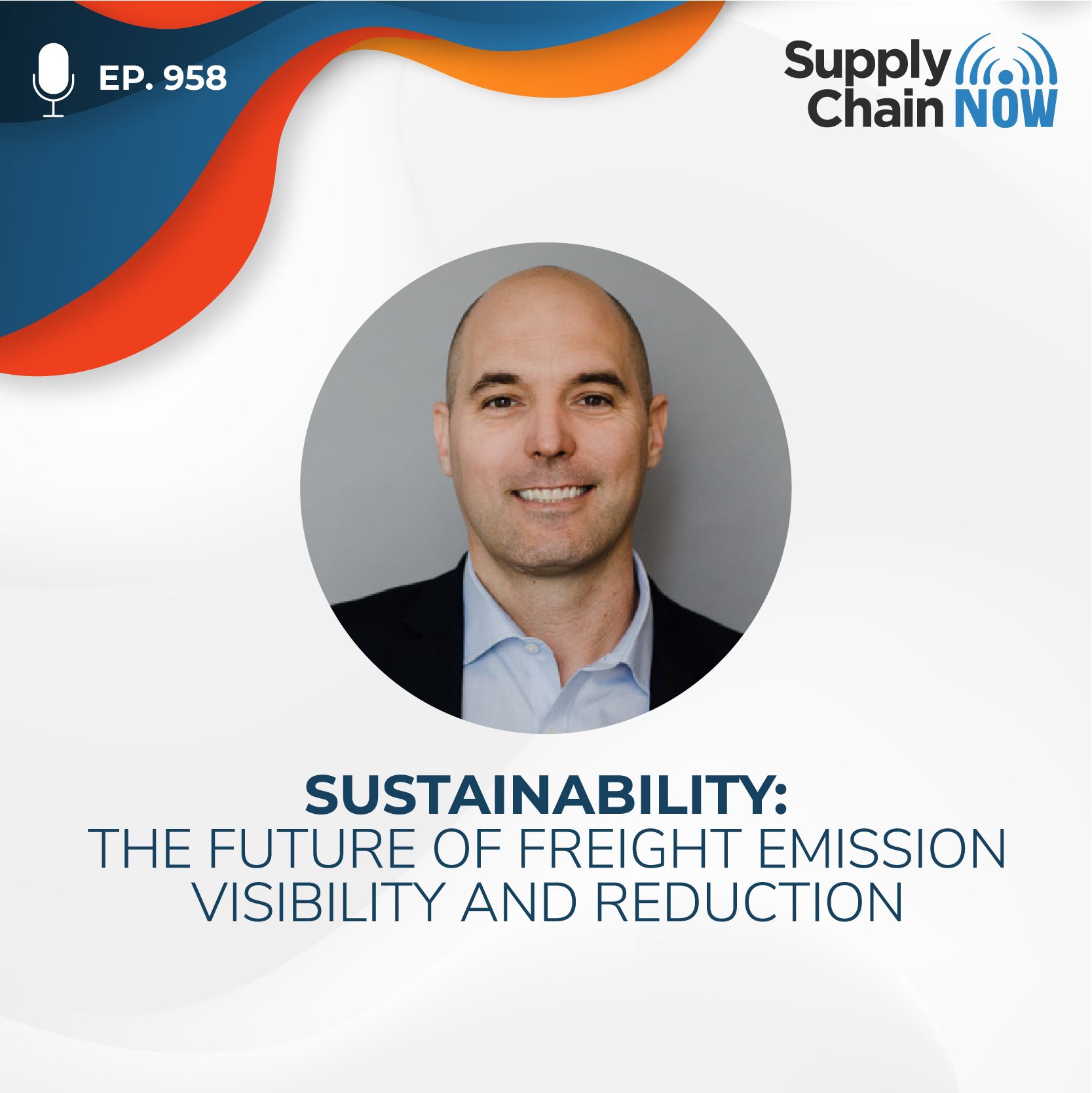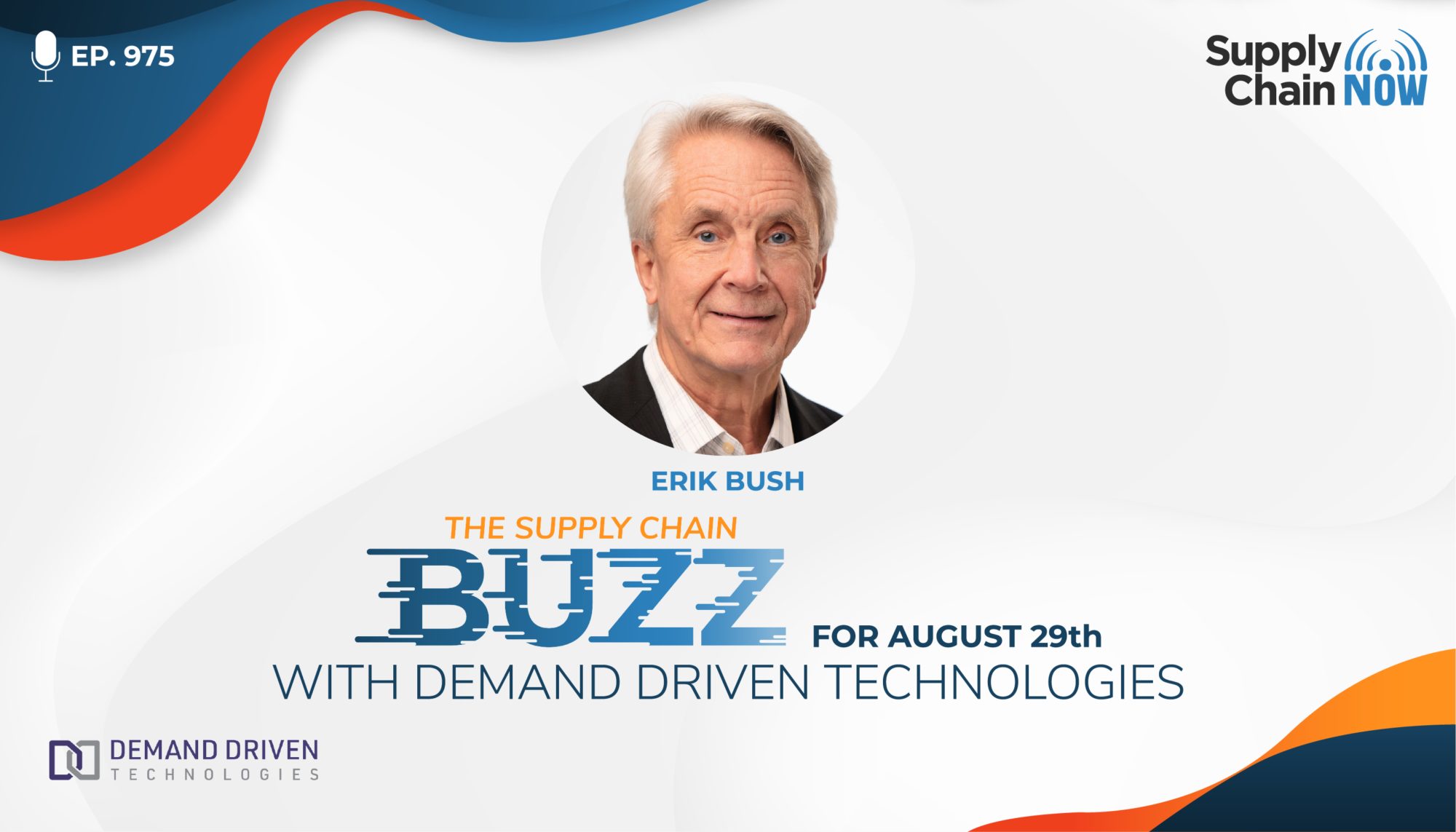
A lot of people don't know this, but in the last two and a half decades of ERP deployment, inventory, turnover rates in the U.S. have been stagnant. [...] How can that be, after all the money that we've spent on these ERP systems, that we're not getting better? There's these new demand driven ideas out there now that use a much cleaner signal than your forecast, the actual consumption in the market, and by prioritizing and using that signal in a better way.
-Erik Bush
Episode Summary
The electric vehicle (EV) market needs batteries, manufacturing companies need access to robotic solutions, and everyone needs a clearer demand signal. Sounds like a job for the Buzz! In this week’s episode, Scott and Greg are joined by Demand Driven Technologies CEO Erik Bush to explore new challenges and opportunities in the automotive supply chain and discuss new resources to fuel your supply chain journey (see what we did there?).
Episode Transcript
Intro/Outro (00:00:03):
Welcome to Supply Chain Now, the voice of global supply chain. Supply Chain Now focuses on the best in the business for our worldwide audience, the people, the technologies, the best practices, and today’s critical issues, the challenges and opportunities. Stay tuned to hear from those making global business happen right here on Supply Chain Now.
Scott Luton (00:00:30):
Hey. Hey. Good morning, good afternoon, good evening wherever you are across the world. Scott Luton and Greg White with you here on Supply Chain Now. Welcome to today’s livestream. Greg White, how are we doing?
Greg White (00:00:39):
We’re doing quite well. Scott, how are you?
Scott Luton (00:00:41):
We’re doing wonderful. Had a great weekend. We had some great cooler temperatures as me and Amanda, the kids, and my folks went out to the Farmer’s Market. Really enjoyed that. What’d you do? What your day like?
Greg White (00:00:53):
Oh, cool. You had local honey?
Scott Luton (00:00:55):
No. We got everything else. Everything else. And it was just a great day. We had a nice meal afterwards and the temperature, it wasn’t like a brisk 60 degrees as you know, but it was just a lot cooler, a little bit of breeze, and football is in the air. How about yours?
Greg White (00:01:12):
Football is in the air. Yeah, that’s the best thing about it. It’s still pretty toasty here at the beach, but it has been raining, preparing us for storm season in the southeastern part of the U.S. I mean, we’ve been in hurricane season for over a month now and nary a peep, not a single named storm yet. I can’t believe I said that out loud. Hold on.
Scott Luton (00:01:44):
Knock on wood, right?
Greg White (00:01:44):
Yeah. Yeah. But it’s actually been pretty pleasant. You know, you kind of got to plan your time when it’s raining, right?
Scott Luton (00:01:53):
That’s right. That is right. Hopefully, keep our fingers crossed, knock on wood, cooler temperatures and football weather is right around the corner. But, today, Greg, it’s The Supply Chain Buzz, where we share some of the leading stories across global business. We’ve got a special guest joining us around 12:25 p.m. Eastern Time. That would be Erik Bush with Demand Driven Technologies. Greg, a repeat guest. And he’s always enlightening when he joins us, huh?
Greg White (00:02:19):
Yeah. Always great to have him on. And he’s tackling some of the issues that we are going to talk about today. Some of the challenges that companies are having. In fact, I did a commentary today about SpartanNash and Piggly Wiggly. Piggly Wiggly, the greatest innovator in grocery history. Strange to say that, but true.
Scott Luton (00:02:40):
It is true.
Greg White (00:02:41):
And some of the struggles that they have and a lot of the struggles that the grocery, the food industry in general, has are precisely the things that Erik is tackling every day.
Scott Luton (00:02:53):
That’s right. And one of my favorite things I like about his perspective – and you’ll hear it here in about 20 minutes – is he doesn’t want to do business in the same tired old and unsuccessful way it’s been done. So, stay tuned for Erik Bush joining us here in about 20, 25 minutes or so.
Scott Luton (00:03:10):
Okay. We got a lot of folks say hello too. We’re going to do that in just a moment. Gene, Shelly, Sophia Aderemi, Clay, you name it. And we’ll do that in just a second. But first, Greg, let’s share a couple of opportunities we’ve got for folks. Hey, the news, perspectives, expert takes, some hot takes, but resources are things that we like delivering every Monday at 12:00 Eastern Time. This is one of those resources. This is an upcoming webinar, Wednesday of this week, focused on How to Use Data to Improve Fulfillment Operations. It’s free to attend, but you’ve got to register. And that’s going to be August 31st at 12:00 noon with our friends at 6 River Systems. Then, we’ve got Thursday, Greg, me and you are tackling a panel focused on How a Buy-Sell Solution Operationalize Supply Chain Resilience to Create Value. That’s going to be Thursday, 12:00 noon Eastern Time with our friends at GEP. Greg, your quick comment there about this upcoming discussion.
Greg White (00:04:09):
Yeah. That’s a mouthful, isn’t it? Operationalize supply chain resilience, say that three times fast. Look, I think resilience is one of those things in supply chain that was long put on the back burner, right behind cost savings – well, cost savings and a-half-dozen other things. But, anyway, finally, we’re starting to realize that we can’t just be all about the cost, all about the forecast. We have to have some resiliency, agility, whatever you want to call it. Some rebound capability in our supply chain. So, I think that’s going to be a great discussion.
Scott Luton (00:04:47):
That’s right. Every time I hear rebound, I think of the round mound of rebound, the one and only, Charles Barkley, right?
Greg White (00:04:55):
Yeah. Greatest ugly golfer of all time.
Scott Luton (00:04:59):
Man, that’s right. We’re talking golf pre-show. We’ll touch on more on that here in a moment. But, hey, join us Wednesday, join us Thursday. And we got one other event coming up, so we invite you to join our efforts to Leverage Logistics for Ukraine. This is an outstanding humanitarian aid program led by our friends at Vector Global Logistics. Our next planning session. You don’t have to bring anything. You don’t have to give anything. Just show up and kind of learn what’s going on and what the real needs are, and what’s being done about it. It’s September 13th, and the link to join us for that is in the comments. And as Greg likes to say, hey, give a little, give a lot, give a whole container ship full, just as long as you’re giving. Is that right, Greg?
Greg White (00:05:43):
That sounds good. I like that. Yeah. You know, it’s funny, it’s been six months since Russia – the criminals – invaded Ukraine, and I think it was on precisely their independence day that the sixth month date hit. There’s our renting for you, isn’t it? But yeah, it’s still going on. There’s still people in need. Contribute.
Scott Luton (00:06:11):
That’s right. And we need to get some updated numbers, but over 300,000 pounds of vetted humanitarian aid has been sent across and has landed just from this one initiative. So, big fans of all the folks that have been a part of that. So, join us September 13th, just to find out how you might can help if you’re in position too.
Scott Luton (06:35):
Okay. Let’s see here. Let’s say a hello to some folks. Josh Goodey, your ears were burning the other day. Greg, who were we talking to from up in Seattle?
Greg White (00:06:45):
It was somebody on here. Was it last Monday? I think it might have been last Monday.
Scott Luton (00:06:52):
I think you’re right.
Greg White (00:06:53):
It was on one of the shows last week, I know that. But they were on at the same time. Because I think Josh, untrue to form, did not give the weather report. And whoever it was?
Scott Luton (00:07:07):
We’ll connect those dots.
Greg White (00:07:08):
We need to go back and figure that out. It’s a mystery.
Scott Luton (00:07:11):
Josh is our resident Seattle area correspondent. Always love his perspective as he shares here, “Good morning, everybody. Still sunny, but Seattle finally got some rain over the weekend.” Excellent, Josh. Of course, big thanks to Katherine, Amanda, Clay, the whole production team to help make it happen behind the scenes. Good morning to you, Katherine. And by the way, Greg, happy birthday to Katherine who celebrates her —
Greg White (00:07:34):
Tomorrow.
Scott Luton (00:07:35):
That’s right, tomorrow.
Greg White (00:07:35):
Tomorrow, but, yeah – right? I mean, we may not be around to say happy birthday. At least not on the air. Sorry, I hope you didn’t want it to be a secret, Katherine.
Scott Luton (00:07:47):
Right. Well, hope you and your family have a chance to enjoy that. Chris Knapp, “Checking in from sunny Atlanta.” Chris, we were just talking about slightly cooler temperatures, it feels likely, over the weekend. Chris, hope this finds you well via LinkedIn. Aderemi is tuned in. I wonder where he has tuned in from via LinkedIn, Greg. Let us know. We love to connect the dots. Sofia – hello to you – “Happy last Monday of August everyone.”
Greg White (00:08:14):
Unbelievable. It’s gone by fast, hasn’t it?
Scott Luton (00:08:16):
It sure has. You blink and we’re in NFL season. In college season.
Greg White (00:08:21):
Your kids are in school for a month, right?
Scott Luton (00:08:23):
Right. But, Sofia, looking forward to reconnect with you soon. I’ve really enjoyed your perspective you’ve been dropping in our webinars and livestreams. Speaking of, Shelly Phillips from Colorado.
Greg White (00:08:34):
From Denver. Well, is it Denver? It’s at least Colorado.
Scott Luton (00:08:38):
That’s right. Shelly, great to see you via LinkedIn as always. Clay Phillips – we mentioned – “Happy Buzz Day.” Good to see you, Clay.
Greg White (00:08:46):
I almost swiped that. I wasn’t looking at the comments, but then I saw he was here and posted that, so that’s good.
Scott Luton (00:08:53):
Old GP, Gene Pledger, from North Alabama is back with us via LinkedIn. Gene, really enjoy your perspective as always. Josh says, “Real football season started a few weeks ago, four straight wins, by the way, Greg.” I guess he’s talking global football, right?
Greg White (00:09:09):
Soccer, yeah.
Scott Luton (00:09:10):
Soccer, right.
Greg White (00:09:11):
Yeah. English Premier League.
Scott Luton (00:09:13):
Yes. The EPL. Cecil is back with us via LinkedIn. Great to see you, Cecil. Let us know where you’re tuned in from. Looks like you’ve got the beach in your background in your headshot. Let’s see here, we’ve got a bunch of comments dropping in here, Wally. Hello, Wally. He says, “Well said, Greg. Cost-centric is very dangerous.”
Greg White (00:09:33):
It’s one of the risks of supply chain, but not the only one. I think we’ve treated it like that a little bit too much.
Scott Luton (00:09:40):
Yes. Good point there. Lucille is back with us from Toronto, Canada via LinkedIn. Lucille, great to see you here. Looking forward to your perspective. So, I know we couldn’t hit everybody, but welcome all. We look forward to hearing your comments on the news articles we’re going to be working our way through.
Greg White (00:09:56):
Sean Connery joined us from Scotland, I see. I don’t know who that is, but –
Scott Luton (00:10:00):
I missed that. I missed that.
Greg White (00:10:02):
I watched Dr. No last night. I decided –
Scott Luton (00:10:06):
The new one or the old one?
Greg White (00:10:06):
The very first Bond movie, not book. But the first Bond movie. So, I decided I’m going back to the beginning and starting all over again.
Scott Luton (00:10:18):
What’s old is new again, as always. Well, as we start to dive into the news here, Greg, I want to start with your supply chain commentaries, which they have been growing like hot cakes. Is that still a phrase these days? I don’t know. I’ll update that later.
Greg White (00:10:37):
I think so. Yeah. I don’t know. I don’t know.
Scott Luton (00:10:39):
Let’s go with it. Selling like hot cakes. So, you publish this every Monday, Wednesday, Friday, and you touch on a variety of topics across global supply chain and then some. Supply chain touched everything as we know here. Now, last week, I think this was maybe from Friday, it was what I’m calling supply chain medley. I loved it. You touched on Lowe’s. You touched on Gap. You touched on Monster Energy. And I thought it’d be a nice little kind of walking around level setting to give us a quick update on what you shared last week.
Greg White (00:11:14):
Yeah. Well, in this particular one, what was fascinating – so I do a newsletter Monday, Wednesday, and Friday also, and I pick an article and then I review it – that day, I could not pick just one article. So, I kind of talked just a little bit, invited people to subscribe to the newsletter. But, also, you know what I think the lesson of that particular commentary was read between the lines. So, if you go into those articles, Lowe’s is starting to do eCommerce for pros – by pros, we mean contractors, not just as common consumers – just as the housing market is collapsing and building is slowing at, well, virtually unprecedented pace in the last 12 years, 14 years. So, you know, I thought I would highlight that to folks.
Greg White (00:12:16):
And then, Gap, they’re trying to kind of remain relevant and keep themselves balanced in terms of eCommerce and in-store retail. And then, Monster beverage, you could just hear/read the pain in the CEO’s voice who clearly feels like he’s being picked on, victimized, whatever you want to say, by people in the marketplace. He’s like, “Hey, we’re so much better than we used to, but you guys just keep beating us down.” That was all in between the lines of every one of those articles. But I think it’s important for people to recognize what’s not said in some of these articles as much as what is said. And I just wanted to share that I took those things away from those articles. And, hopefully, it helps people to think about both what’s being said, how it’s being said, and whether it’s being said is a lot of the message that you should get out of some of these articles.
Scott Luton (00:13:19):
Yeah. Well said, no pun intended. I think that’s one of my favorite things. You know, Greg, you and I have done countless, I guess the mother ship is approaching episode number 1,000, so we’ve done quite a few of these together. And how your approach to it’s almost like don’t look where they want you to look and don’t listen to what they want you to listen. Here’s the real thing that’s important, the signal.
Greg White (00:13:46):
That’s a great perspective, Scott. I think that’s true. I do try to bring that. I think a lot of people take it away too. You can see in the commentary that people, they are, again, reading what’s said, but reading into what’s not in a lot of cases and I think that’s good.
Scott Luton (00:14:04):
And you also add a little sense of humor, and I’ll throw this back up here one more time. Monster Energy has a big problem. Gap continues to fill the gaps – oh, I said it. And it’s just enough. It’s just enough humor as you work through what folks need –
Greg White (00:14:19):
Well, did you miss Lowe’s is aiming higher?
Scott Luton (00:14:22):
Well, a lot of good stuff. Monday, Wednesday, Friday. But it’s not just what Greg has to say. Folks, one of my favorite parts is reading through all the comments and the different takes. So, we dropped the link –
Greg White (00:14:36):
That’s really the point, isn’t it, Scott? Is to get everyone to put their perspective on these, to give their feedback, challenge some of the presumptions I’ve made, maybe even educate me. And that happens from time to time on some of these things that I’m saying, because there’s only so much research you can do into these articles. And I really appreciate the folks that have something to share in line or counter, even, to what I’ve come up with or something that says, “Hey, you missed this.” Or, “Hey, by the way, this is the real truth around that thing.” Which is, I think that’s great for us to have a place to share that.
Scott Luton (00:15:14):
Agreed. Agreed. But, folks, y’all should know Greg White doesn’t miss a thing. I’m just letting y’all know that. But kidding aside, y’all check out the link, comment, give us your take, and look forward to checking out one today on the Piggly Wiggly – the Pig as we call it at least where I was growing up.
Greg White (00:15:32):
The big on the Pig here.
Scott Luton (00:15:34):
Big on the pig. Hey, Cecil – ask and you shall receive – tuning in from Grand Rapids, Michigan. That photo though is from the East Coast, New Jersey. So, Cecil, great to have you here today.
Greg White (00:15:43):
I was going to say there aren’t many beaches in Grand Rapids.
Scott Luton (00:15:46):
That’s right., Allen, great to see you tuned in via LinkedIn from Ottawa. Beautiful city there. Great to have you here. Teshea tuned in via LinkedIn. Let us know where you’re tuned in from. We would love to connect the dots there. Okay. So, Greg, speaking of making the connections or breaking the connection, maybe, your pick of your favorite segue there. I want to get into the story. You know, we have spoken quite a bit about cyber security across global supply chain in many ways. I think it’s underreported. I think folks are kind of assuming no news is good news and, man, it’s a dangerous assumption to make. And we also spoken a good bit about how bad actors are increasing their tax, both in complexity and quantity. Along these lines, a trending LinkedIn news story I found over the weekend I found really interesting.
Scott Luton (00:16:37):
So, check this out, LastPass – which is new to me, Greg. It might not be new to you or some others – is evidently the world’s most popular password manager. Now, the company notified its 33 million users in recent days that hackers had stolen source code and other proprietary information. I’m going to circle back to Greg and he’s going to let us know what source code is being our resident technologist. Now, LastPass says no passwords from its users were amongst the compromised information. So, big news over the weekend.
Scott Luton (00:17:08):
But then, another name folks may know and be real familiar with, we’ve certainly used it here, DoorDash. The food delivery platform also reported a hacking incident where the bad actors did indeed make off with customers’ personal information. They didn’t release any numbers there. So, Greg, I’d love to get your take – and when I said resident technologist, you know, you’re founder, board member, been a part of the technology scene for about since long before it was cool – so when we talk about source code, what do folks need to know about that?
Greg White (00:17:41):
Yeah. I think what’s really disturbing about this LastPass incident is that they stole source code, which is the code that even if you download technology onto your machine, your laptop or mobile device or whatever, you don’t get source code. You get what’s called object code, which is encrypted, encoded, and kind of hidden away, so you can’t reverse engineer the product. But when you have source code, that is the code that is written by the developers. So, someone’s got all the way into their development system and took away code that they use to run their technology.
Greg White (00:18:21):
Now, the official story is only some source code was taken. But they glossed right over the source part of it, so they have the code that LastPass uses to make their technology work, at least some of it. That should be incredibly disturbing to people because who knows what part of LastPass they could duplicate or reverse engineer or even clone or mimic and fool LastPass users or fool other people who want to become LastPass users, whatever, into thinking they have a safe password encryption technology, when in fact they’re giving it right to the hackers.
Greg White (00:19:09):
So, it’s a very concerning break and not good for LastPast. Though, there seem to be kind of two camps of let’s rally around LastPast and be thankful it wasn’t us and lift them up. But the truth is, 33 million people’s passwords – and I have hundreds and hundreds of them – they are at risk right now, regardless of whether they have been taken in this hack, because they have source code, there is am incredible risk.
Scott Luton (00:19:48):
Yeah. So, here’s the good news, folks. If you’re hearing this, clearly, this isn’t a hardcore supply chain news story, but we wanted to share it here today because this is just the latest signal to take action. Just because you or your family or your work family, as it were, haven’t been compromised yet or you hadn’t seen any incident, take action. Because as Seham – Seham, great to have you here with us today via LinkedIn –
Greg White (00:20:16):
Shields up. That’s right. Shield wall.
Scott Luton (00:20:19):
Right. No one is above.
Greg White (00:20:21):
And you know, that’s a good point. Scott, remember when we were in Charleston a couple years ago, we sat through a cyber security discussion that was eye opening. It’s not a matter of whether you have been compromised – as you kind of worded there – or you’ve been compromised. It’s a matter matter of when they will activate or act on that compromise. So, I think we have to all acknowledge that. And this has probably been going on for some time even at LastPass, who knows.
Scott Luton (00:20:54):
Right. And you know when it comes to global supply chain, that weakest link – that weakest link – that folks can find their way in and do damage upstream and downstream. So, take this opportunity –
Greg White (00:21:02):
[Inaudible].
Scott Luton (00:21:03):
That’s right. Take this opportunity to huddle with the team and figure out where all your risk is and then what you can act on. Okay. There’s a couple comments here, and, Lucille, I agree with you, “Information never seems secure enough these days.” This LinkedIn user – and sometimes, folks, if you’re a LinkedIn profile, there’s a certain setting where it doesn’t share your profile information, you can go and change that in your profile setting.
Greg White (00:21:30):
This person probably won’t do that because they won’t even use password managers.
Scott Luton (00:21:34):
That’s exactly what they say here. If you’re listening to the audio replay, the user says, “That’s why I never use password managers.” And I’d love to know, I mean, is that consensus out there? I know some folks in my immediate family are big proponents, big users, so y’all let us know. And, Jose, great to see you here as always, “What the hack is a nice show name.” Jose, man, thank you very much. I’m going to completely steal that from you. But kidding aside, great to have you here and enjoy your livestream every Friday as well. Okay.
Scott Luton (00:22:08):
So, Greg, we have got a big guest here today, a repeat guest. He set the internet ablaze last time he was with us here. He had truckloads of t-shirt-isms. Are we ready to welcome in our esteemed guest here today on The Buzz?
Greg White (00:22:26):
Let’s do it.
Scott Luton (00:22:27):
All right. Well, with no further ado, I want to bring in Erik Bush, CEO of Demand Driven Technologies. Hey. Good morning, Erik. How are you doing?
Erik Bush (00:22:39):
Great. How are you?
Scott Luton (00:22:40):
We’re doing wonderful. Doing wonderful. Great to have you back.
Erik Bush (00:22:43):
It’s awesome to be back. [Inaudible] .
Scott Luton (00:22:46):
Well, you know, Erik and Greg, as we were both saying pre-show, we didn’t have as good of a weekend as who, Greg?
Greg White (00:22:54):
Rory McIlroy. Nobody had as good of a weekend as Rory McIlroy.
Scott Luton (00:23:00):
But those 18 million reasons and then some aside, I do want to stay with the sports theme for a minute, Erik. Because today is National Sports Day. National Sports Day, it’s a new thing.
Erik Bush (00:23:15):
So, why are we working?
Greg White (00:23:15):
Right. Why is this not a holiday? Good point.
Scott Luton (00:23:19):
No kidding. No kidding. But since we’ve got to work, since we’re double down and committed and passionate about working here today, I want to start, Erik and Greg, Erik, what is your favorite sports team you’re most passionate about?
Erik Bush (00:23:33):
Wow. That’s a tough question. I grew up in Cleveland, long time Browns fan. Kind of cringing about that due to events of the last several months. It’s got me really questioning my whole existence. I don’t want to get too caught up in emotion of it all, but I can’t name the Browns. I’m not going to name the Browns. Big Georgia Bulldog fan. National Champ last year, they finally beat Alabama. That was awesome. Actually became a Gunners, Arsenal Gunners over an EPL when I lived in London.
Greg White (00:24:06):
Josh [inaudible] will have words for you, Erik.
Erik Bush (00:24:09):
— straight wins, major comeback against Fullham on Saturday. That was quite exciting. But, actually, my top team right now are the Ravens, and not the Baltimore Ravens. My grandson, Tegan, nine years old plays on flag football.
Greg White (00:24:25):
Nice.
Erik Bush (00:24:25):
His team have won the last two titles undefeated. I mean, nothing makes grandpa more proud.
Greg White (00:24:33):
Wow. That’s awesome.
Erik Bush (00:24:35):
Grandson out there playing quarterback, and making interceptions, and running the ball, and just having a pound in his chest.
Scott Luton (00:24:43):
I love it.
Erik Bush (00:24:44):
I’m wearing a purple too today. So, there you go.
Scott Luton (00:24:48):
I love that. I love the Ravens, the local Ravens. Okay. So, Greg, Erik shared a lot. Man, we could go down a lot of different routes there based on what he shared. But, Greg, for the two or three folks that may not know you, what is your favorite sports team?
Greg White (00:25:03):
I mean, I will say it, but I’d just love for anyone who has a speculative answer to give their answer in the comments. I’m just going to wait a couple seconds, see if anybody remembers. And, of course, there is nothing that the Kansas City Chiefs could do that would cause me not to have them be their biggest fan. Because, frankly, they could hire the head of Al-Qaeda as the head coach and I would still root for them.
Erik Bush (00:25:41):
That’s a long ways there, Greg.
Greg White (00:25:45):
That’s only a joke. But huge Chiefs fan, of course. And I really empathize in a lot of ways with Browns fans. One of my best friends, Paul Noble, and one of my long time best friends are both Browns fans. We can all empathize together. We both had Marty Schottenheimer as coaches. We both had multi-decade runs as mediocre at best football teams. And we’ve had some hard times. We’ve had some unsavory characters on our rosters. And so, I empathize with where you guys are right now, Erik. I really do.
Erik Bush (00:26:26):
At least [inaudible] with Carolina the other night. So, you know –
Greg White (00:26:30):
Yeah. I didn’t get to see that game. How’d he play by the way?
Erik Bush (00:26:32):
He had two touchdown passes. He was proficient.
Greg White (00:26:36):
I don’t understand what was wrong with the guy personally. He almost single handedly beat us the first game of last season.
Scott Luton (00:26:43):
And you’re talking about the former Cleveland Browns quarterback, Baker Mayfield.
Greg White (00:26:46):
Yeah. Baker Mayfield. Sorry. Yes. Baker Mayfield.
Scott Luton (00:26:48):
Who is now with the Carolina –
Greg White (00:26:51):
Panthers.
Scott Luton (00:26:52):
Panthers. Yeah. Yeah. Gosh.
Greg White (00:26:54):
As a true Falcons fan, you can’t even say their name, can you? That’s good, man. I appreciate it.
Scott Luton (00:26:58):
Hey, we always got to be honest. I am admittedly a bandwagon Atlanta Falcons fan.
Greg White (00:27:04):
Okay. We’re talking about favorite sports teams, Scott, spill it.
Scott Luton (00:27:07):
So, I’m a big time Clemson Tigers fan. You see some of the memorabilia – did I say that right? – back behind me. Remind me to never try to say that word again on any livestream. And then, secondly, of course the Atlanta Braves. We had a tough, tough weekend against the Cardinals. Late game bullpen errors of mistakes. But, hey, I can’t complain, World Series last year. Unexpected World Series and they’re good again this year. So, Erik and Greg, that is the sports minute. And we’ll have to have you back soon again, Erik, as we host a regular show Supply Chain Nerds Talk Sports. So, we’ll revisit that a little later on.
Scott Luton (00:27:50):
Hey, really quick, before we get into some of the key things we want to talk with you about, Erik, I want to go back to a couple comments here. Rami, great to have you via Ottawa via LinkedIn. Thanks for joining us accord to your perspective today. Amanda and a few others are big password manager fans. Amanda says she feels safer online using it. That’s interesting to hear. Gene, “Personally, I’d rather do my best in different levels of passwords than trust a password manager.” Gene, excellent comment there. Kristen, “Go Chiefs.” Great to see you, Kristen, via LinkedIn. Let us know where you’re tuned in from. And Clay’s calling me out here, “Bandwagon Falcons fan sounds like an oxymoron these days.” Okay. There’s probably plenty of us around here. Good point, Clay. And Lucille, “Hey, these conversations have made me start to pay attention more to sports.” Well, then we have –
Greg White (00:28:41):
Hey. Not supply chain? She was already paid attention to supply chain.
Scott Luton (00:28:46):
That is right. And speaking of supply chain, we’re going to dive right in. We’ve got a lot to get into with Erik. And I want to start with this first story here. So, Erik, this Supply Chain Dive story here reporting on an automotive industry development that’s turned quite a few heads. I think I referenced on the frontend, and, Greg, you and I chatted about this earlier, Ford Motor Company and others are expressing major concerns when it comes to battery sourcing. So, Erik, tell us more.
Erik Bush (00:29:14):
It’s a real interesting article. And I’m very interested in this whole topic of the electric vehicles. I had my first ride on a Tesla a few years ago and I was just amazed at the difference. And one of the colleagues on our staff was explaining, you know, what the service interval is. It’s like they check your battery every couple years and that’s about it. Because when you think about it, an electric motor has so fewer electric moving parts than a combustion engine. It’s amazing.
Erik Bush (00:29:42):
And what’s happening, I think, just looking back over the last few years how fast this thing is starting to take off, it’s really striking. And I think the reaction that you’d see in the article about Ford, and they mentioned Stellantis, which is the Fiat Chrysler strategies, is they are very concerned that they’re going to run out of the raw materials needed for the batteries. Ford is focused on their battery producer relationships, but Stellantis is actually going even further upstream in terms of getting more involved with the suppliers of the raw materials, you know, the lithium and the other elements that go into these new batteries.
Erik Bush (00:30:19):
And we’ll kind of talk about on this other topic we’re going to touch on as well, but it’s interesting to see that they’re seeing that it’s almost like we’ve got to go back to Henry Ford and Rouge River and vertical integration again. Where, especially in a period of change like we’re going to go through now with EV transformation, is, you’ve got to reconnect elements of your supply chain. And there’s going to be a lot of continued evolution in the battery materials and the way that technology works. That’s going to, I think, further accelerate the adoption of electric vehicles and the whole market is just going to shift dramatically.
Erik Bush (00:30:59):
And so, I think, obviously you can appreciate if you’re in those shoes, you just cannot be shorted for these materials. They’re all over the world and there’s unique country relationships. Some of it related to China, which is a big concern, obviously, because of what we’ve seen in the last couple of years with the way they’ve handled the pandemic and the like.
Erik Bush (00:31:21):
So, the big takeaways for me is, you know, I think electric vehicle rate of adoption is accelerating. That’s a good one for you, Greg. It’s accelerating.
Greg White (00:31:30):
That’s good. I like that. Thank you. Spill that.
Erik Bush (00:31:34):
And I think the new technologies that are coming this way are going to further amplify that. And we’re going to see a very, very different picture here in the next three to five years. So, I think the companies like Stellantis, like Ford, like others, where they’re reaching further upstream to guarantee that they’ve got enough committed supply to meet their requirements is a smart move because those same technologies are used for laptops, you know, think of all of the electrification of equipment, whether it’s vehicles, technology, whatever, this is going to be a very, very interesting period that we’re going to go through on that front.
Erik Bush (00:32:12):
So, my real takeaway was, boy, it’s really picking up pace. One of our clients is an automotive supplier that does wiring harnesses. They’ve seen a big shift towards the high voltage elements of it, where it’s the heavy duty equipment that transfers the power from the batteries to the motors and the like. Much different technology than the typical harnesses that they do for your lights and things like that in the vehicle. So, very, very interesting. And, gosh, you know, can you say buggy whip? I mean the guys who are making parts for the combustion engines, I hope they’re seeing that sunset coming because I’m not seeing the combustion engines are going to go away forever. But it’s certainly not going to be the mix it is today in the next few years.
Scott Luton (00:32:55):
Right. Greg, I’m going to get you to comment here in a second. But on your last point, Erik, look at this LinkedIn user – and, Amanda, let’s know who this was, if you would – they say, “2035, no fuel engine cars will be sold in Europe anymore by law.” Interesting. Okay. So, Greg, Erik shared a lot there, of course, on this article we’re referencing here from our friends over at Supply Chain Dive. There’s a few of the comments I’ll share here in a second, but Greg, your take.
Greg White (00:33:22):
Yeah. So, about a few weeks ago, I did a commentary on this very article. And the things that struck me, Erik, were this statement, at best, 50 percent of the raw materials required – what is it? – to meet the combined announced targets for all EV OEMs is actually available. At best, half of what they need is available. And the deadline is looming, as you saw there, 2035 for Europe. When you need supply to increase supply rapidly and you need to do it by a substantial amount, how careful are you in how you increase that supply historically? Not at all. And that was kind of the striking element of this article that leapt out at me.
Greg White (00:34:10):
I mean, we’ll not only have to address volume in the means by which we create batteries today. But new battery technologies will have to be developed, will have to have substitutes for the rare earth minerals and elements that are included in batteries and in semiconductors and things like that, because it’s just simply not even not sustainable – of course, it’s not sustainable. We’re peeling away the Earth’s crust – it’s not even available to do that.
Greg White (00:34:46):
Volkswagen and Mercedes are both looking at Canada, and Canada is spending something like USD 3 billion to enable the crust of their nation to be stripped away for rare earth elements. And doesn’t that sound a little scary? I think we have to think about how we innovate to enable electrification because it is inevitable. It is going to happen. For a long time, people have said, you know, there’s all these statistics about what it takes to build an EV versus the savings that it creates. But the fact is it’s going to happen, so we have to figure out how to build them more economically, more environmentally sustainably so that it can happen. Because if we can do all of that – and I believe that we can just like any new innovation – we’re going to take a step backwards, then we’re so much better off. And, also, as a bit of a hot rotter, the torque, Erik, from an electric motor versus a combustion engine is unbelievable.
Erik Bush (00:35:51):
How much more [inaudible]. It’s unbelievable.
Greg White (00:35:52):
Two second zero to 60 is a very real thing in your grocery getter if it’s an electric.
Scott Luton (00:35:59):
Hey, hang on, Erik. I’m going to get your commentary in just a second. I want to recognize, thank you, Josh. That was Christopher Reinhardt that shared that blurb about the 2035 sunset. So, we’ll have to a lot more about that. Jose, weighed with Giants and Jets is his sport teams. And Sofia says, “Another thing being explored is lithium mining from e-waste.” I think I read that right based on her correction here. And then, Dr. Hulya, great to see you here. She says that it reminds her of The Machine That Changed The World, the book that shares a lot more information about Ford and how we got here. Because Erik did mention that massive factory and vertical integration. Okay. So, Erik, you’re going to respond to something that Greg said.
Erik Bush (00:36:45):
Yeah. I did a fair bit of research over the weekend, you know, there’s some other strategies that are being explored. And I always kind of thought this was unusual. Like, I lived up in Cleveland, near Lake Erie, there’s boats in harbors, most of them are never moving. So, in fact, there’s a lot of batteries sitting in cars that aren’t used all the time. And they’re exploring ideas around switchable battery packs, so that on your long distance drives, you have refill stations and you just switch or swap out your packs, which would technically then reduce the scale of a battery you’d need in your car, which could then allow us to leverage that amount of lithium in a different way. So, I’m really confident that they’re going to come up with both new battery technology itself, but also thoughtful strategies around how, like ride sharing, battery sharing, if you will, could become a very viable part of the supply chain for the electricity we need to run those vehicles.
Greg White (00:37:46):
I love that idea. I remember when Elon Musk was trying to convince us that you could pop the batteries out of a Tesla.
Erik Bush (00:37:54):
A little too big right now.
Greg White (00:37:56):
I love Elon Musk. I think he’s a genius. But at the time it made him look like kind of an idiot. But it is a great idea. Just stop in, grab a soda, whatever, candy bar, pop a new battery in – and they’re not that big. They don’t have to be that big – and on you go. And then, it charges over the next couple hours for the next person that stops in. I think that’s very viable.
Scott Luton (00:38:26):
I look forward to the day we make it as easy as using a nine volt battery. Just that size, just that connectivity. Maybe it’s a nuclear battery, I don’t know. I’ll leave that to the experts. But, Erik, it sounds like, kidding aside –
Erik Bush (00:38:40):
Do you want a nuclear battery in your cell phone?
Scott Luton (00:38:41):
I don’t know. Well, probably not. But it sounds like you maybe could be our automotive correspondent since your company’s doing some business, it sounds like, in automotive industry, so we’ll have to circle back on that later. And the automotive industry is going to be the theme of today’s Supply Chain Buzz, Greg and Erik. We’re talking Honda with this next story. I want to bring this graphic up here. Now, Greg and Erik, my first car was a Honda four-door Civic. We got like 800 miles to the gallon. Oh, man. All the stories.
Greg White (00:39:16):
Probably felt like it.
Scott Luton (00:39:18):
Right. And then, I went on and, I think, I had four Honda Accords. They all looked the same, gray, four-door, with the V6 option. So, I am well attuned with how Honda does business. But, Erik, let’s talk about this, because according to Reuters, Honda is thinking about shifting away from China being a big part of their supply chain. So, tell us more, Erik.
Erik Bush (00:39:41):
Very interesting. You know, the issues in China have been in the supply chain all over the place. But they have really recognized that they’ve got a big vulnerability, especially as it relates to how they service their domestic market in Japan and around the world. But they also do a lot of business in China. So, what they’re really talking about is kind of splitting it and having a segment that’s really back reshored to Japan of key components and materials that go into their vehicles, and then leaving the domestic China business kind of intact and self-sufficient in that way.
Erik Bush (00:40:17):
And, to me, it’s all about diversification and really looking at decoupling some of these links. They talk about – I think they mentioned Mazda in there as well – looking to establish more in-market inventory so that they are less at risk of dependencies to external offshore, if you will, supply chain partners. And I think we’re going to see a lot more of this kind of going back to the Henry Ford example where companies now really have a better appreciation for how much risk they’ve taken on by going, you know, 90 to 120 days away on a lead time to Southeast Asia, China, wherever, because it really creates a lot of vulnerability. You’re committing to so much supply so far in advance of when it’s going to arrive for the market need.
Erik Bush (00:41:09):
And we call that decoupling in our business. The more you can create insulation and buffers around that, the better off you’re going to be. And we’re seeing clients now reevaluating their strategy about maybe they’re still going to look for lower cost markets, but much, much closer to where they operate so that they can get the advantage of a shorter transport lead time, still gain some price advantage or cost advantage, but really create more agility. Because I think that’s really going to become the primary priority that everybody’s focused on going forward.
Scott Luton (00:41:40):
Well said. And y’all keep the comments coming, we’re going to share those in just a second. Greg, as I come to you, it dawns on me as we’re talking about anything China and supply chain that I did not bring my fire extinguisher into the livestream studio as we’re about to hear your take on this matter. So, Greg and Erik, you may not have been a part of some of those earlier conversations. But, Greg, what’s your take on on the news coming outta Honda here?
Greg White (00:42:09):
Yeah. I mean, one, we have to probably temper this with the nature of the paper that reported this, which is the number seven paper in the country probably trying for a little bit of headlines. And Honda has said nobody said that. And as Erik explained, they are more dividing up to limit their exposure to markets outside of China to the issues that you could face with China. But, look, the truth is, China doesn’t play fair. And they are not going to become a less obtrusive global player over the years, especially if we can continue to pump money into their economy. And countries like Taiwan are feeling that heat. And Japan and Korea, Singapore, and others are feeling the heat as China –
Scott Luton (00:43:09):
Really quick, just of the weekend, the Solomon Islands which signed a pact with China didn’t allow a U.S. Coast Guard vessel to dock in their port. So, to your point, Greg, it’s really a huge regional threat, right?
Greg White (00:43:25):
Well, Chinese have ceased to be satisfied with their own borders, with being dictators within their own borders. And they’re now spreading that, not just throughout Asia and Southeast Asia, but throughout the world as they’ve bought a lot of influence across Africa and other continents. So, yeah, I think it’s important for people to recognize that Japan has never had any illusion about what China is all about. They’ve always had a tremendous amount of at least passive conflict with China. So, I think that’s as much of the issue as any. The catch is, will all of us pay more to free ourselves, to decouple ourselves, Erik, from China and the incredible economies of scale that that economy produces? I don’t know. I mean, it is going to be substantially greater.
Greg White (00:44:25):
Just to give you an idea, someone who works in a factory in China makes roughly one-seventh of what somebody who makes in the U.S. And we talk a lot about replacing some of these roles with robotics. Guess where robots are made? Guess where most of the rare earth minerals come from that go into the semiconductors that make them? It is very circular. So, I think it’s going to be really interesting to see what is practical. And I think, by the way, if anyone can figure it out, the Japanese, they study things for so long. They have such an incredible long term vision for their companies. And their engineering capabilities are world renowned.
Scott Luton (00:45:11):
Yes. Agreed. As the owner of five Hondas, I completely agree with you, Greg. All right. Erik, if you want to give your final comment on this story here and then –
Erik Bush (00:45:21):
Yeah. I think a lot of what Greg says was right on the money. I do think they’re gaining that currency or that advantage through a lot of currency manipulation and management. And there’s only so far you can do that before – I mean, I saw that their GDP had slowed down dramatically this year largely because of the lockdowns and things like that. But at the end of the day in the long run, you can’t sustain that through currency manipulation and just internal spending. You’ve got to make it much more a free market type system, which who knows how that’s going to play out. But, yeah, I think it’s definitely a risk.
Erik Bush (00:46:00):
I do think that the old buy American adage is going to come back in a different way though this time. When it first came up was in the late ’80s, early ’90s, I was living in Detroit. I’m sorry to say to any automotive folks out there, but they had it good for too long and they felt rather entitled. And they did not wait to what could be done, witness what was going on with your Hondas, and the Japanese thread and European automobiles that were way better quality. But I think kind of that sentiment is coming back here in the U.S., where I think people realize that there are a lot of things we can do domestically and be competitive. And I think that we’ll see how that’s going to play out. I wouldn’t be the first one to suggest it’s going to be easy, but, yeah, we’ll see.
Scott Luton (00:46:54):
We shall see. It’d be interesting as it unfolds. A couple quick comments here. Keith, great to see you here. I love that picture, you and your son via YouTube. I was able to catch up with Keith this week in Business History Live last week or two. I really enjoyed his take there. So, great to have you here today. Chad, hey, me and you kindred spirits. His first car was a Honda Civic. “Great car,” I agree. You don’t want to pull anything with a car and you don’t want to take it with the whole family on vacation, but it was a great car. And, Chad, great to see you. Really enjoyed your appearance with us with our friends at Esker. Bill says, “There’s a supply chain problem to solve ensuring the batteries -” going back to the battery discussion “- are available based on predicted demand, use of the cars/trucks passing the battery stations.” All of that infrastructure, great point there, Bill. All that has got to be solved.
Scott Luton (00:47:48):
Seham says, “China seeks dominance, just like the Roman Empire.” Excellent point there. Greg Studer from Milwaukee calls out something that you and I have chatted about previously, Greg. He says, “China has big issues brewing with just economy and their housing issues.” Which is fascinating, especially it’s tough to give it justice here in a minute, but as the Communist Party has evidently refused continuing to finance some of the reindeer games going on in that sector in China. So, great point there. And Lucille, “Everything comes from China. They got leverage and they certainly know it,” and they act on it all the time. Excellent point. Okay. And we’ll try to hit some of these comments here before we wrap with Erik.
Scott Luton (00:48:35):
But, Erik, as I touched on the frontend, we love to share resources. That’s what folks kind of expect from us every Monday at 12:00 noon as we tackle The Supply Chain Buzz every single week. And you come with resources for our listeners, two in particular. So, first we’ve got an upcoming webinar coming up on September 14th, Erik’s team is hosting it. It’s going to focus on Intuiflow’s Scheduling and Execution, so folks can check that out. And then, secondly, Erik, you and the team have developed a new white paper on Managing in a Supply Constrained Environment. Touch on this white paper, if you would.
Erik Bush (00:49:17):
Yeah. I think it’s really interesting. Everybody knows there are supply chain constraints all around the world. But it’s interesting also to see that customers are seeing their inventory turnover rates slow down. So, wait a minute, you’re telling me I’m in a supply constrained environment, you would think my inventory turnover rates would be accelerating, and instead they’re slowing down. And why is that? Well, the constraints don’t exist in all of the materials you buy and use in your products that you sell to the market. They’re typically limited to a few, like chips in the automobiles. And, you know, we’ve seen about Ford continuing to build Broncos, but they’re missing some chip technology and they’ll put that in later on.
Scott Luton (00:50:00):
And they’re getting parked in NASCAR race tracks.
Erik Bush (00:50:04):
All over the place. And so, what’s happening to customers is that they are continuing to use their forecast to buy materials out based on the amount of demand that they see. And they’ve got a lot of past due demand in that figure because they haven’t been able to keep up because of those supply constraints. Meanwhile, the unconstrained materials just keep coming in, coming in, coming in, coming in, coming in. So, in the white paper, we actually show some publicly traded companies and what their inventory turnover rate performance was year over year, some as bad as a 42 percent decline, others more in the 20 to 25 percent range and the like. The one notable exception, Pfizer, [inaudible]. Something about a vaccine, I think. It might, I don’t know.
Greg White (00:50:52):
Don’t you think they probably felt a little bit of whiplash effect, Erik?
Erik Bush (00:50:56):
You know, that’s a whole nother story.
Greg White (00:50:58):
Right. We probably won’t know that for years.
Erik Bush (00:50:59):
[Inaudible] it’s just offering some strategies to look at how you should be pacing your acquisition of materials in this environment. The constraint has moved outside your organization. Usually it’s a production resource inside the plant or something like that. Now, it’s moved outside. And a lot of people have trouble modeling that limitation. And, therefore, they’re buying at a rate beyond the other materials than what they’ll be able to actually produce.
Scott Luton (00:51:30):
And just to make it really clear for folks, Greg, we love – what’s that analogy you would like to ask? If I’m walking down the hall, contemplating all of my issues. When do I know to pick up the phone and call Erik?
Greg White (00:51:45):
And call the mayor [inaudible]. Yeah.
Scott Luton (00:51:46):
Right. So, Erik, in a nutshell then – and, Greg, I didn’t do your famous –
Greg White (00:51:52):
That’s pretty good, Scott. It was really very good. Yeah.
Scott Luton (00:51:55):
I don’t paint nearly the picture you do. But, Erik, in a nutshell, because you’re speaking on some things that I think you and your team really focus on helping companies with, what does Demand Driven Technologies do?
Erik Bush (00:52:08):
We provide supply chain software technology in the Cloud, really, in what’s called Integrated Business Planning. That’s kind of your inventory planning, your production scheduling and execution, and S&OP. And Greg mentioned he’s a big Elon Musk fan, as am I, who’s primary driver is what’s called First Principle Thinking, take existing problems and boil them down so that there’s no underlying assumptions. And what we’re seeing is that by rethinking the software that’s driving the core of supply chain, how I decide what to buy, build, and assemble, how I use my production resources, how I plan all that, we can make way better improvements on terms of inventory turnover.
Erik Bush (00:52:50):
A lot of people don’t know this, but in the last two-and-a-half decades of ERP, deployment inventory turnover rates in the U.S. have been stagnant. So, say, in the military whiskey tango foxtrot, I mean, how can that be after all the money that we’ve spent on these ERP systems that we’re not getting better. And there’s these new demand driven ideas out there now that use a much cleaner signal than your forecast, the actual consumption in the market. And by prioritizing and using that signal in a better way – and you were mentioning signal earlier today, I’m all about that – we can actually arrive at better inventory turnover rates, better on time or fill rates, and a much easier environment for the users to be in.
Scott Luton (00:53:31):
Love that. Okay. And, Greg, I’m going to get you to pile on here in just a second. But those two resources I mentioned a minute ago, both the webinar and the white paper, those links are conveniently located in the chat and on the show notes there, so y’all check that out. Greg, based on what Erik just shared, the mission he and his team are on, your thought there.
Greg White (00:53:52):
Yeah. To quote an ancient but very hilarious movie, The Gumball Rally, what is behind you, she does not matter. So, why do we keep looking into the rear view mirror to determine what is coming at us in the future? And I think what Erik is speaking to is that we have to start detecting those signals that share what is about to happen, not simply averaging what has happened in the past and expecting that to tell us what the future is. And the more that we shift the viewpoint of supply chain towards that, the better off we’ll be. Because the whiplash effect, frankly, the beer game is 100 percent wrong. It’s looking into the past to determine what your future will be. And that’s why I could never get it. How many beers do I want right now?
Scott Luton (00:54:45):
That’s a real accurate game.
Greg White (00:54:47):
I wish I can tell you, but it’s a long [inaudible].
Erik Bush (00:54:49):
It’s 5:00 somewhere.
Greg White (00:54:50):
Right. Anyway, that’s a good point, Erik. We did have to start somewhere. And in 1903 and 1886, which is when most of the forecasting techniques that are used in supply chain were built, that was the data that we had. But now we have, as Erik’s talking about, so much more robust data, so much greater viewpoint into the future that we need to go back to the first principle and think about why are we using all of these averaging techniques instead of thinking about how we can build a better forecast into the future. And that is what will get companies over the line. And that’s really what Erik is promoting here, is, look at those things that signal demand coming in your future. Not those things that happened in your past.
Scott Luton (00:55:37):
Nice, Greg and Erik. I want to get together. It sounds like there’s lots of related passions along these lines.
Greg White (00:55:44):
Including beer, I hope
Scott Luton (00:55:45):
That’s right. Hey, really quick, a couple comments. This one’s gotten a lot of play there in the comments. Josh says, “Talking about replacing the workforce supply and rare goods of around one-third of the world’s population, I think it comes down to what South American countries decide.” Gene Pledger says, “The Chinese declining workforce (aging) will slow them down, hopefully.” We shall see about that, Gene.
Greg White (00:56:10):
What do I say about hope, Scott?
Scott Luton (00:56:13):
It’s not a very successful strategy.
Greg White (00:56:15):
Not a strategy. That’s right.
Scott Luton (00:56:16):
All right. And, Seham, excellent point, “It just takes one missing part to shut things down.” I think you mentioned that about the chips in all those parked vehicles. Excellent point they’re seeing. Really enjoyed your perspective here today. And I believe you’re a fellow Air Force Veteran, Seham, so come back to our next livestream for sure. Okay.
Greg White (00:56:34):
So, she knows what whiskey tango foxtrot stands for.
Scott Luton (00:56:38):
That’s right. Erik, I love how you slipped that one in too. Let’s make sure folks know how to connect. I mean, the easiest ways, of course, are those resources we dropped in. But beyond that, Erik, how can folks compare notes and check out to see what you and your team are up to?
Erik Bush (00:56:54):
They reach out to info@demanddriventech.com, or find us on LinkedIn, or find me on LinkedIn. We’d love to get the conversation started. I think there’s a lot of ways that we can make things better, easier, and much more effective and get that needle to move.
Scott Luton (00:57:09):
I agree. I agree. And new. Instead of cling to the past and what got us here, which isn’t going to get us there, we got to change how we do things. Greg, along those lines, what’s something you’re going to be thinking about after we leave the conversation based on what Erik has shared?
Greg White (00:57:28):
I think that one of the most important things we need to forget about in supply chain is the term all other things being equal, which is exactly one of the things that Erik is talking about. All other things are never equal in supply chain. And I think that that’s important for us to recognize. And that’s why this shift of awareness and the shift of methodology is required. And I think it’s great to have technologies that can put you in position to do that. Nothing is ever equal.
Scott Luton (00:58:00):
Well said. Nothing ever. Big thanks to Erik Bush and the Demand Driven Technologies team. I love what you’re doing. I love how you challenge the prevailing attitude and positional on how business is done. Erik, that’s so important. We need a lot more of challengers like that. So, thanks for stopping by here today, Erik.
Erik Bush (00:58:21):
Thanks, Scott. Thank,s Greg. [Inaudible] talk to you guys.
Greg White (00:58:24):
Yeah. Likewise. Thanks, Erik.
Scott Luton (00:58:26):
But guess what? We’re not going to let Erik go. We’re going to close with Erik in the room.
Greg White (00:58:30)
Oh, my gosh. He doesn’t get swooshed twice? Sorry, Erik.
Erik Bush (00:58:34):
Swoosh [inaudible].
Greg White (00:58:38):
You’re one of us now, you don’t get as many swooshes. Sorry.
Scott Luton (00:58:40):
Well, I think that’s the rule of film these days. Once you have three appearances, you’re basically family. So, you’re family, Erik.
Greg White (00:58:47):
That’s what my mother always said, get your own stuff out of the fridge now.
Scott Luton (00:58:51):
So, one last comment here is, I want to invite folks to check out our latest With That Said, which is our newest LinkedIn newsletter powered by the Supply Chain Now fam. You’re going to find challenging perspective like what Erik and Greg both have shared here today. We’ve been publishing it, I think this is our third edition. We publish it on Saturday afternoons. And the latest one, News, Noise, No’s, & Necessities, with a gorgeous image of the City of Chicago which is home to IMTS 2022. So, y’all check that out. We’ll drop link in the comments. Greg, we’re almost 13,000 subscribers in less than two weeks with that. How about that?
Greg White (00:59:32):
Wow. That’s incredible.
Scott Luton (00:59:33):
Well, it’s these conversations we have, like the one me and you had with Erik here today. It’s what it’s all about, helping more folks find it and engage and give us their take on the conversation. All right. Lots of other comments. And, Patrick, we’ll make sure you have that white paper link. So, Amanda, Katherine, if y’all could check that out and make sure, I know we dropped it in the comments, but we’ll make sure we get that to you.
Greg White (00:59:56):
What is that? Oh, that’s it. Sorry.
Scott Luton (00:59:58):
That’s right. There it is. Just wait. It’s like the carousel, wait and they’ll come right back around.
Greg White (01:00:04):
That pretty white pony with the silver mane. That’s the one that I was waiting for to come around.
Scott Luton (01:00:09):
Well, hey, kidding aside. Big thanks to Erik Bush and the Demand Driven Technologies team. Really enjoyed the conversation. Greg, always a pleasure knocking out these conversations with you. Big thanks to the production team, Nicole and the whole gang over there as well, that helped out. But whatever you do, folks, it’s deeds not words. You got to take action. On behalf of our entire team here, Scott Luton challenging you to do good, give forward, and be the change that’s needed. We’ll see you next time right back here on Supply Chain Now. Thanks everybody.
Intro/Outro (01:00:40):
Thanks for being a part of our Supply Chain Now community. Check out all of our programming at supplychainnow.com, and make sure you subscribe to Supply Chain Now anywhere you listen to podcasts. And follow us on Facebook, LinkedIn, Twitter, and Instagram. See you next time on Supply Chain Now.
Featured Guests
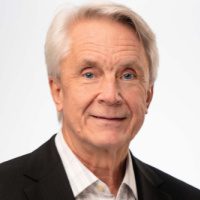
Erik Bush has led the growth of Demand Driven Technologies since its formation in the fall of 2011. Under his leadership the company has experienced exceptional growth and now supports clients on 6 continents around the world. He has led the development of a global network of channel partners who represent DD Tech solutions in their respective markets while overseeing the migration of our solutions to a predominantly cloud-based offering. Erik retired from IBM in 2010 after 31 years of experience with the company, the majority of which was in executive and management positions. He was the executive responsible for the rapid growth and expansion of IBM’s Network of GBS Global Delivery Centers. Erik also served as the Vice President of Operations for IBM’s Global Business Services units in Europe and the Americas. Erik has extensive experience working with clients in the production and distribution industries. He leads through a deep commitment to delivering tangible benefits to his clients through a pragmatic, results oriented approach. He holds a BS degree in Economics from Miami University of Ohio. Connect with Erik on LinkedIn.

